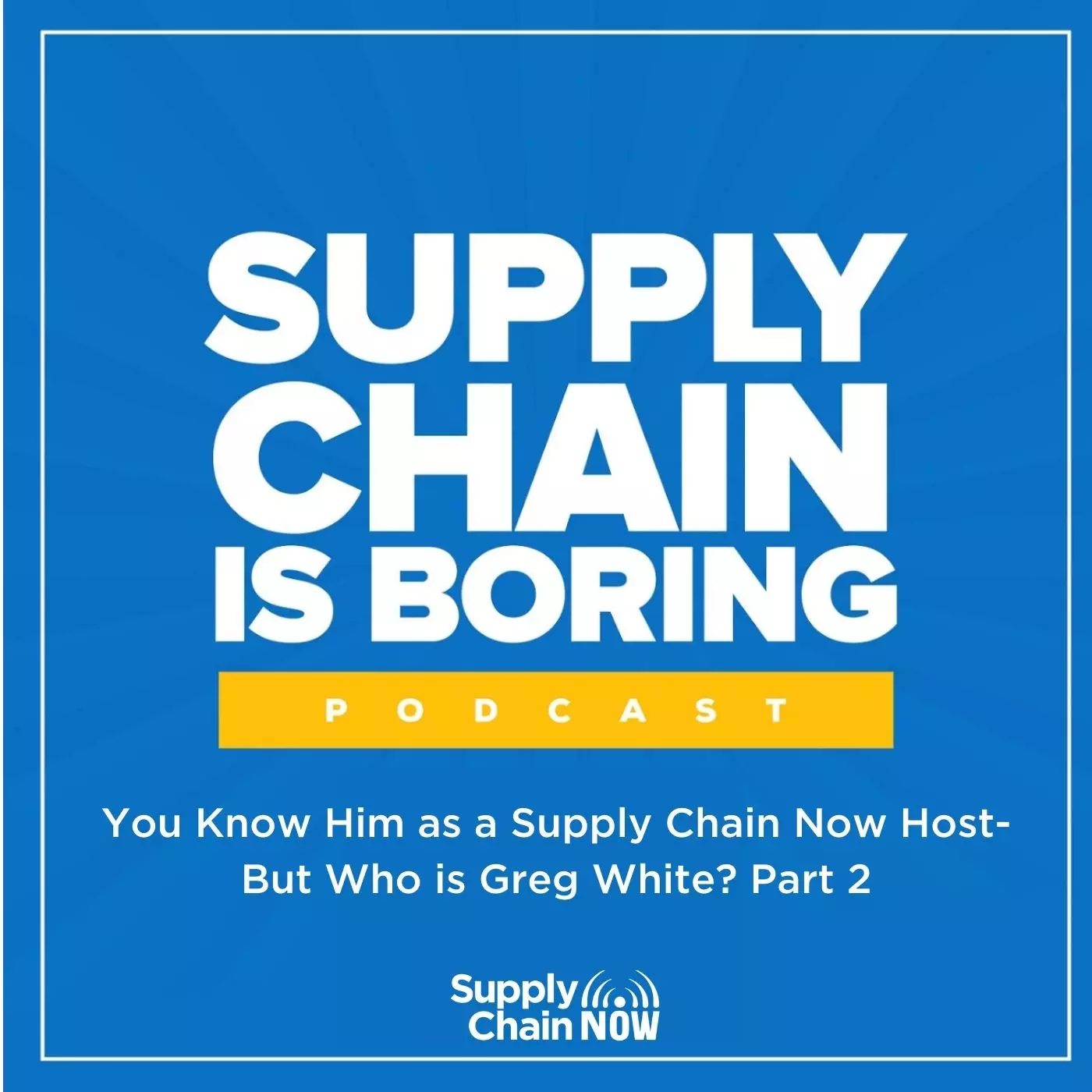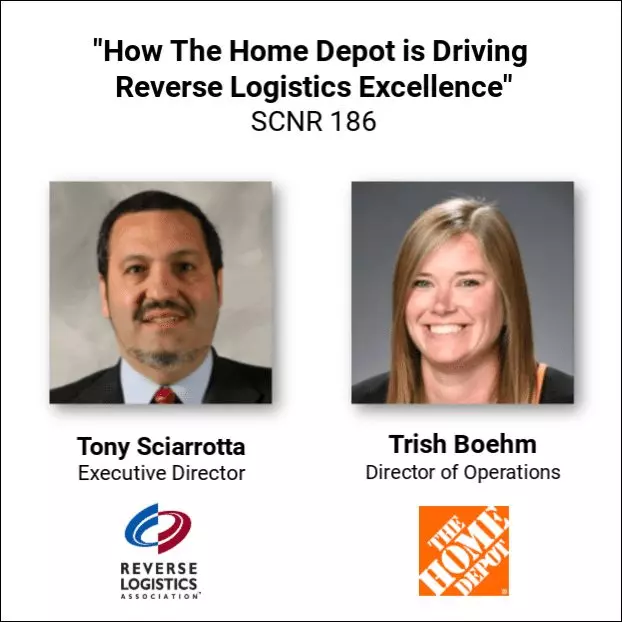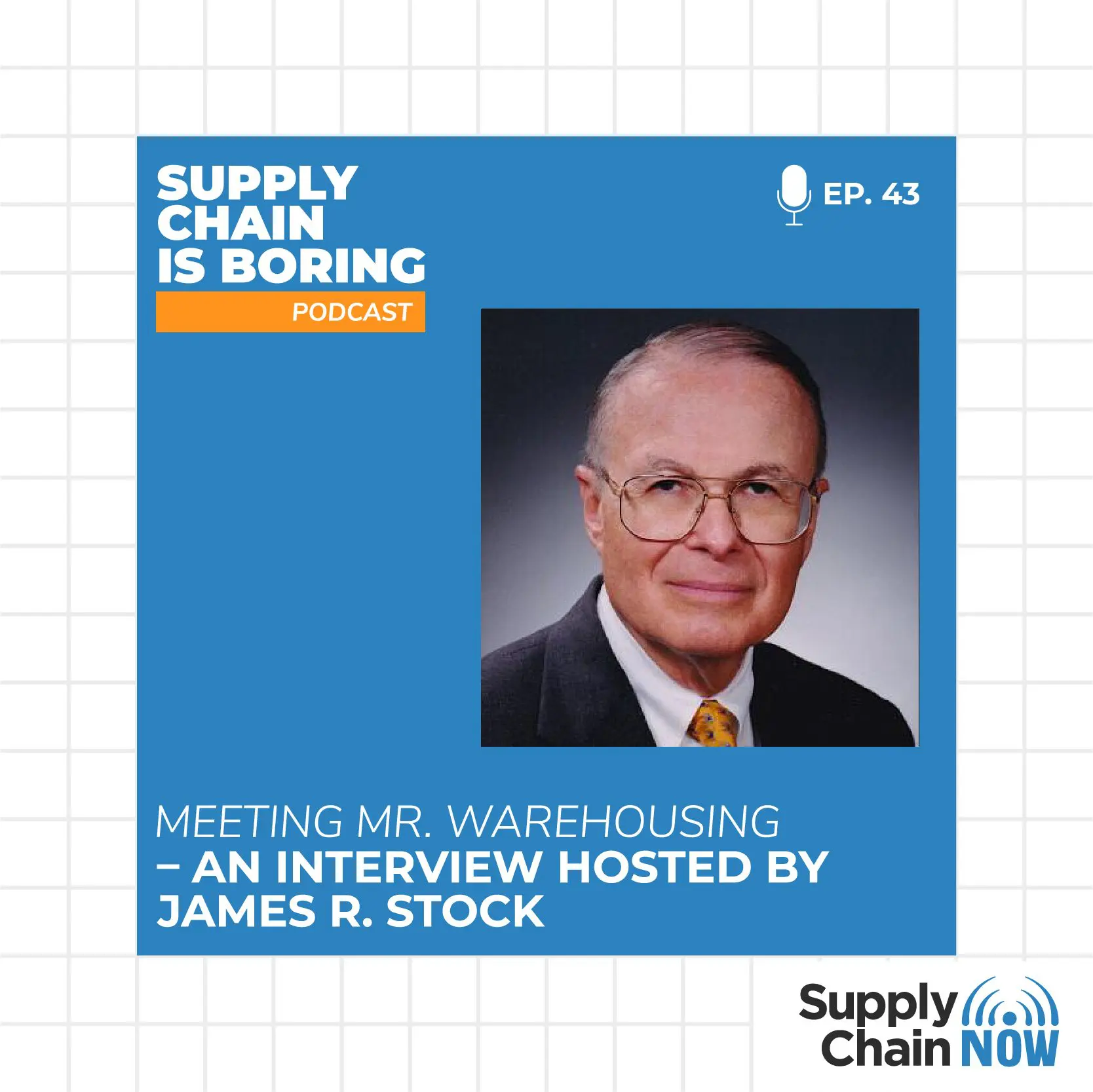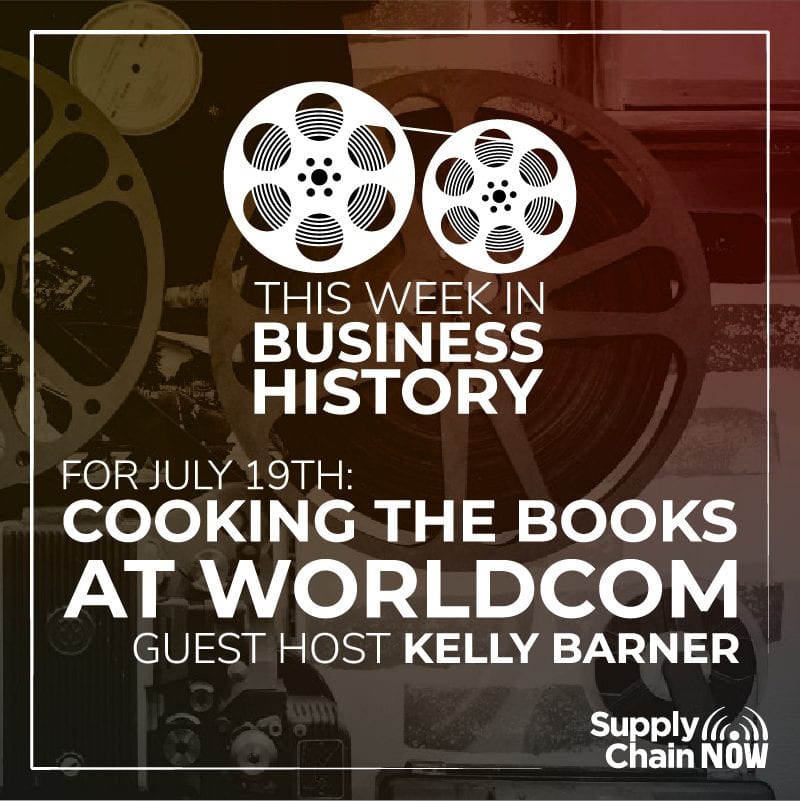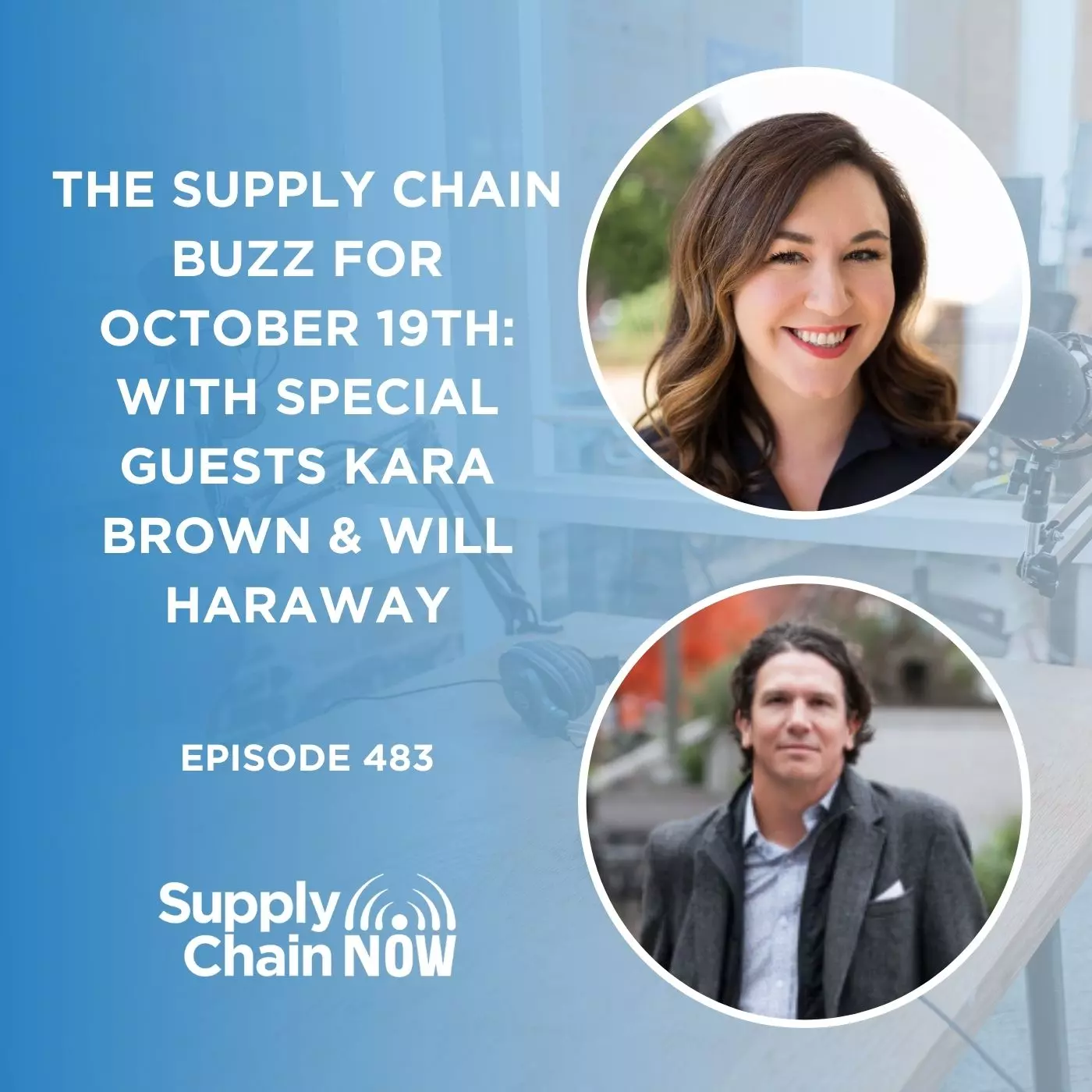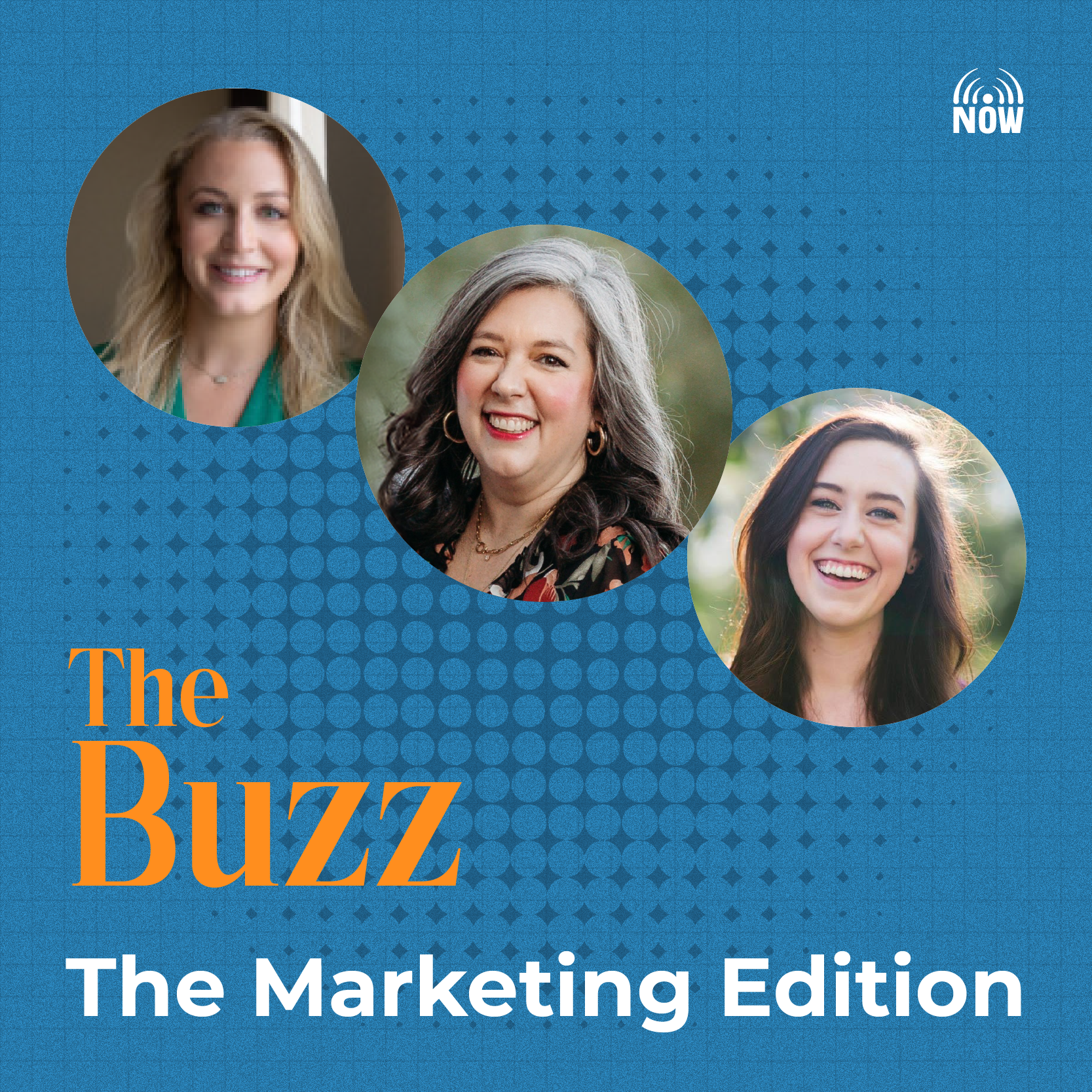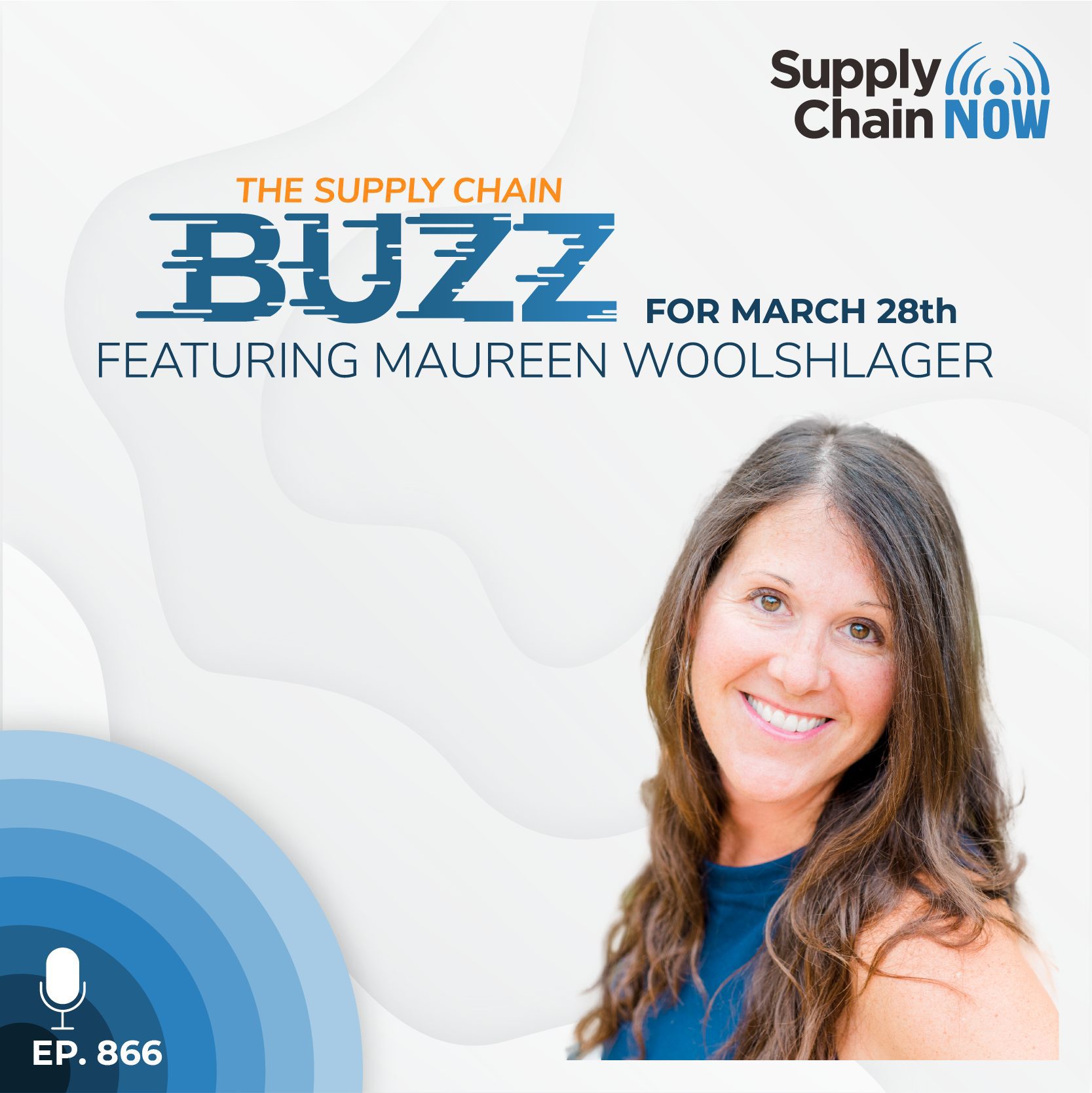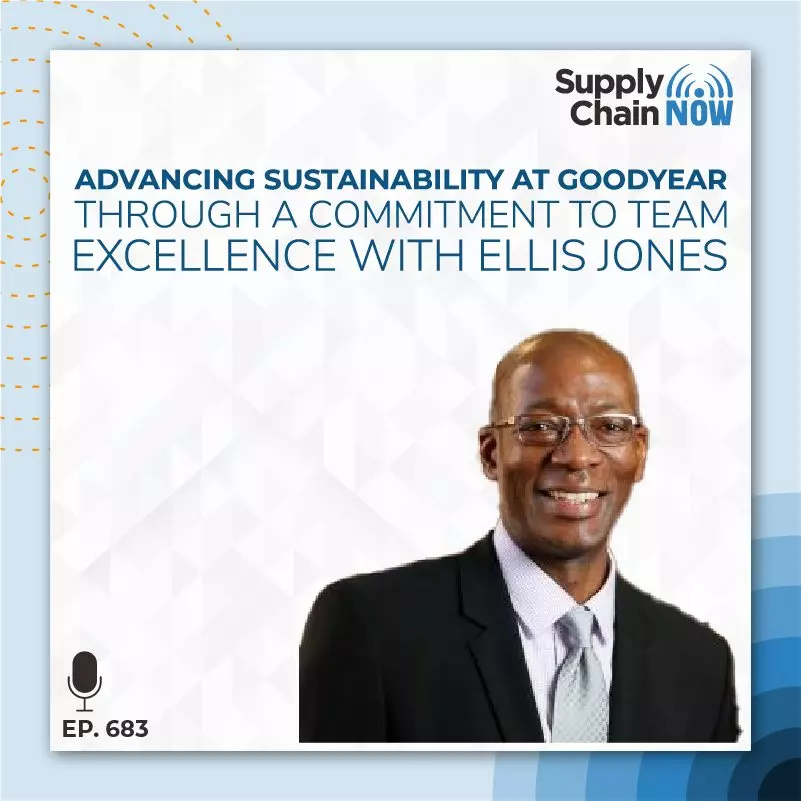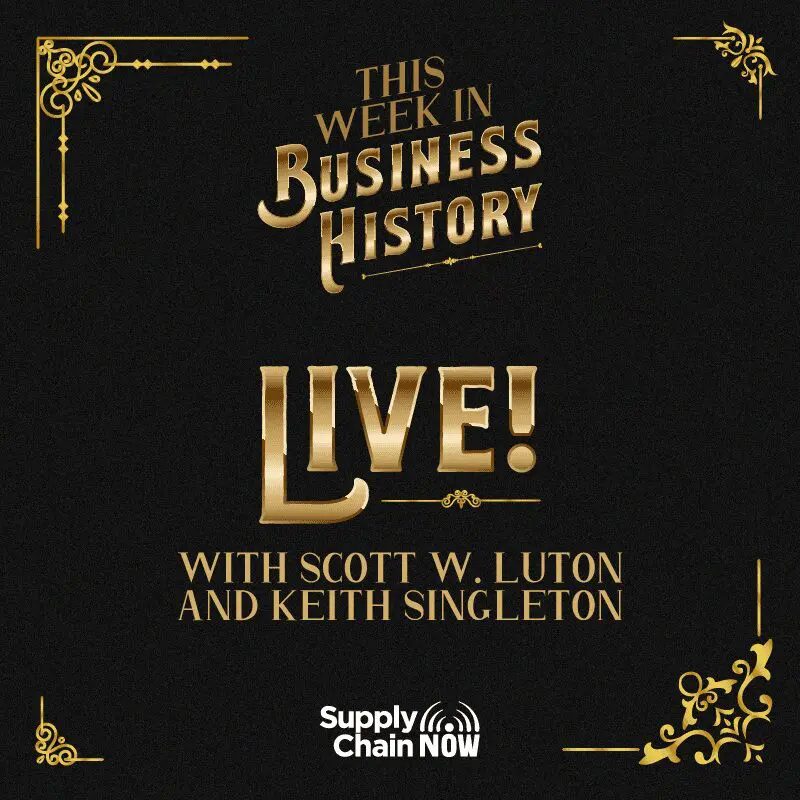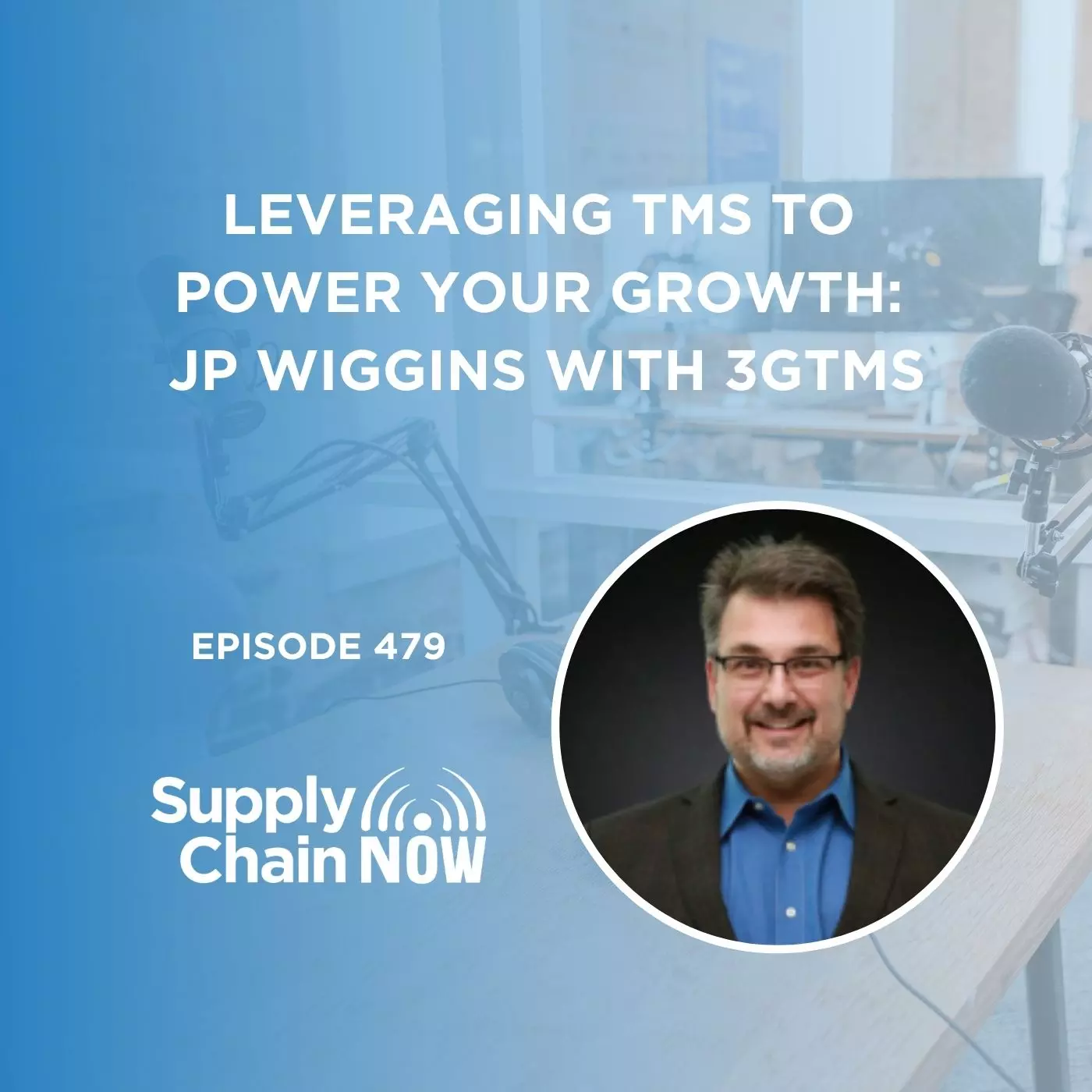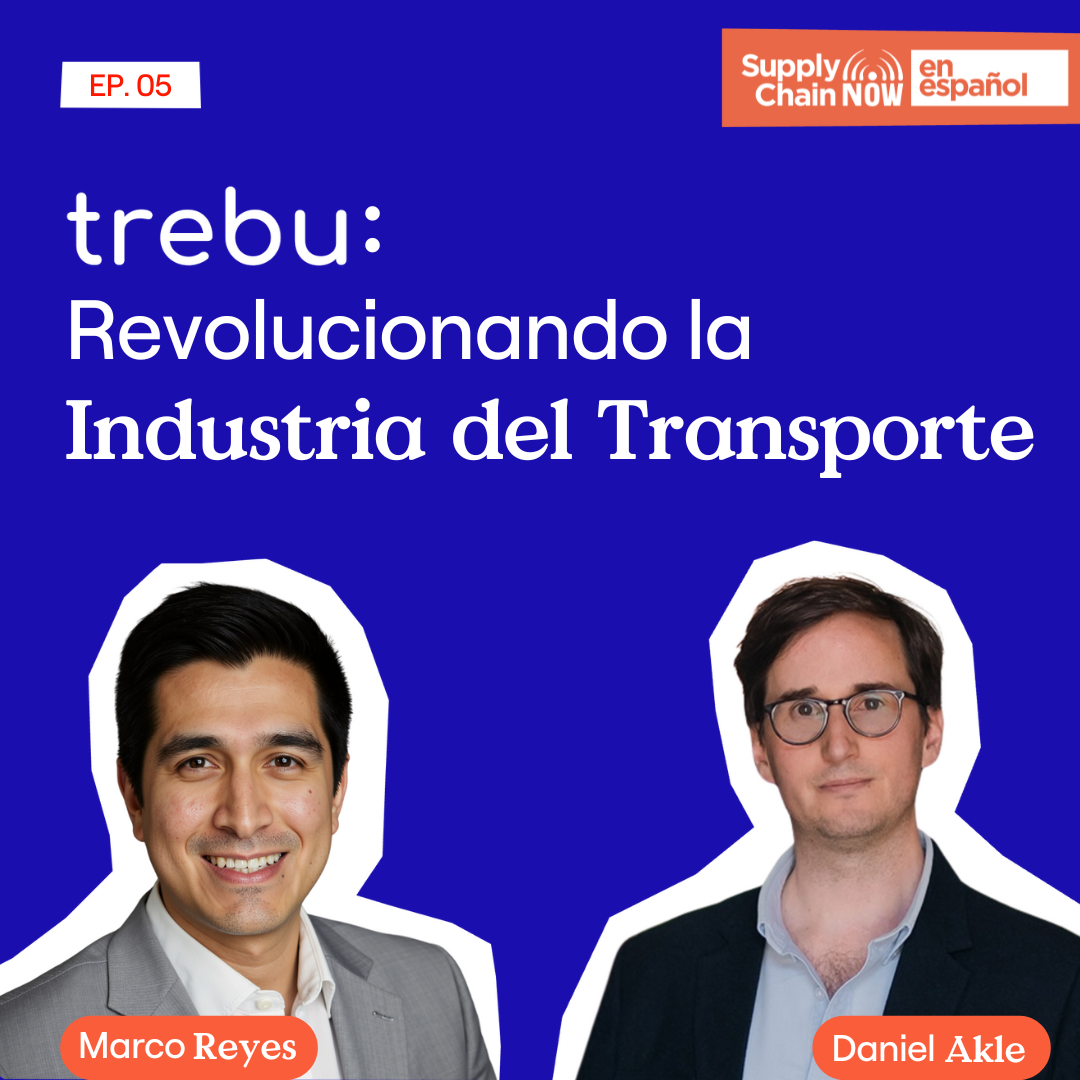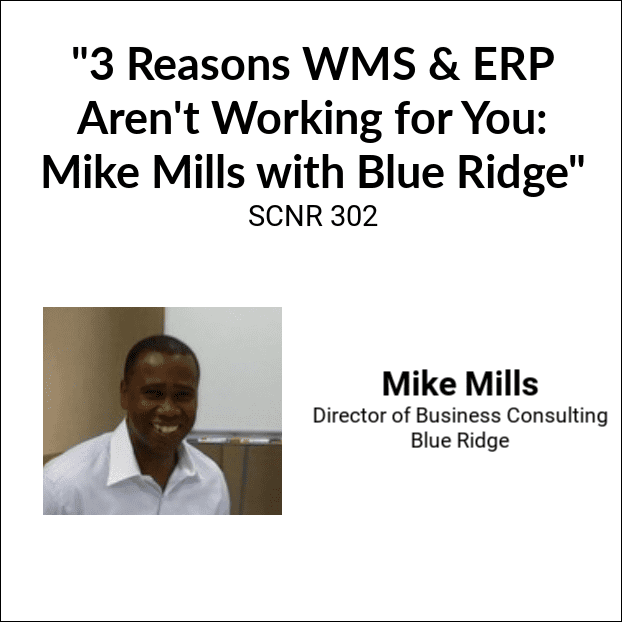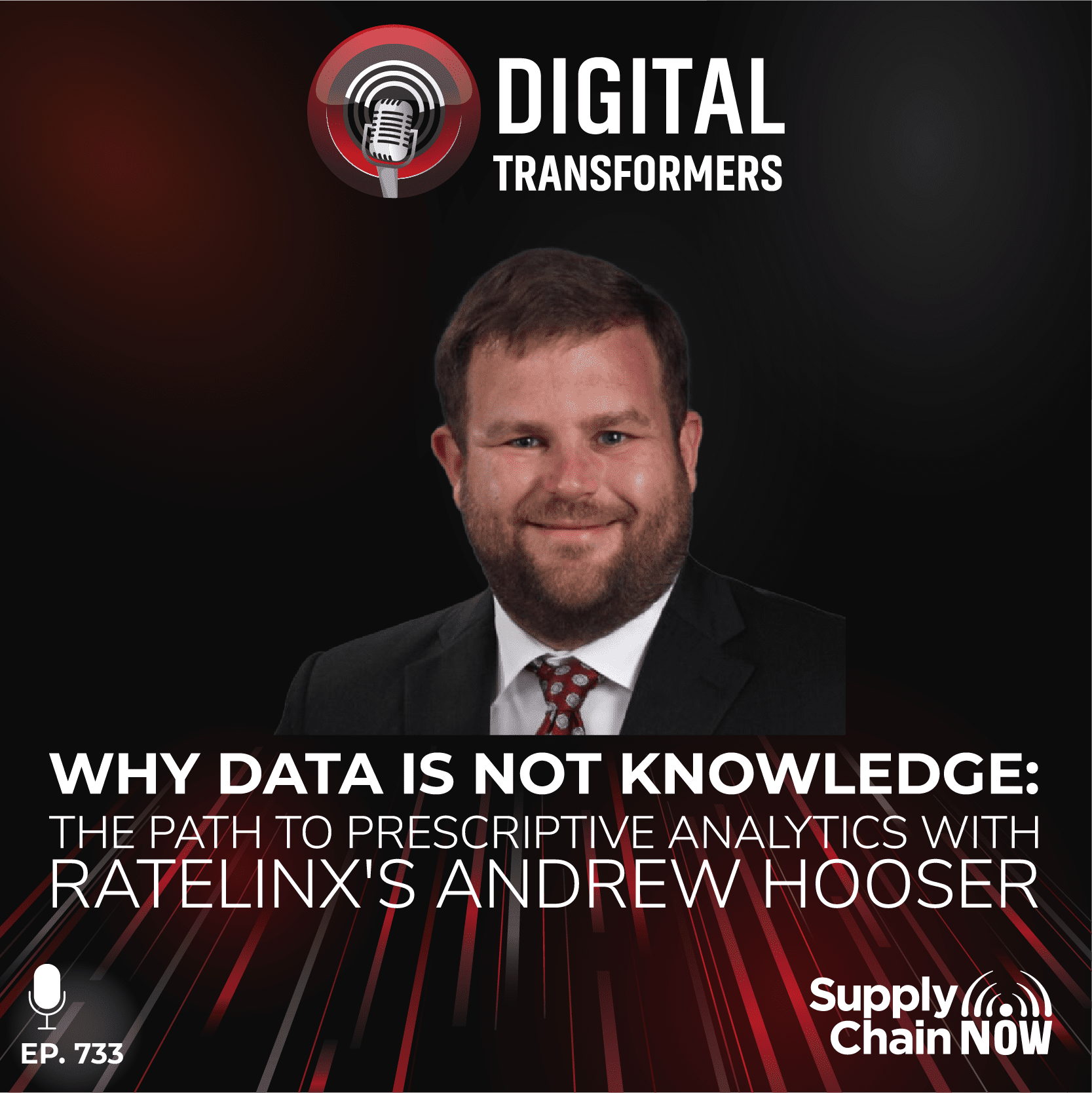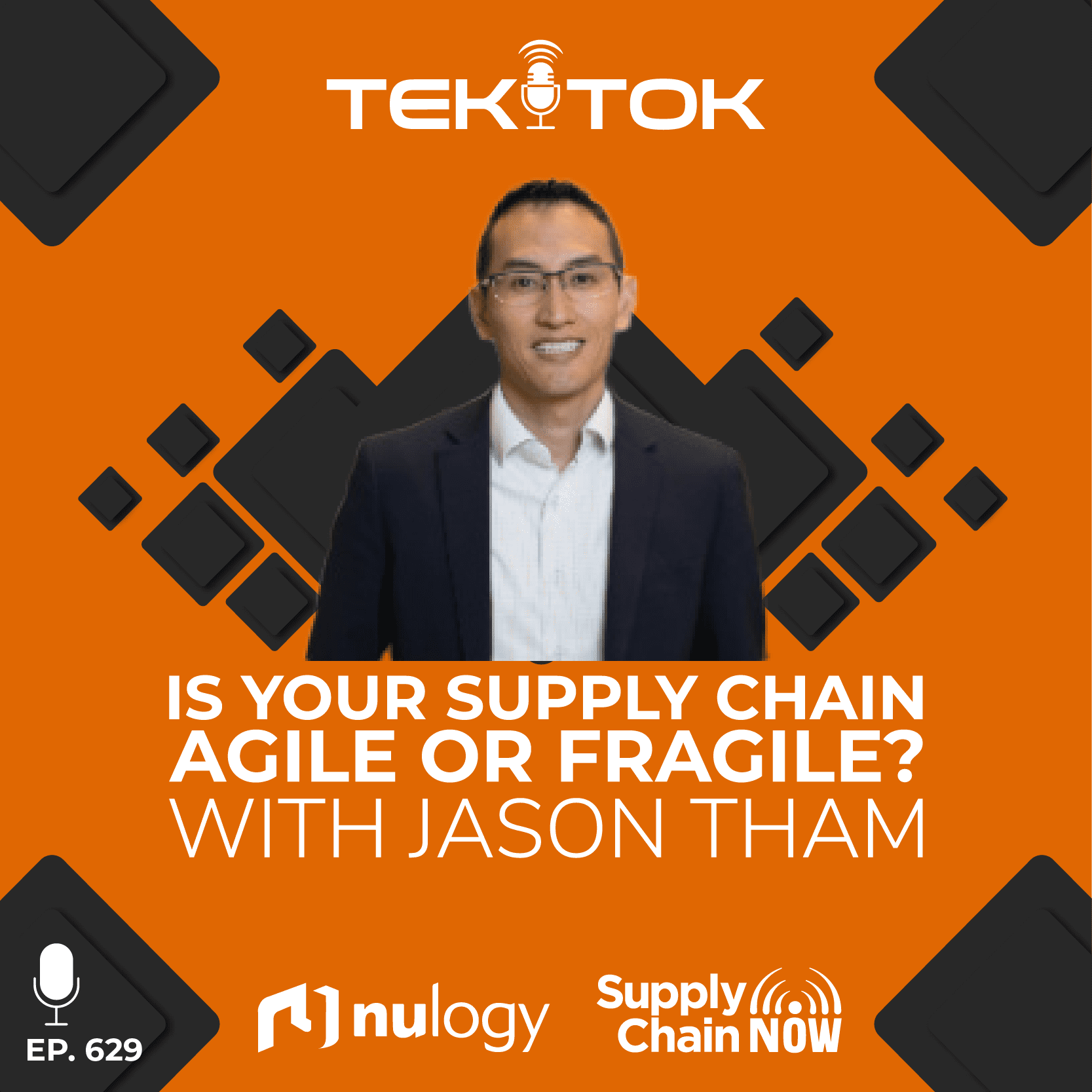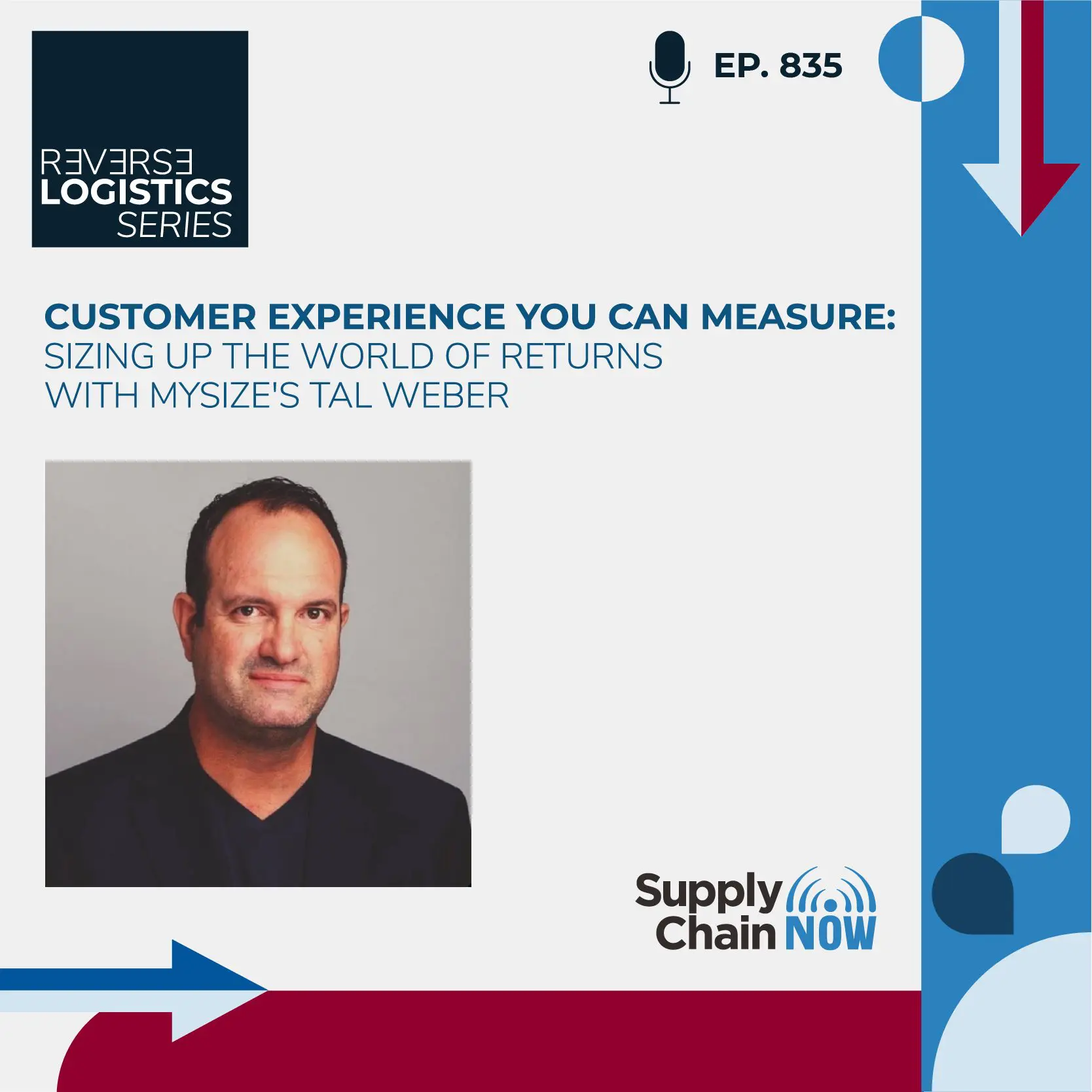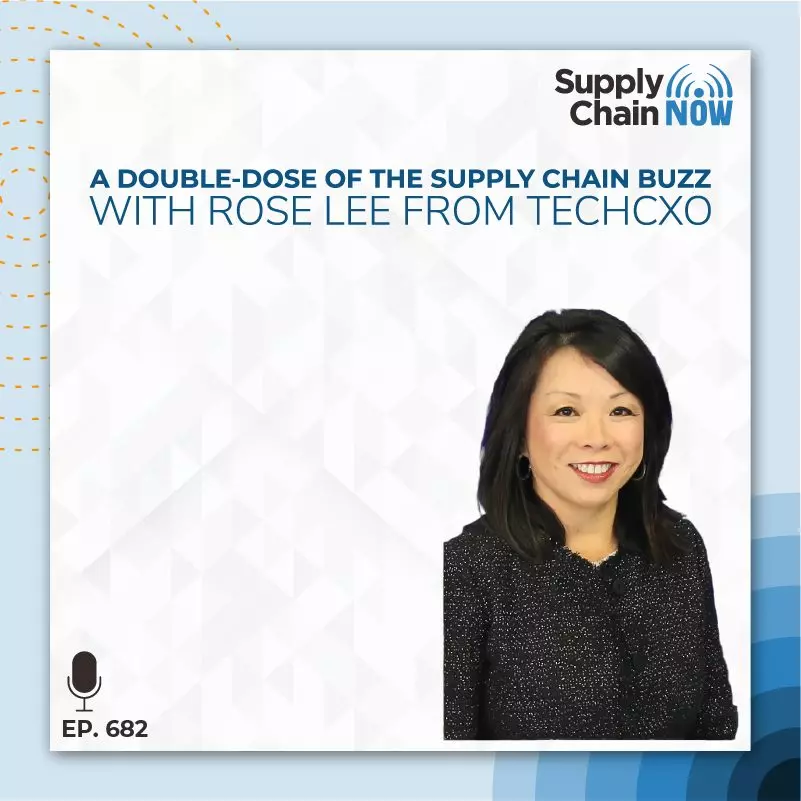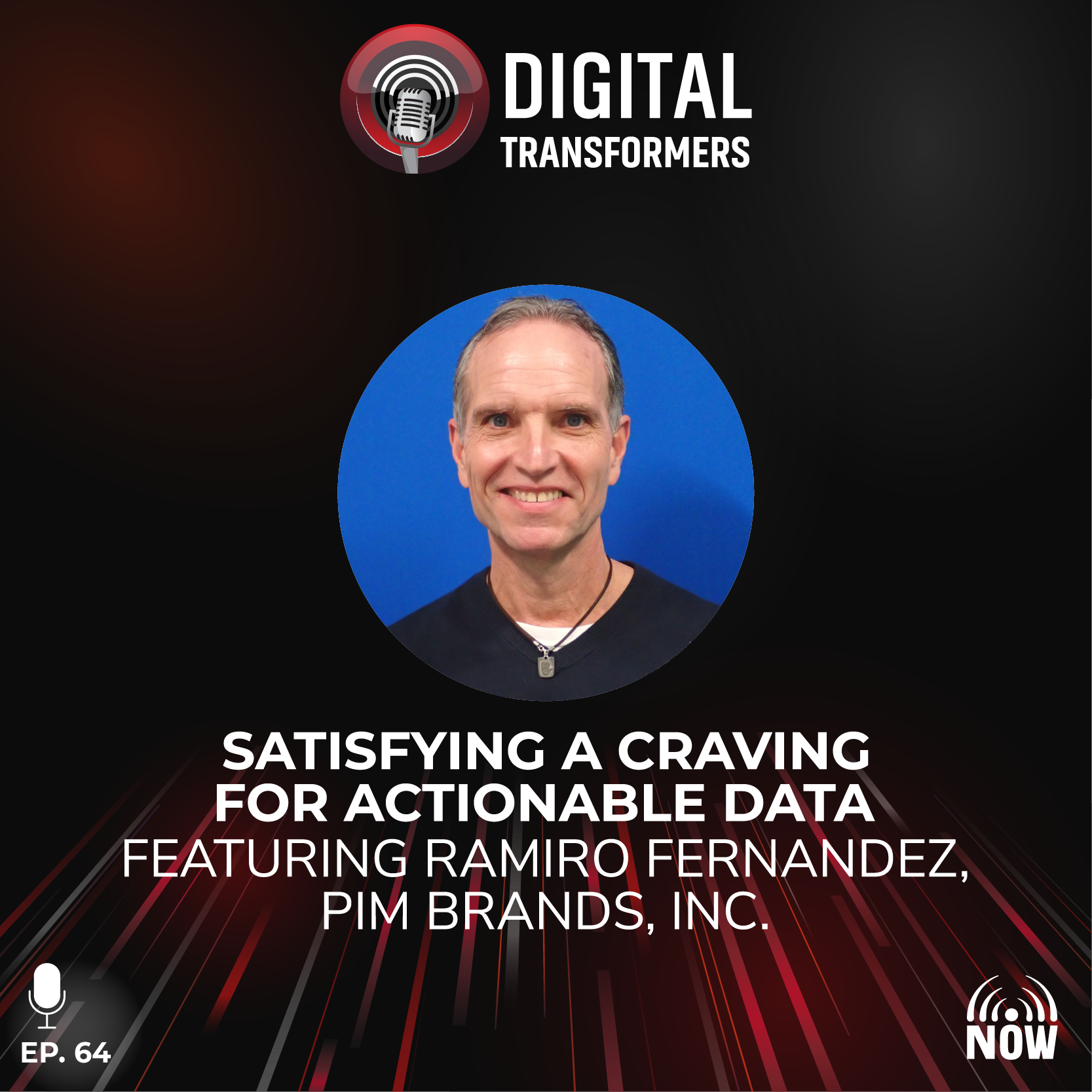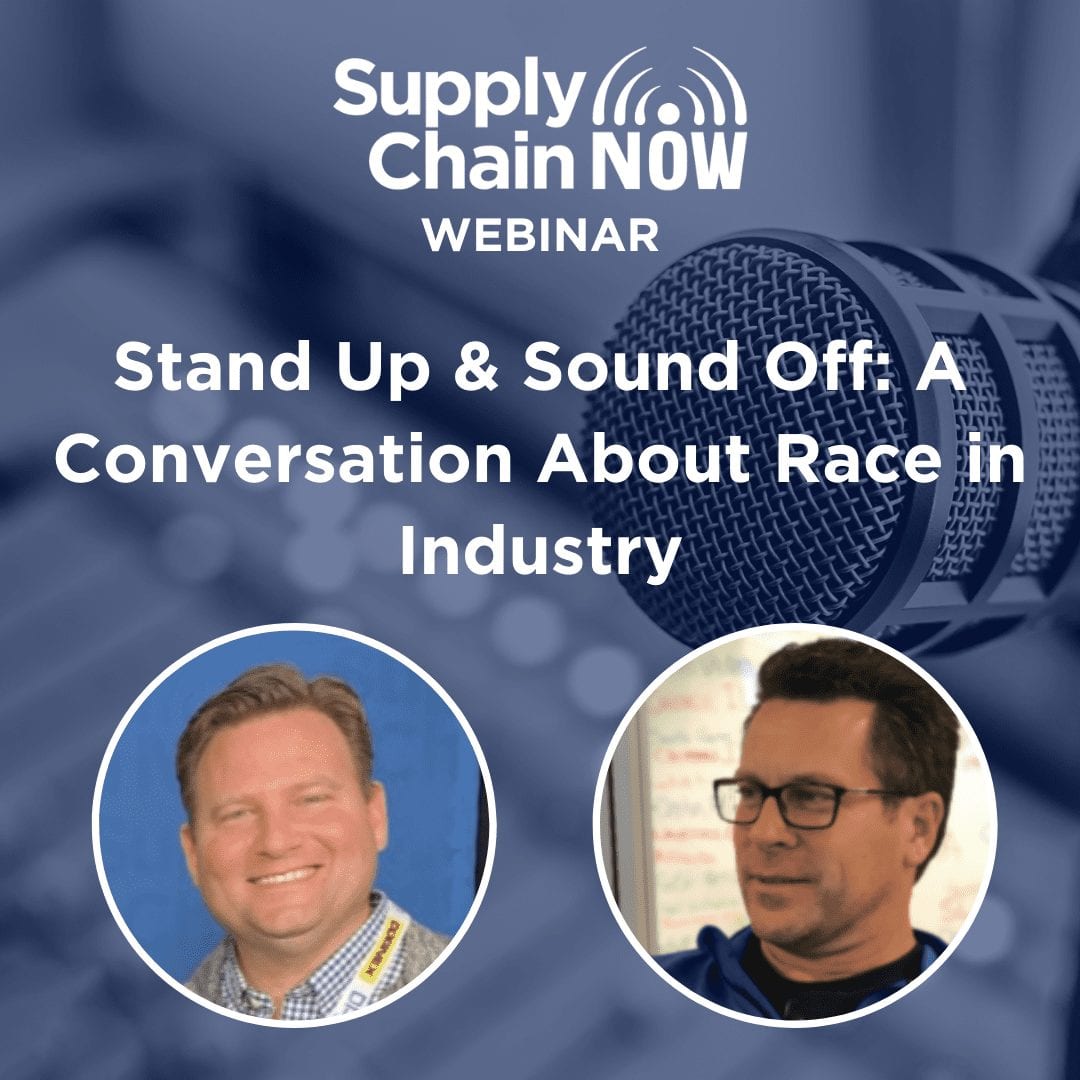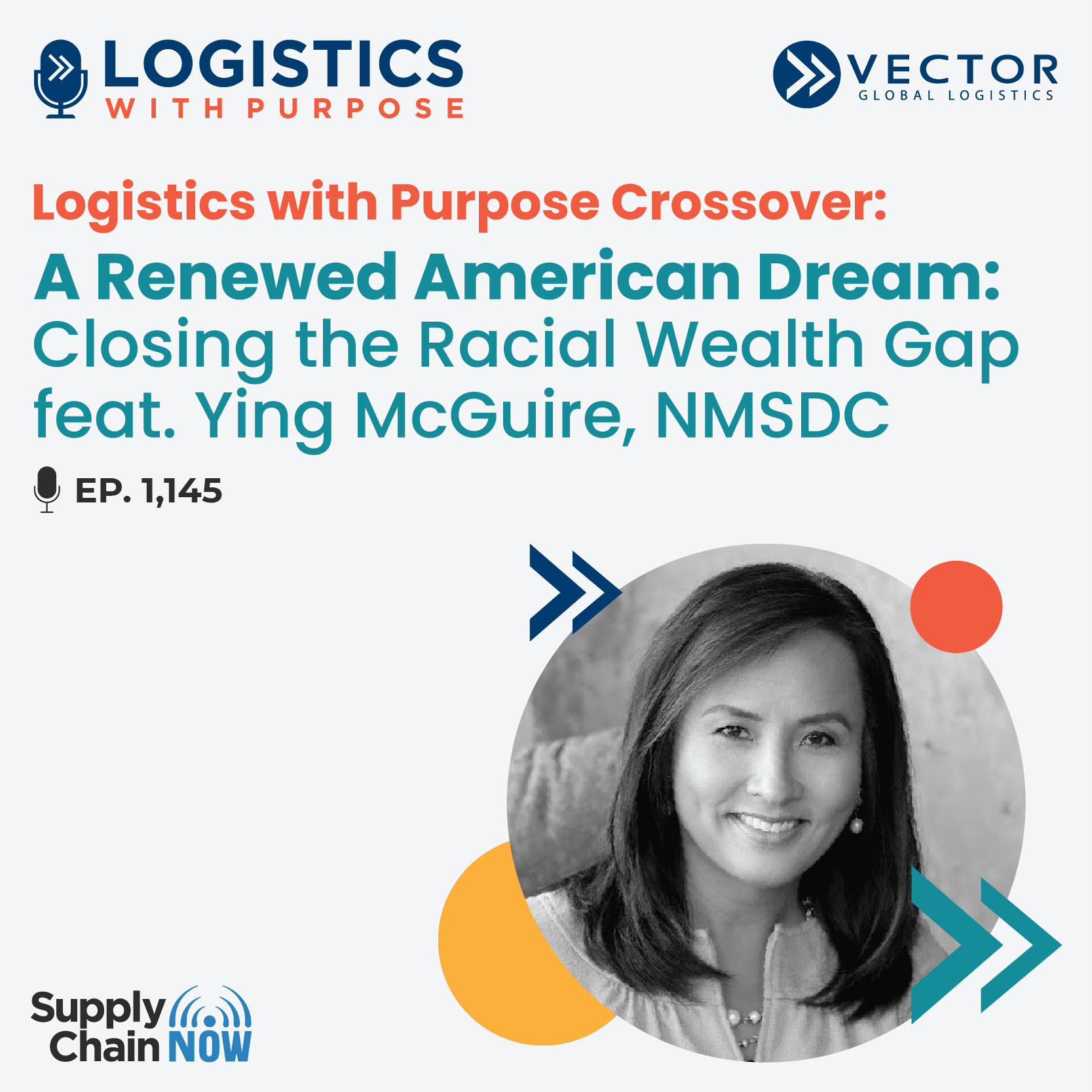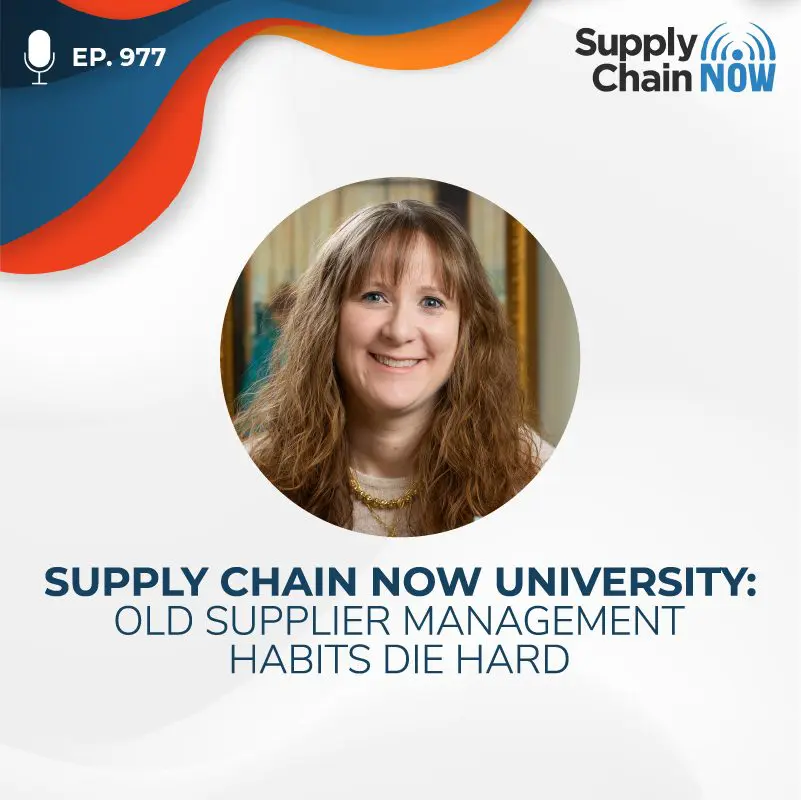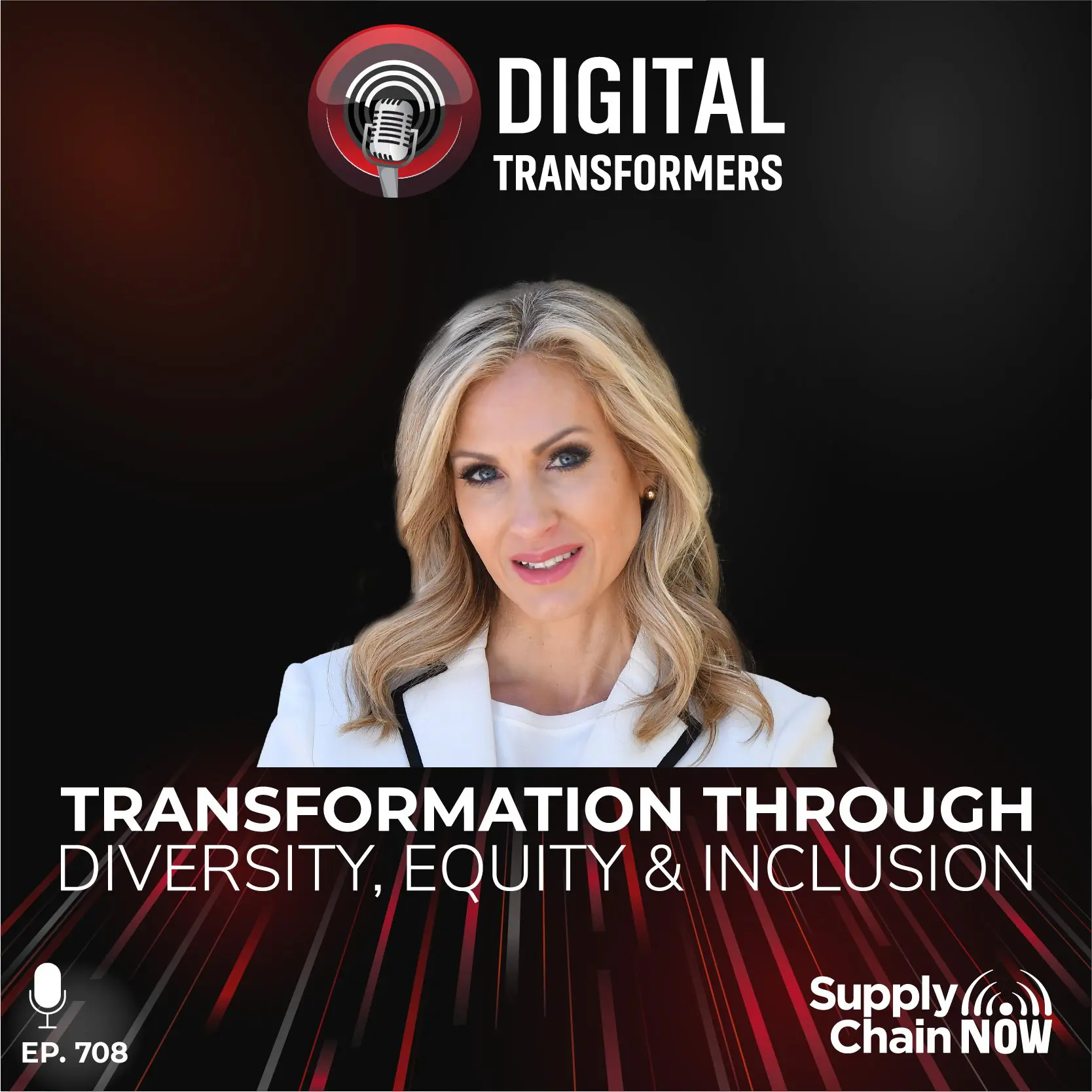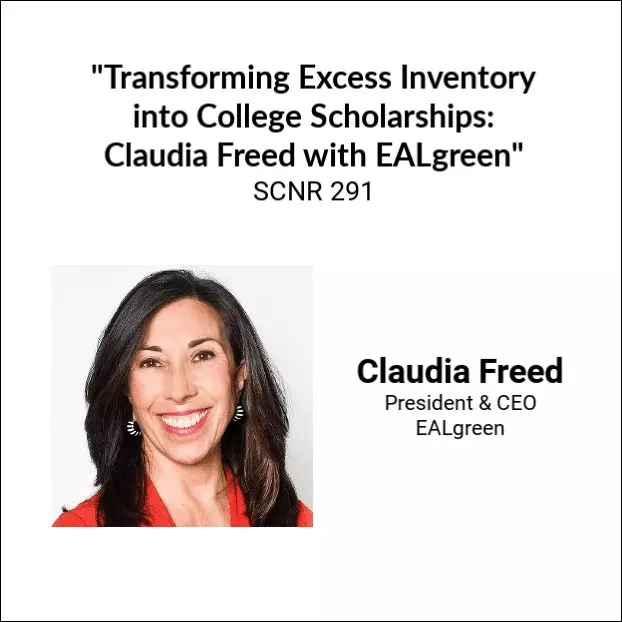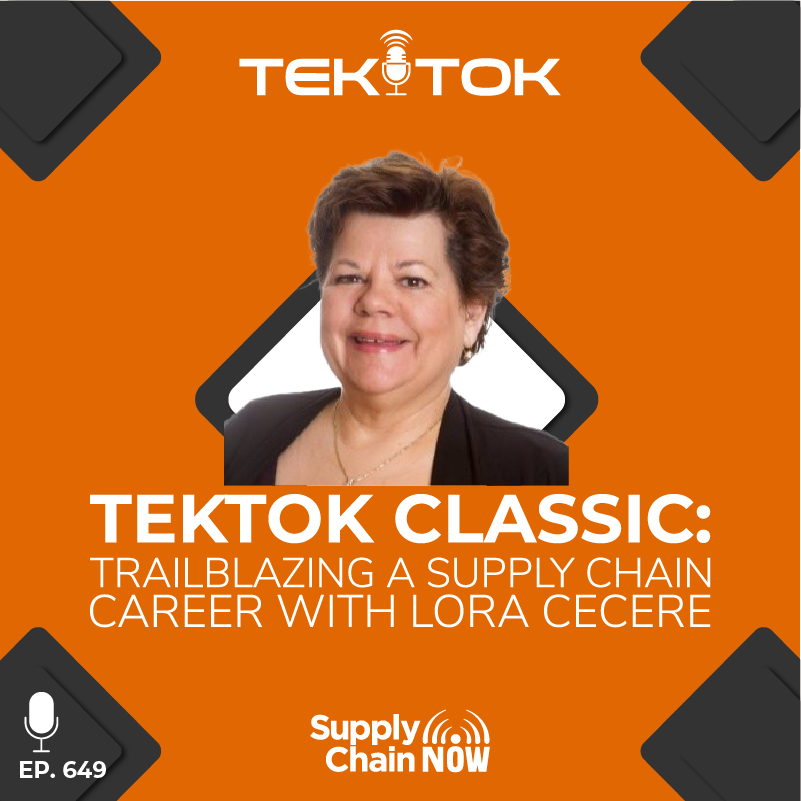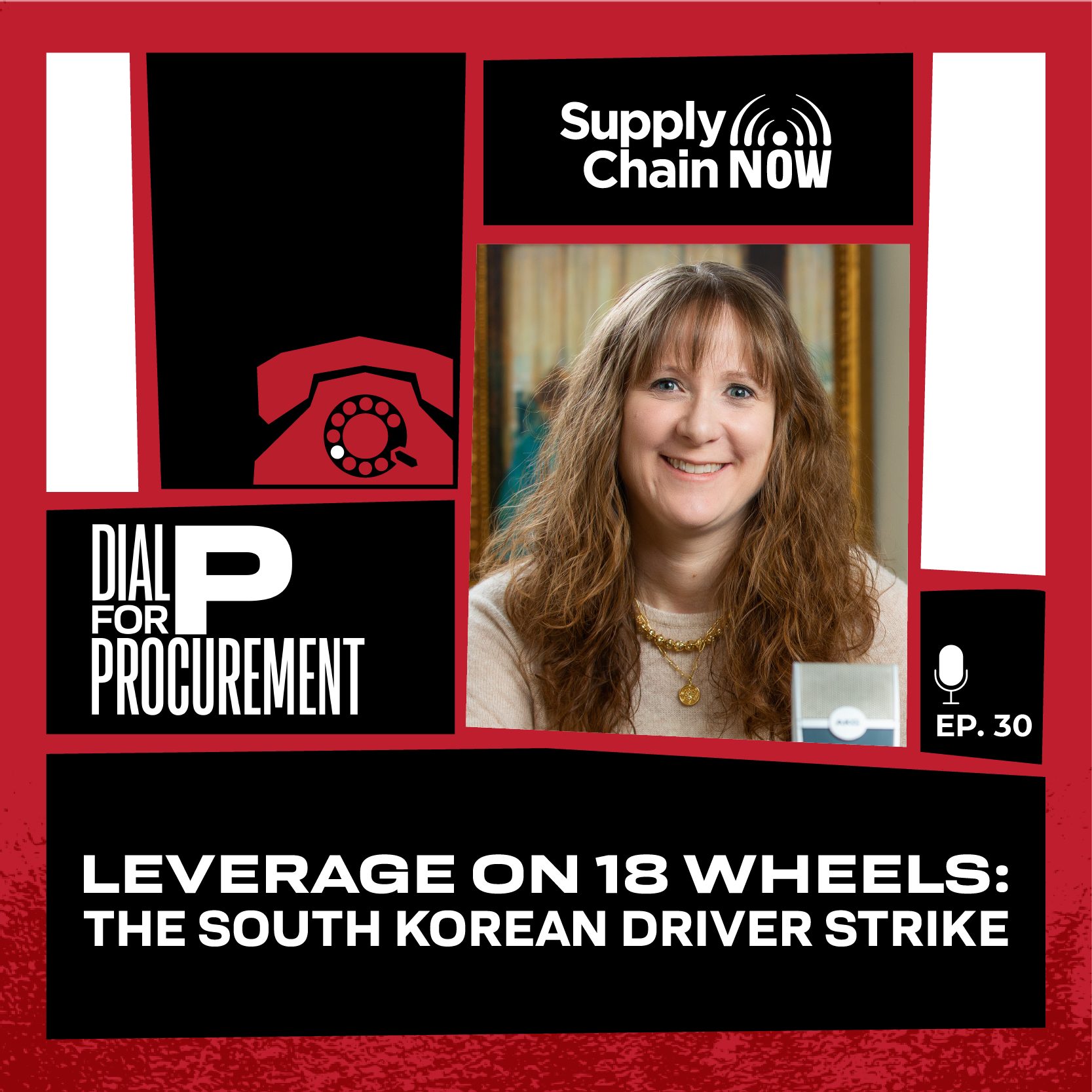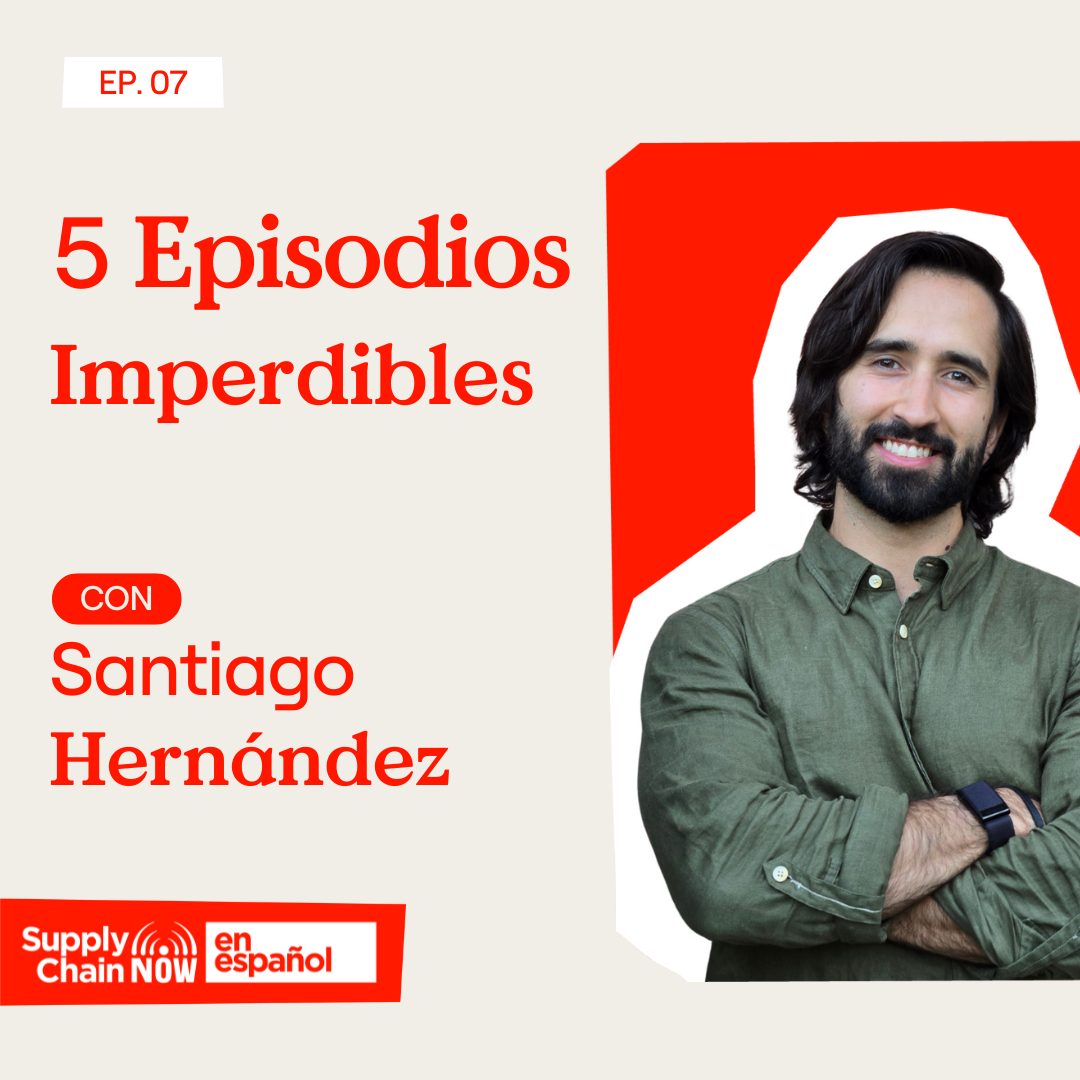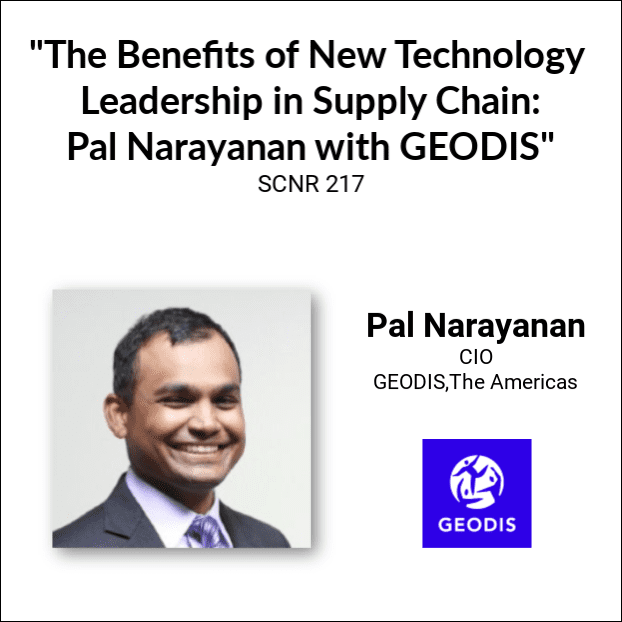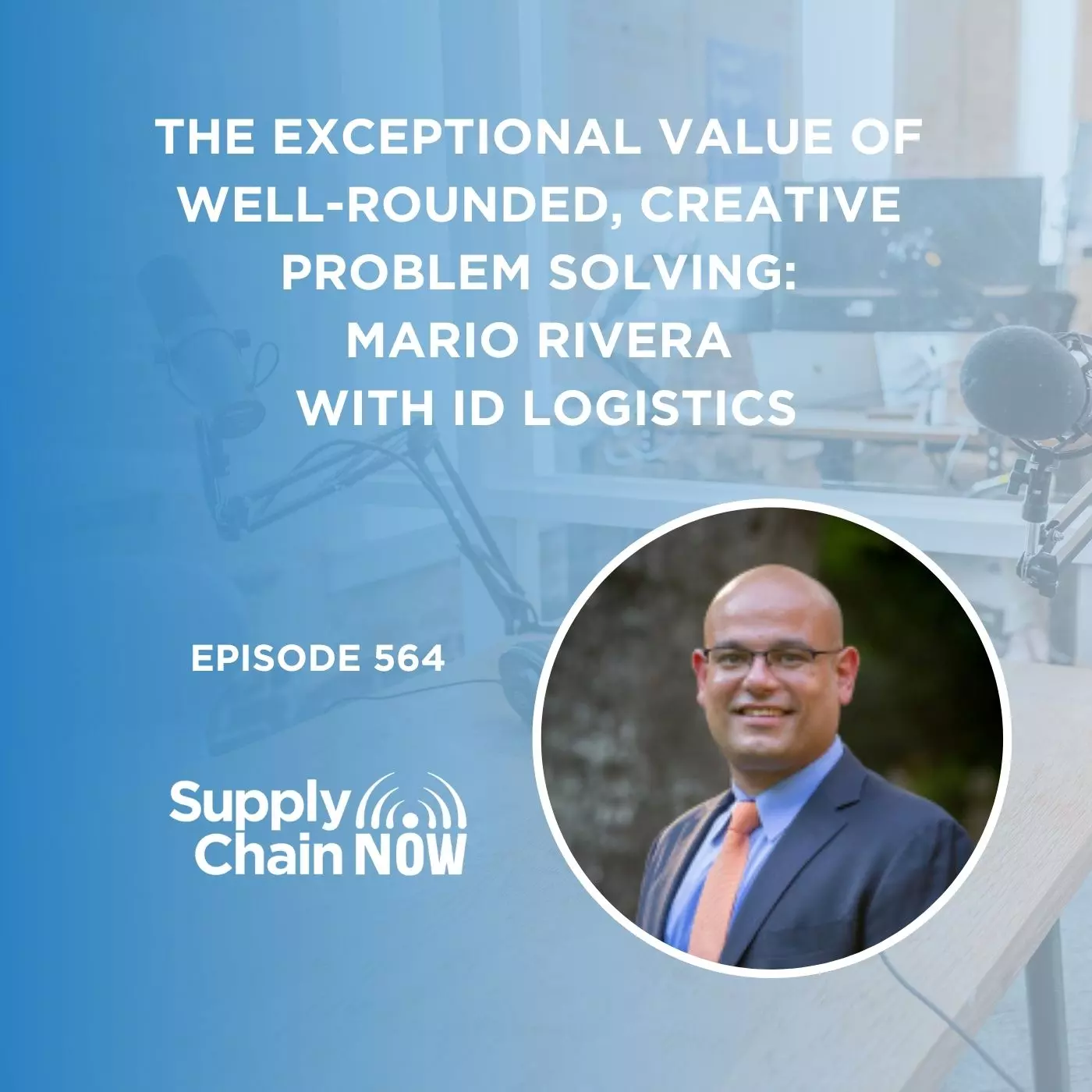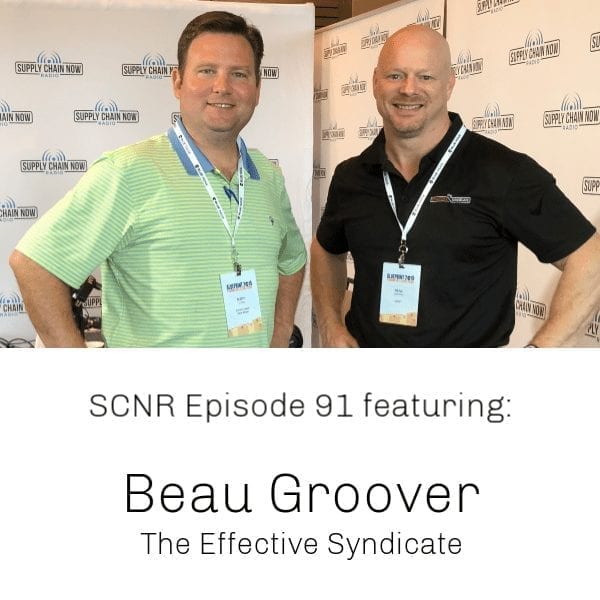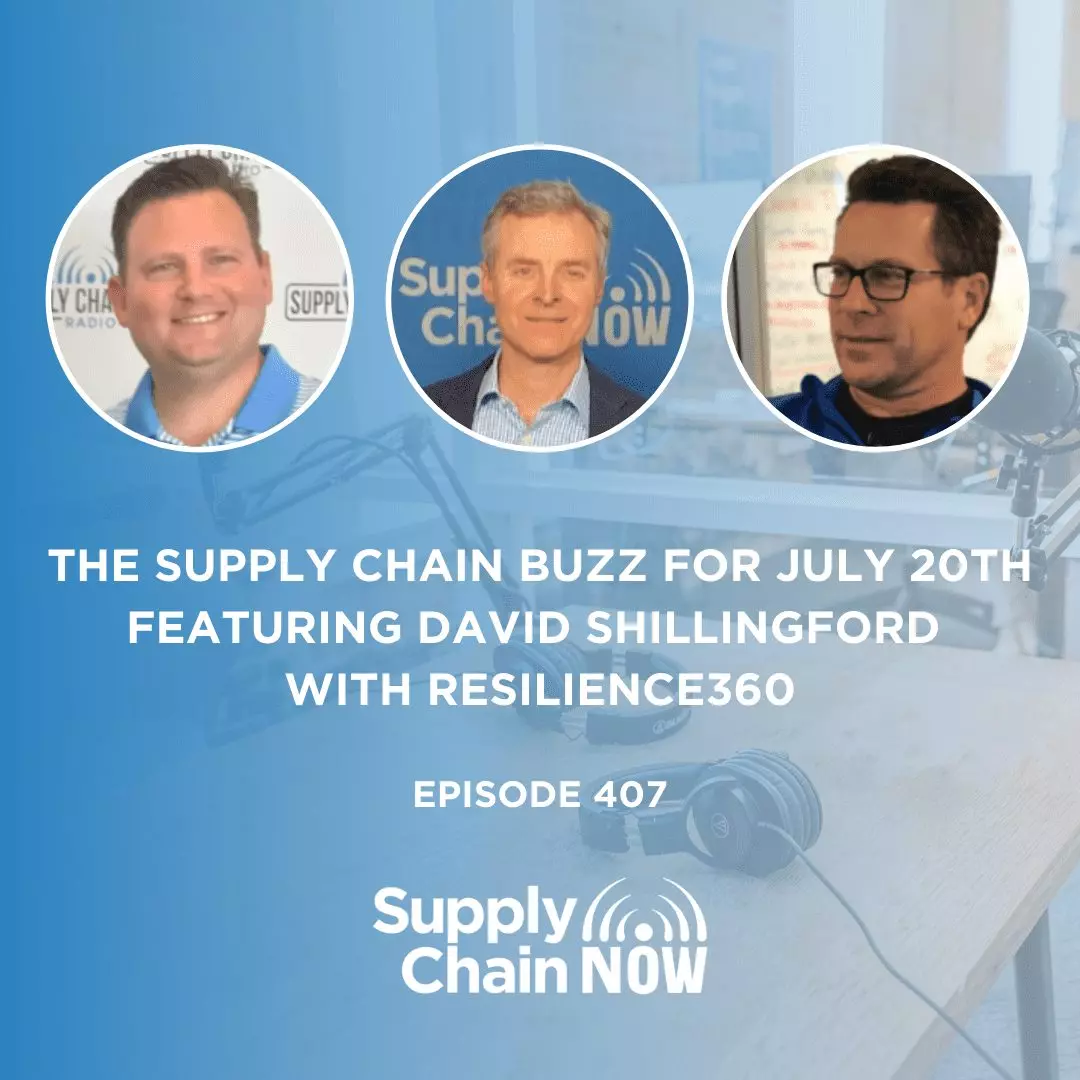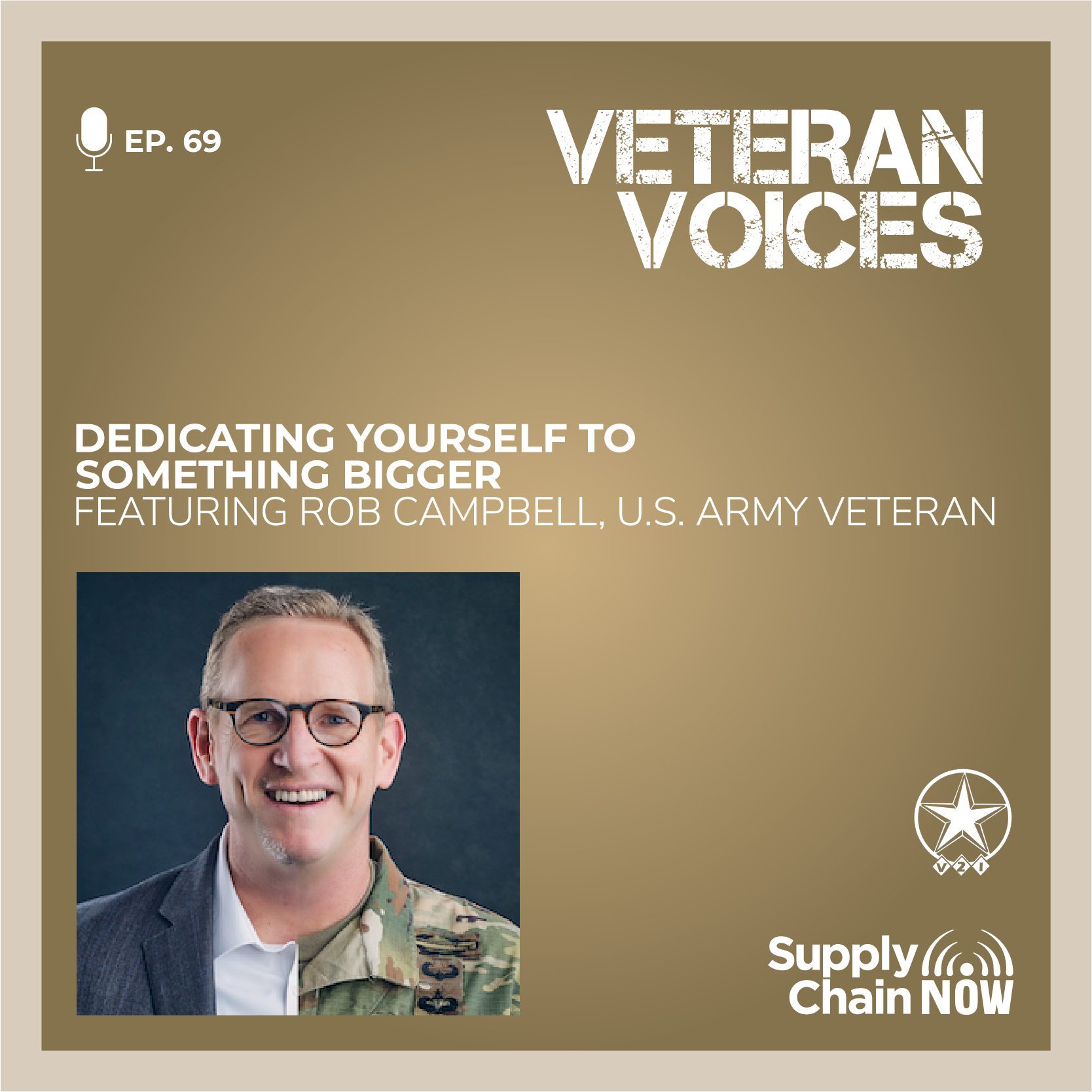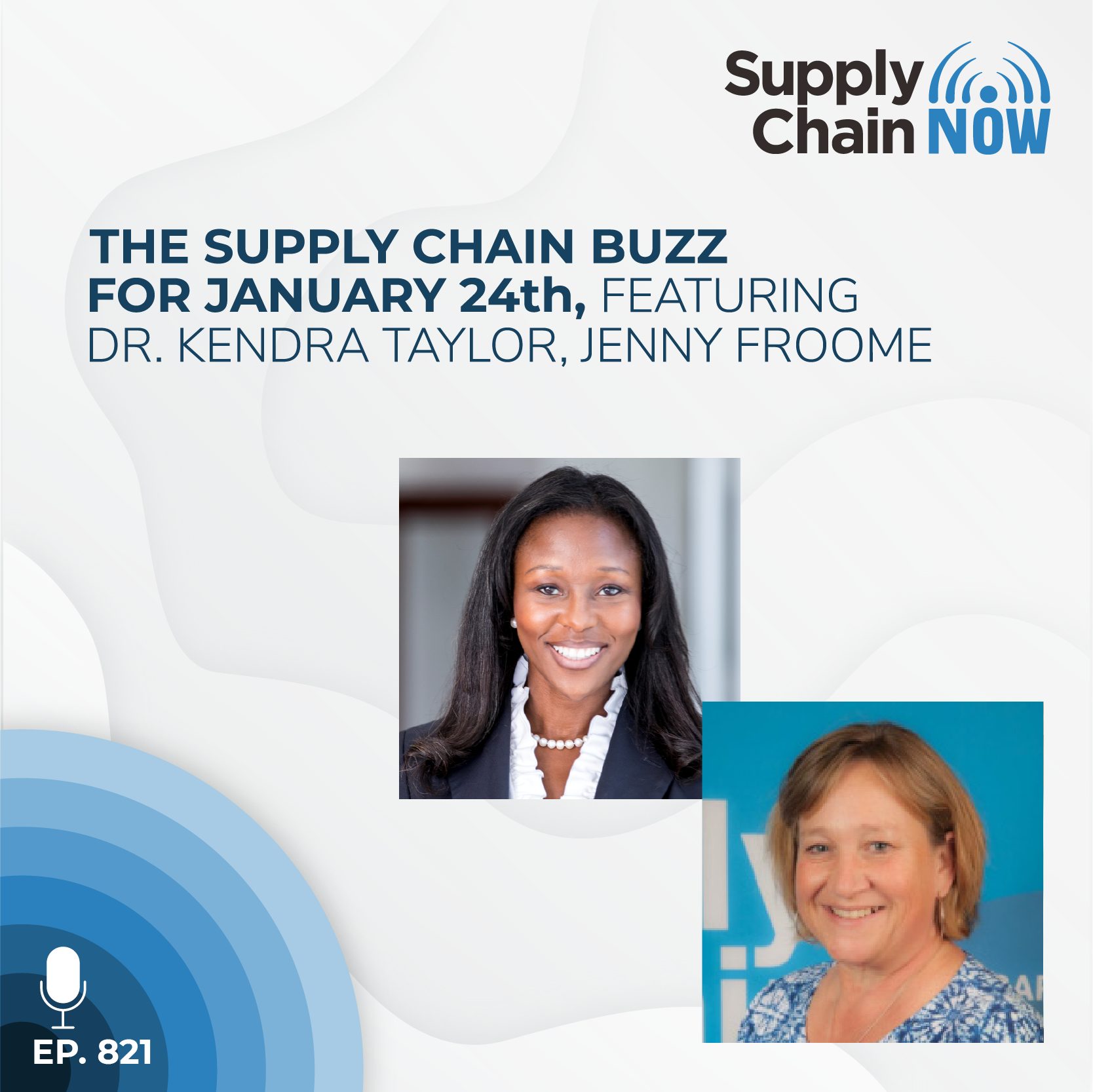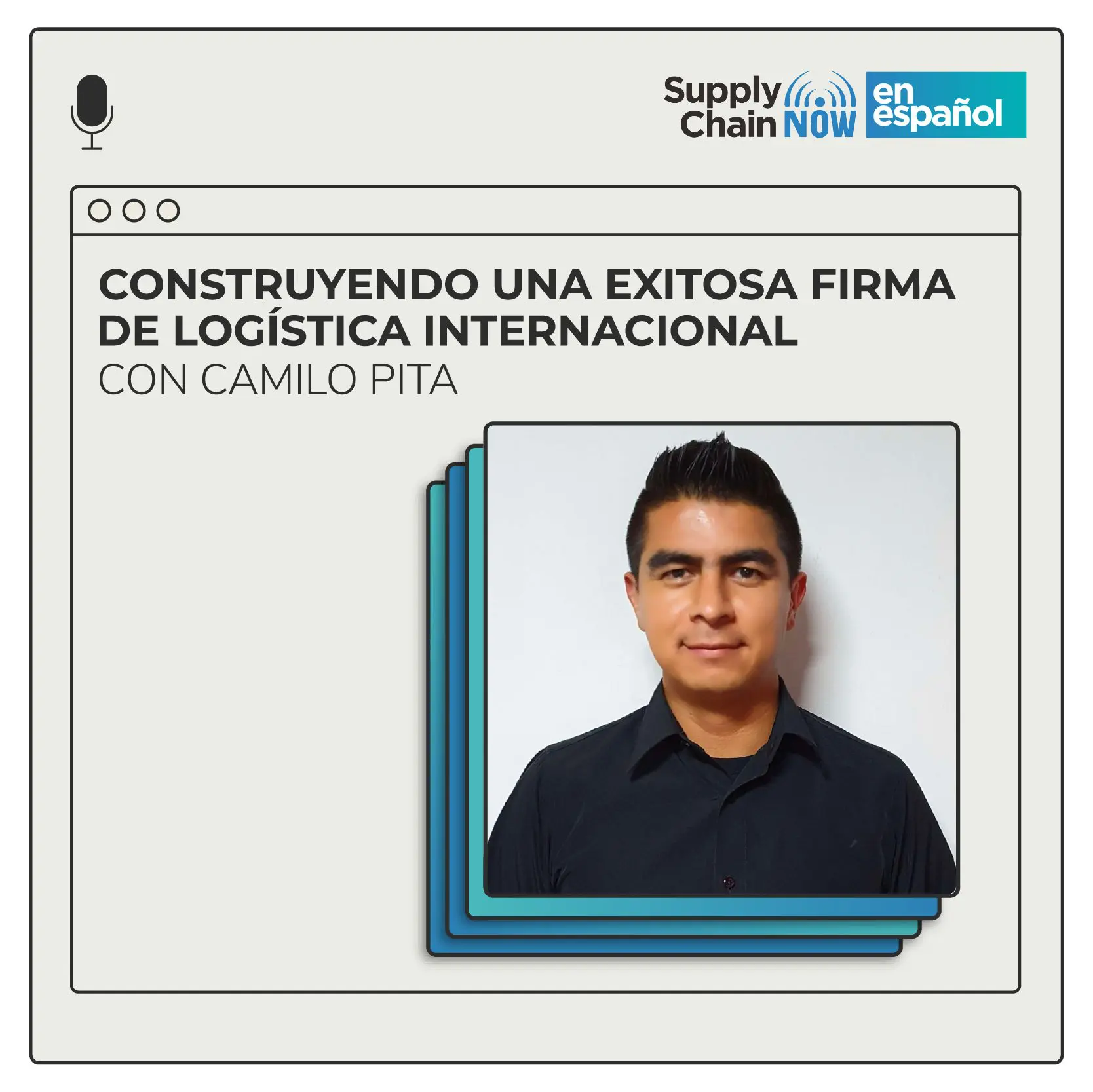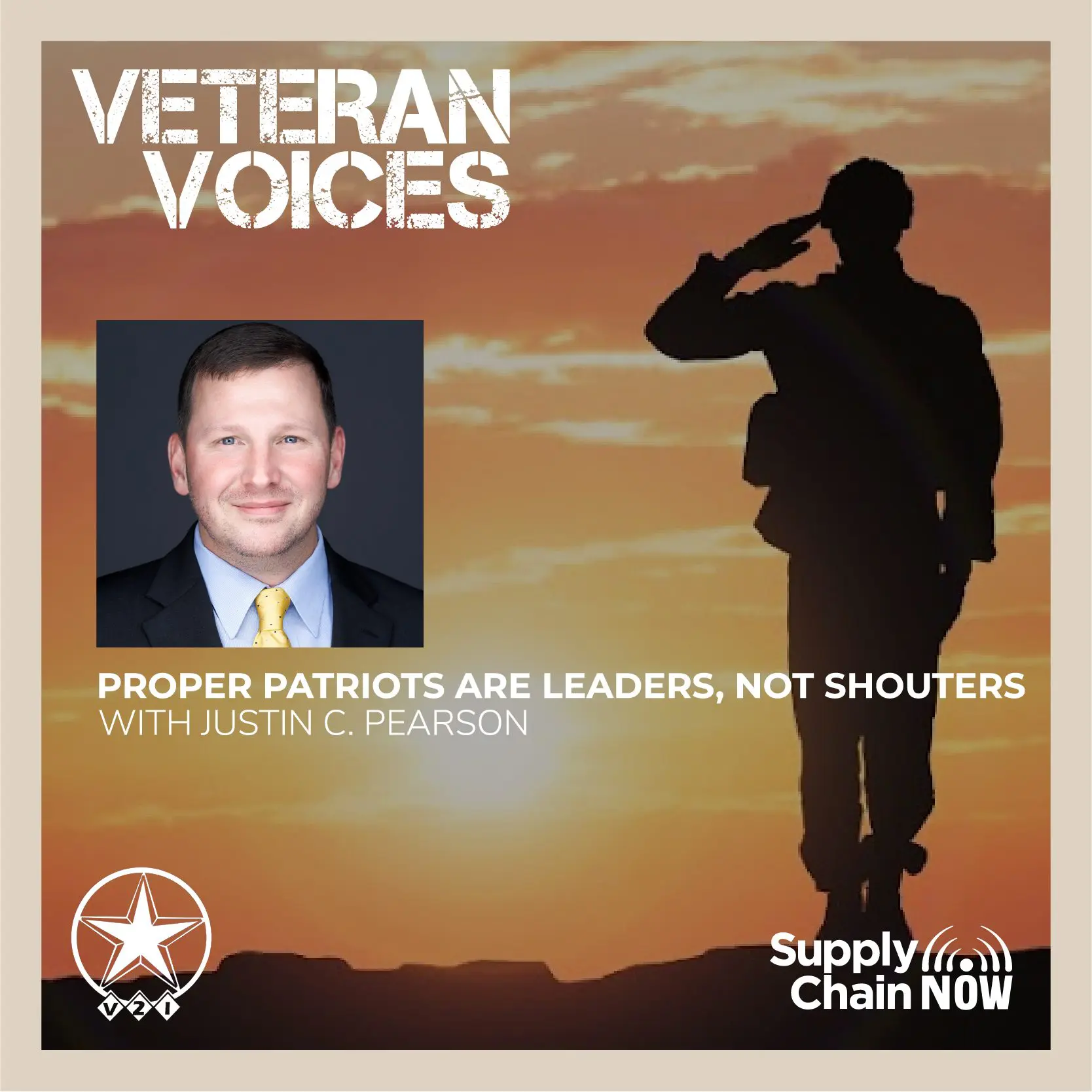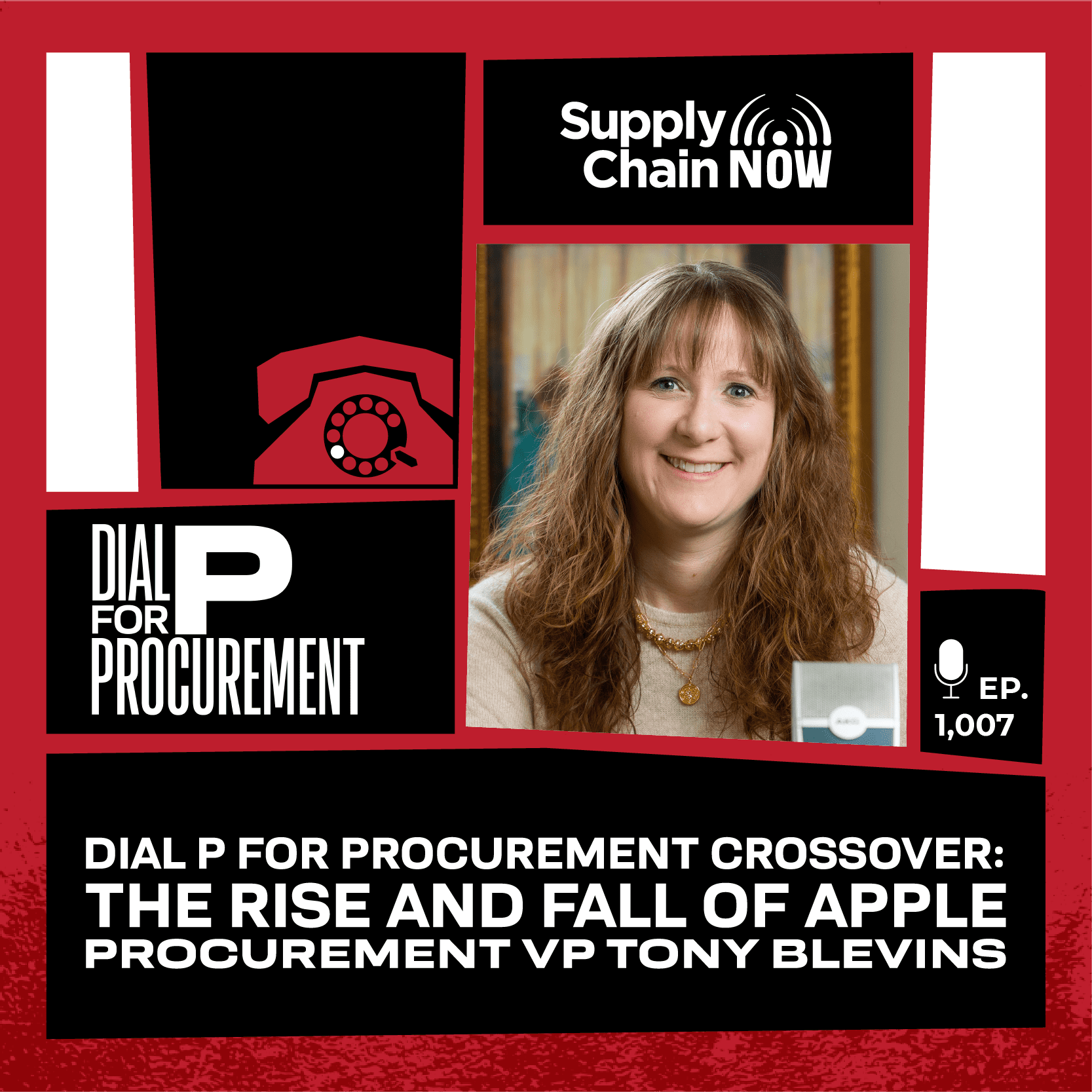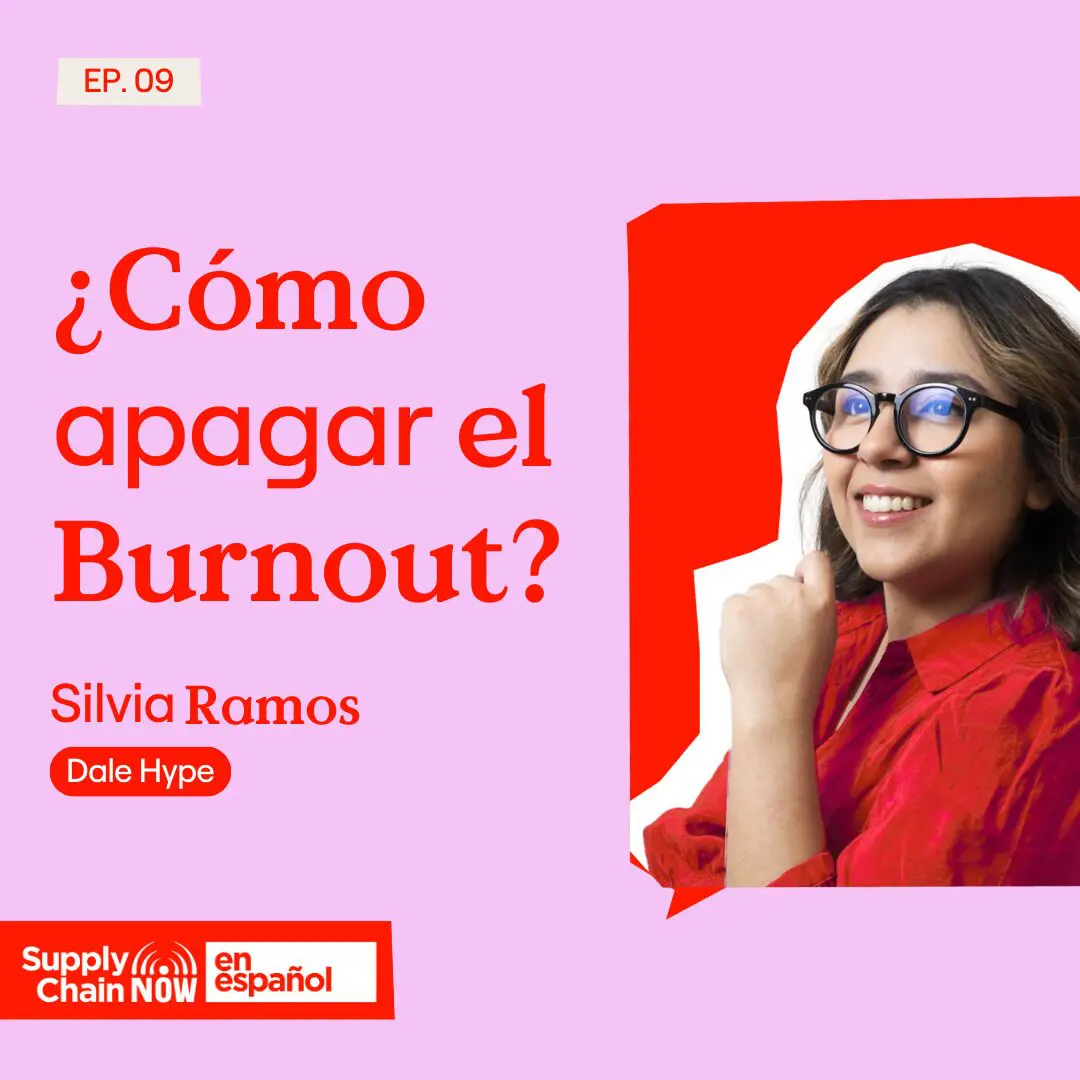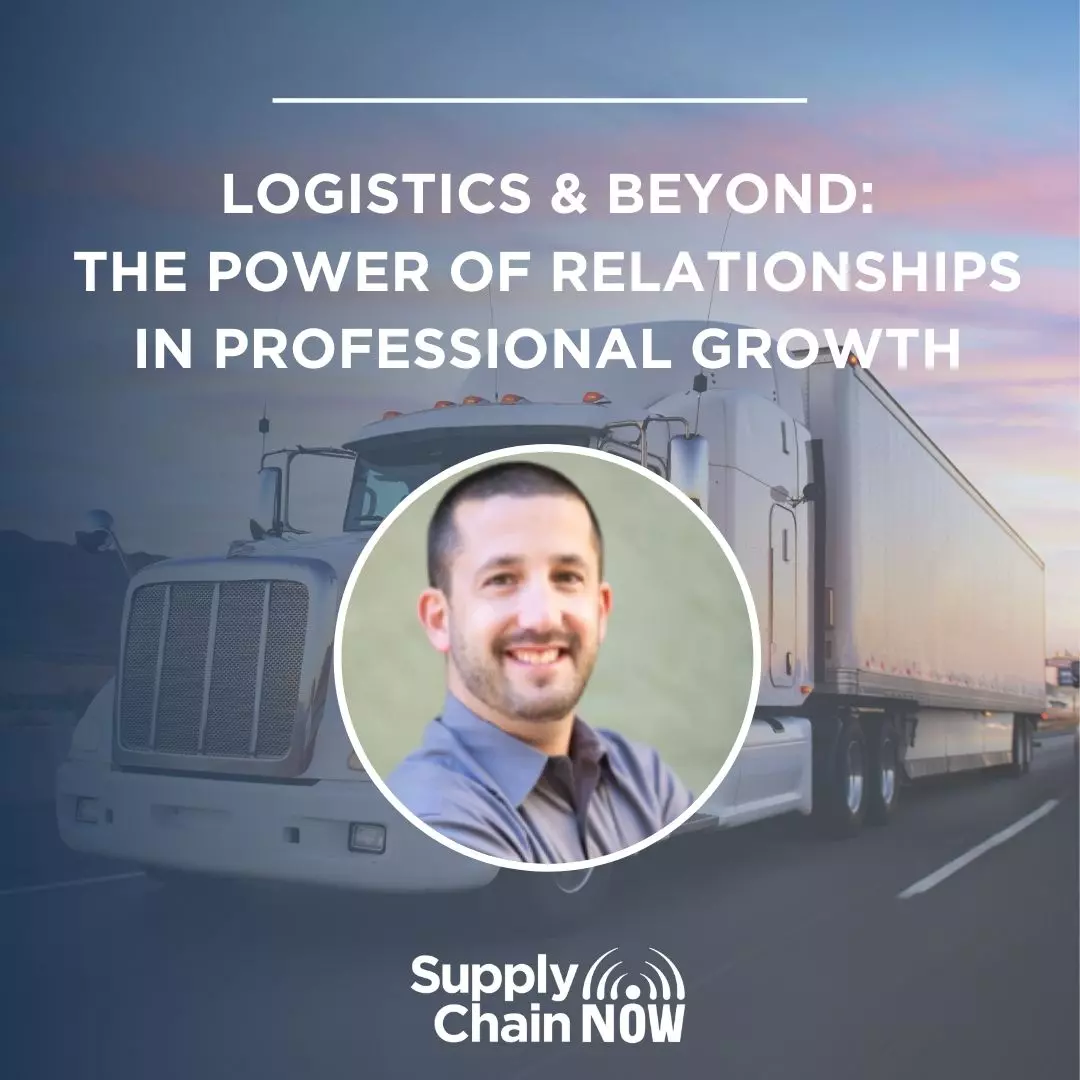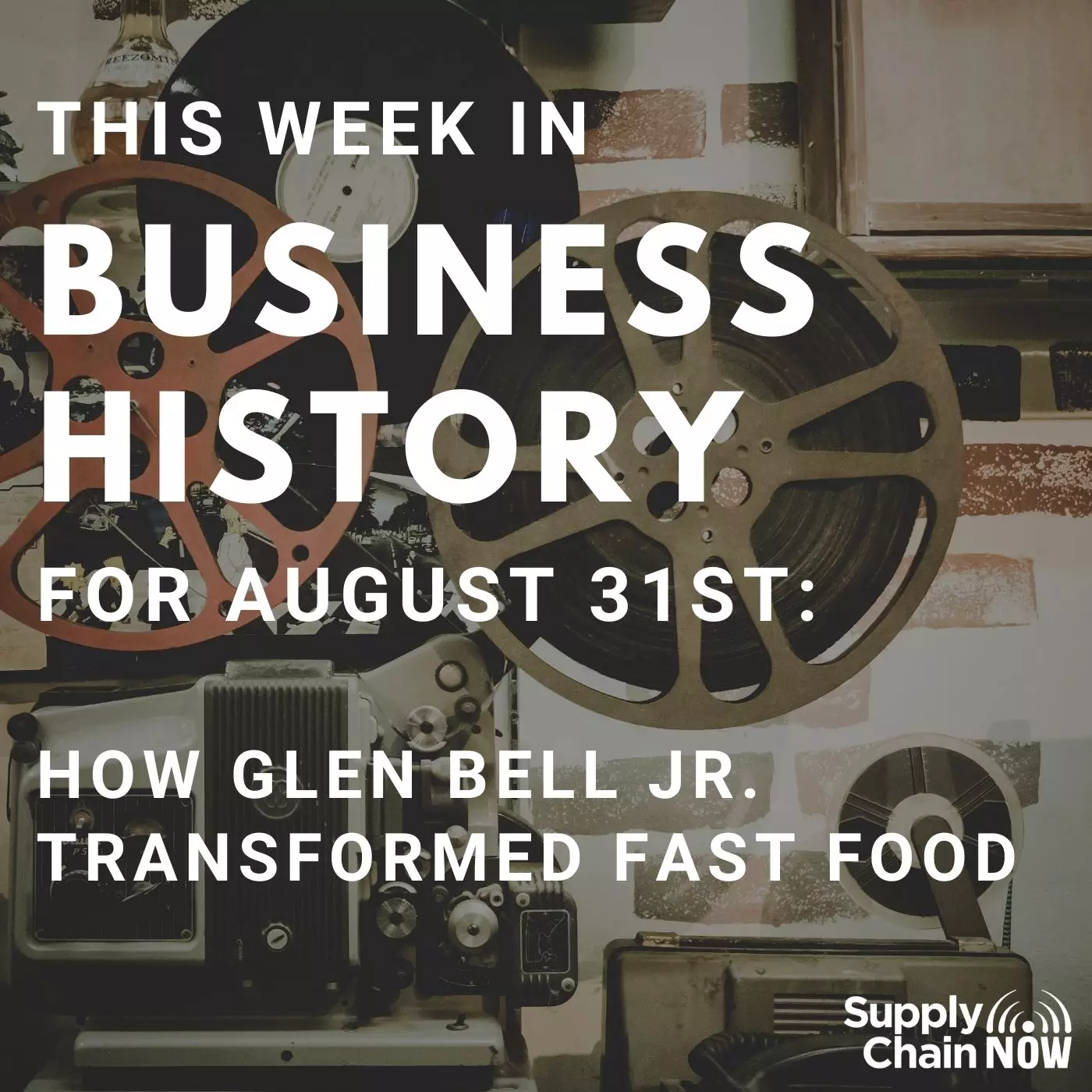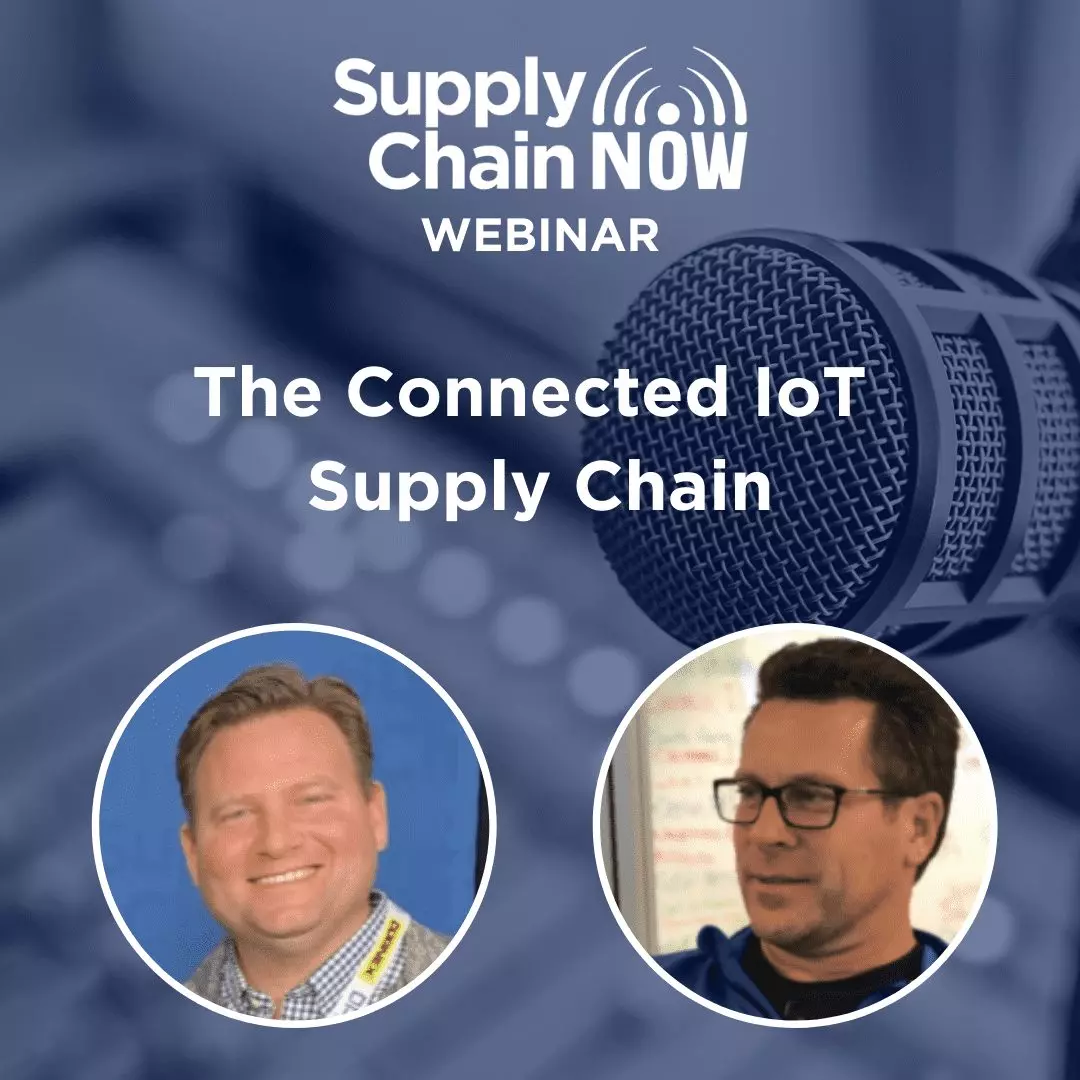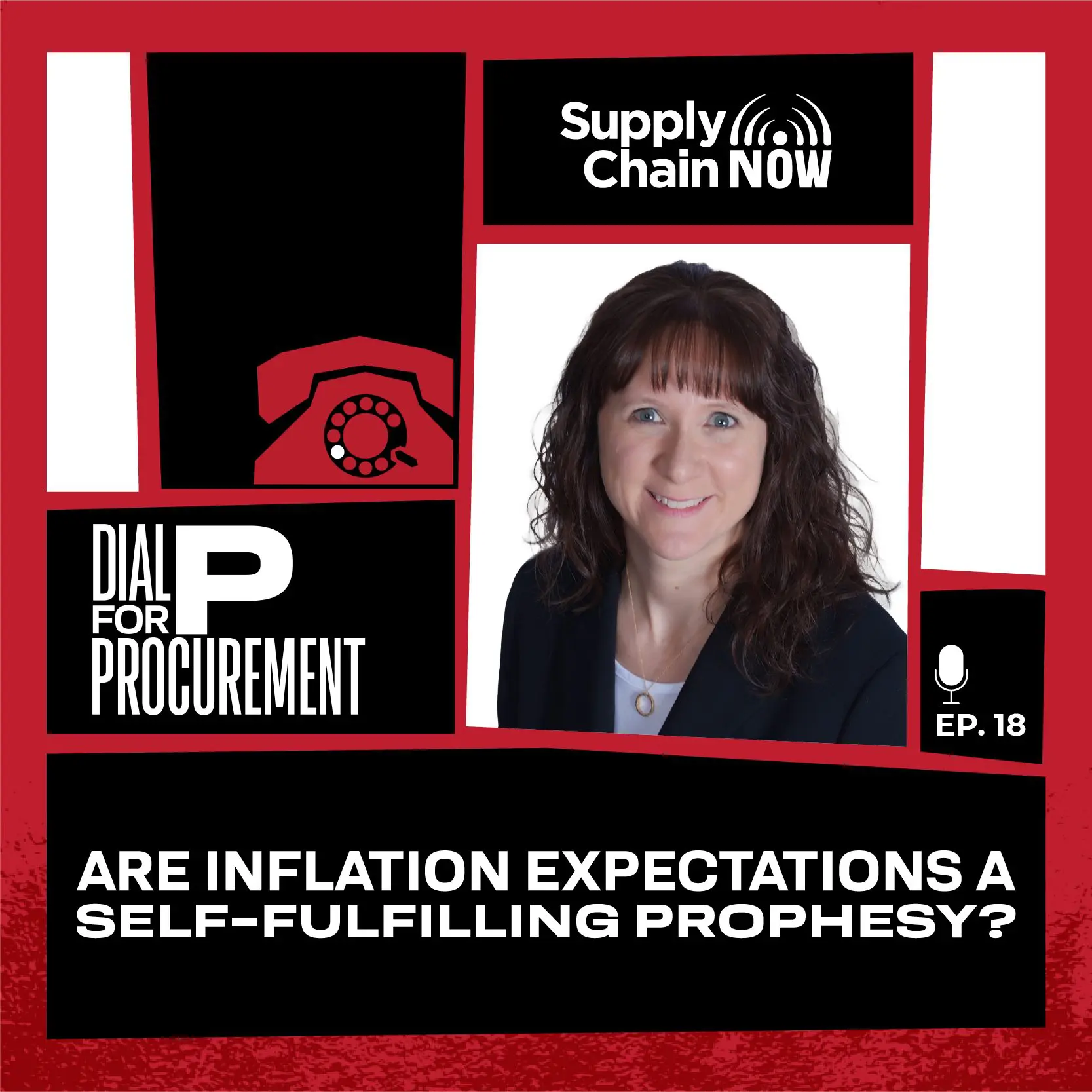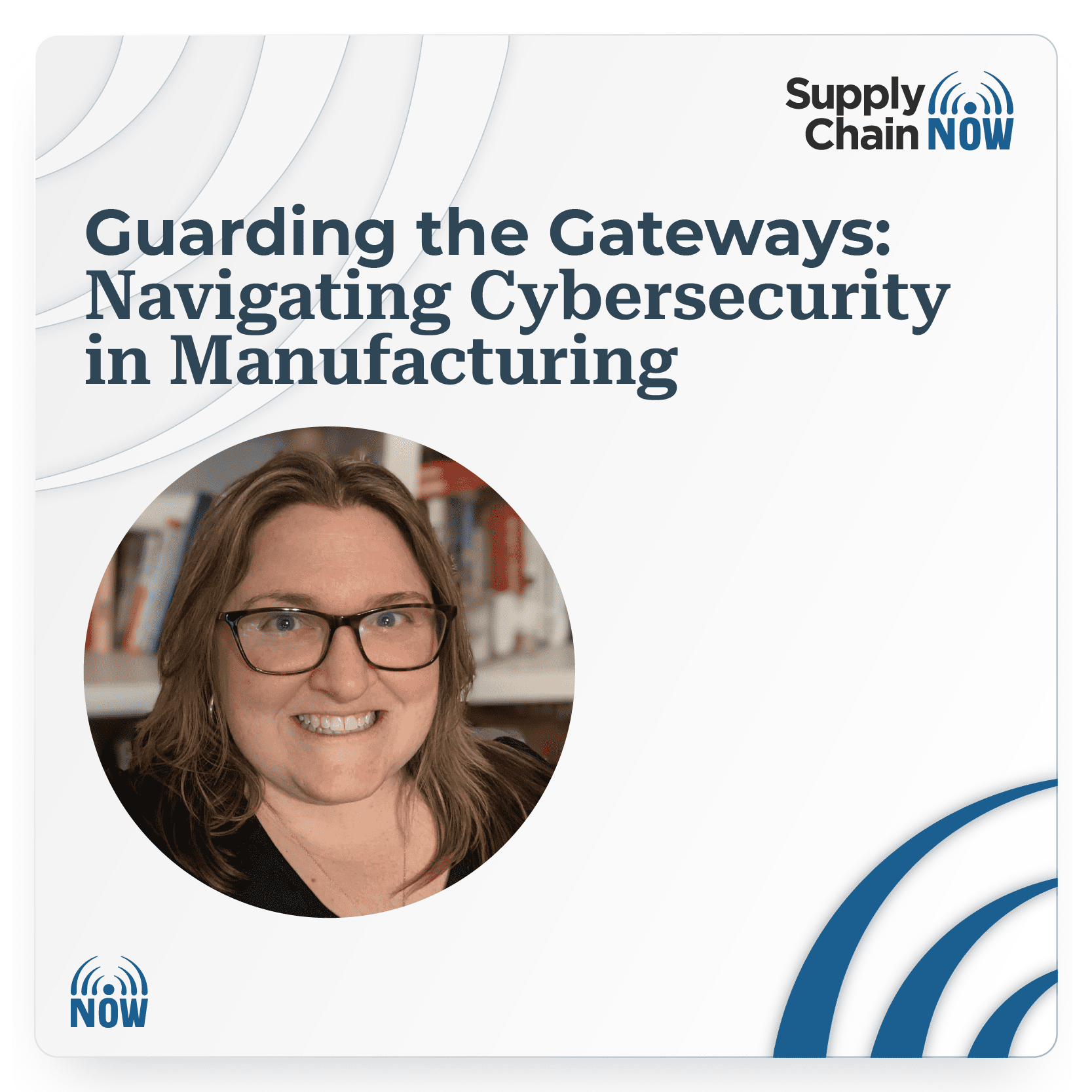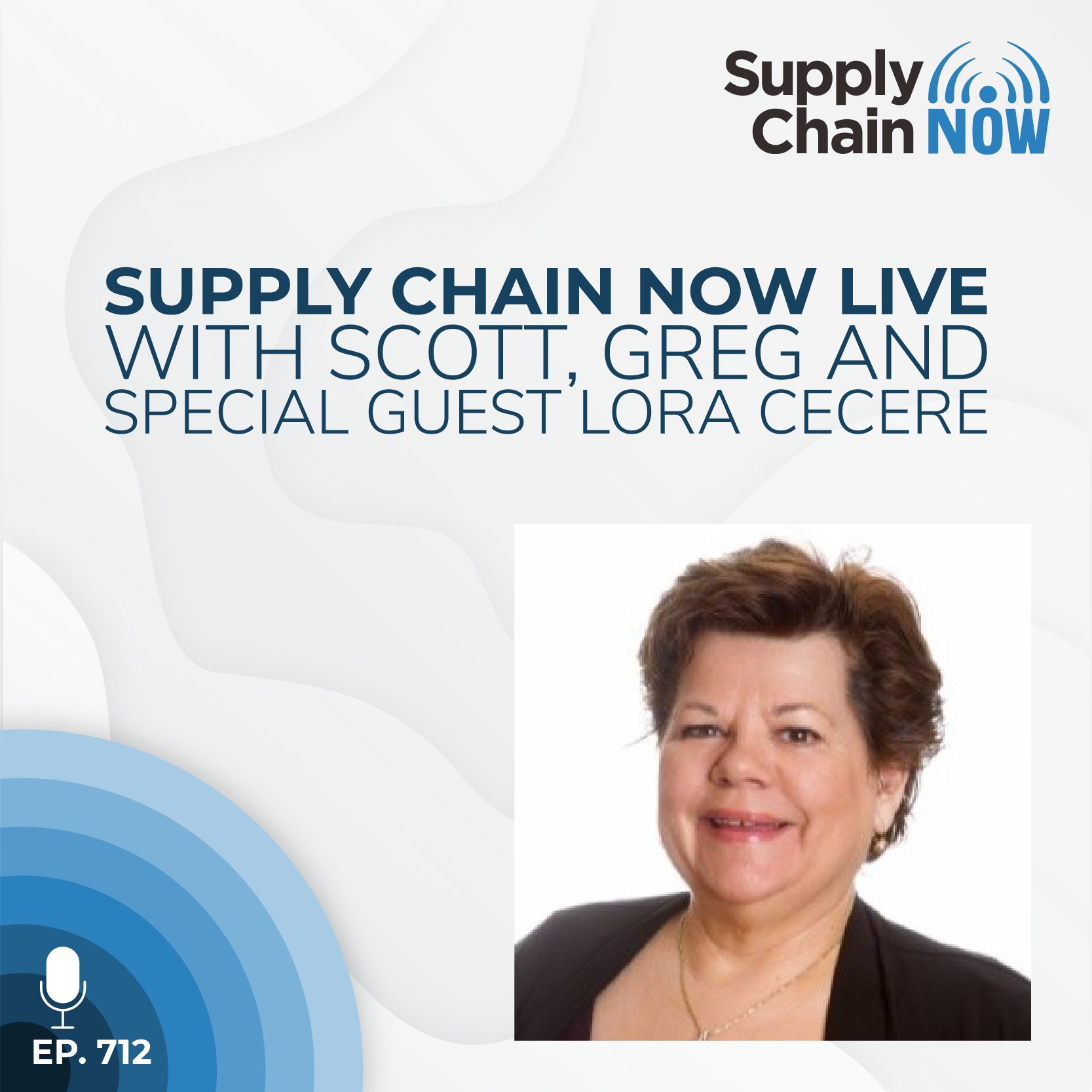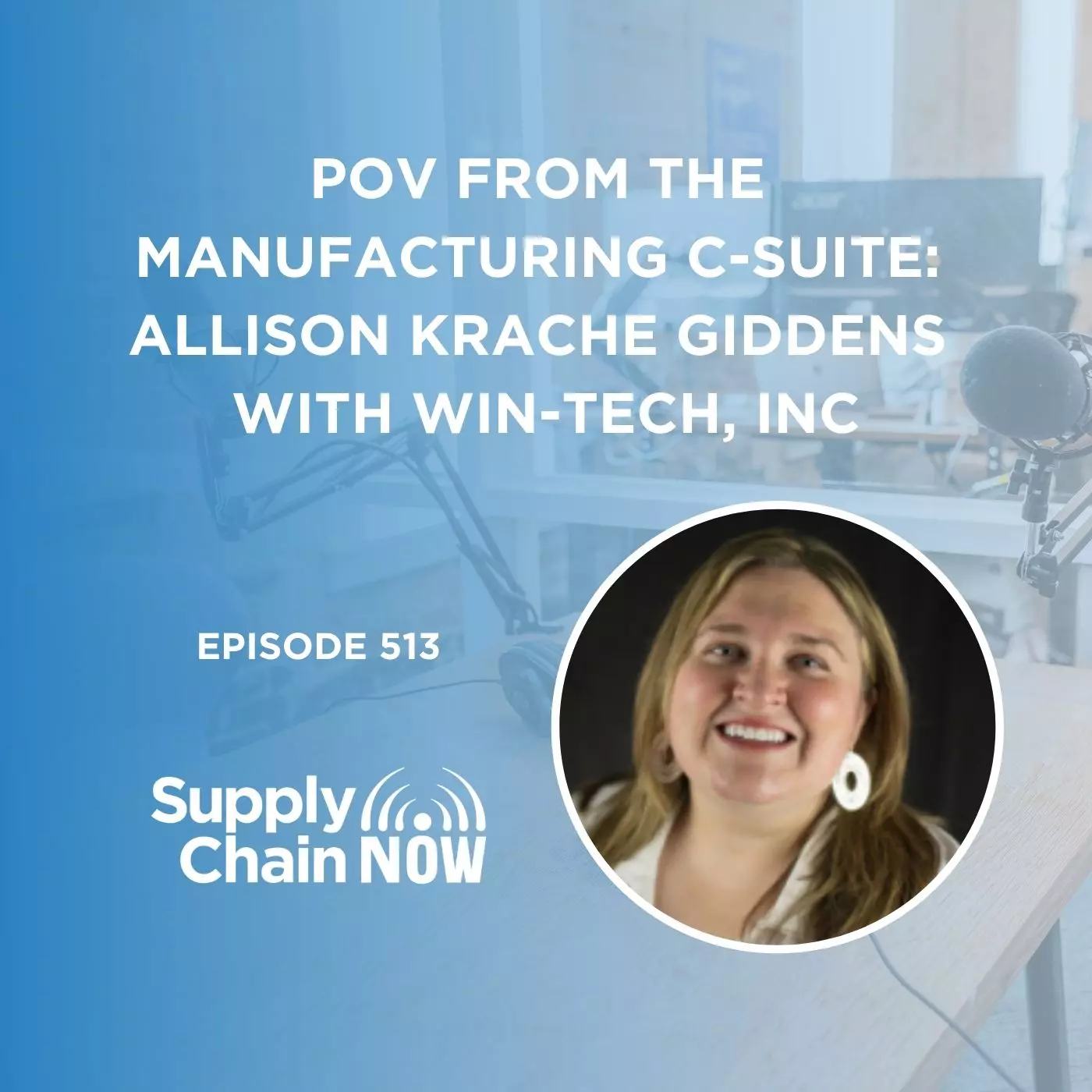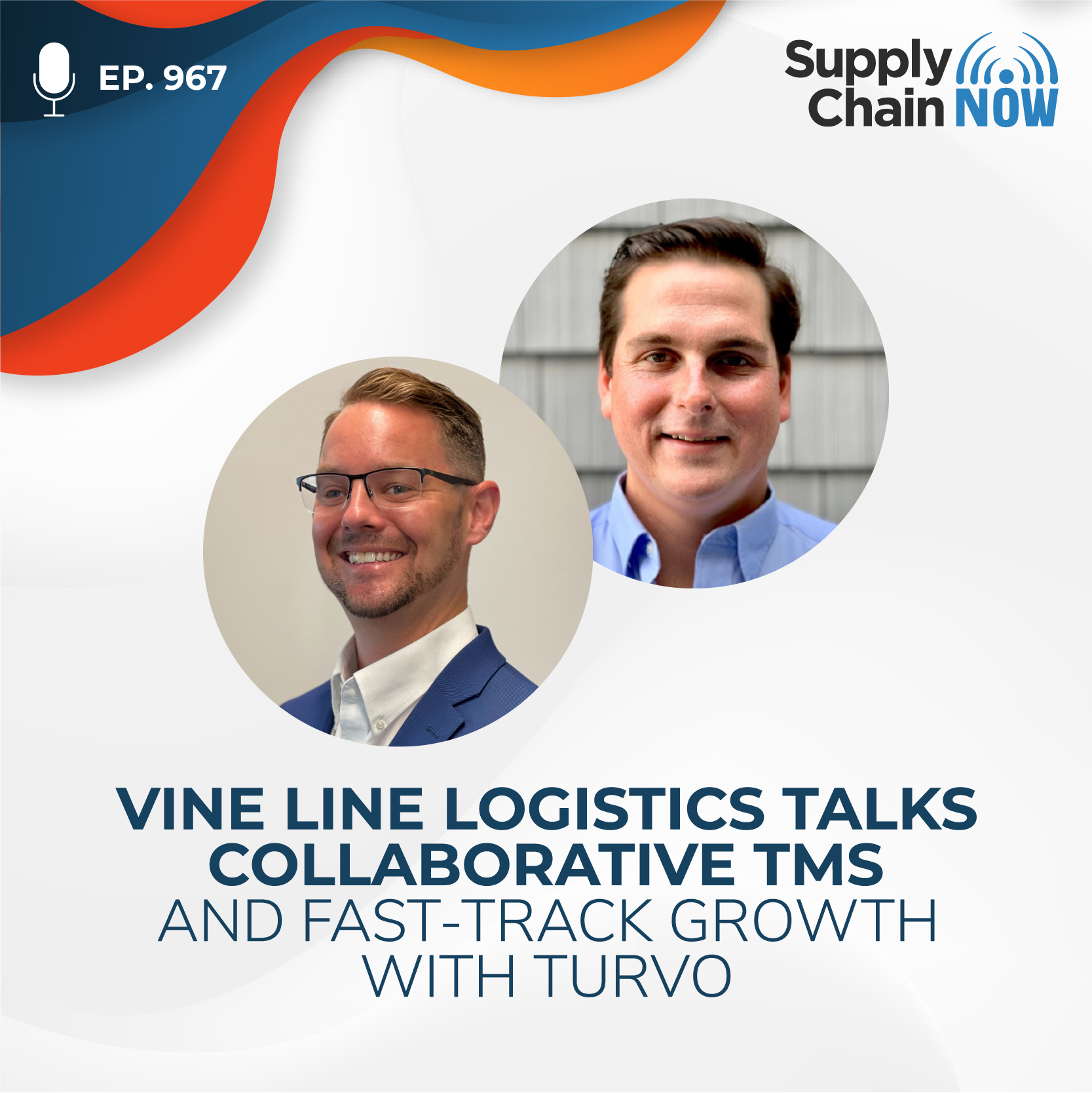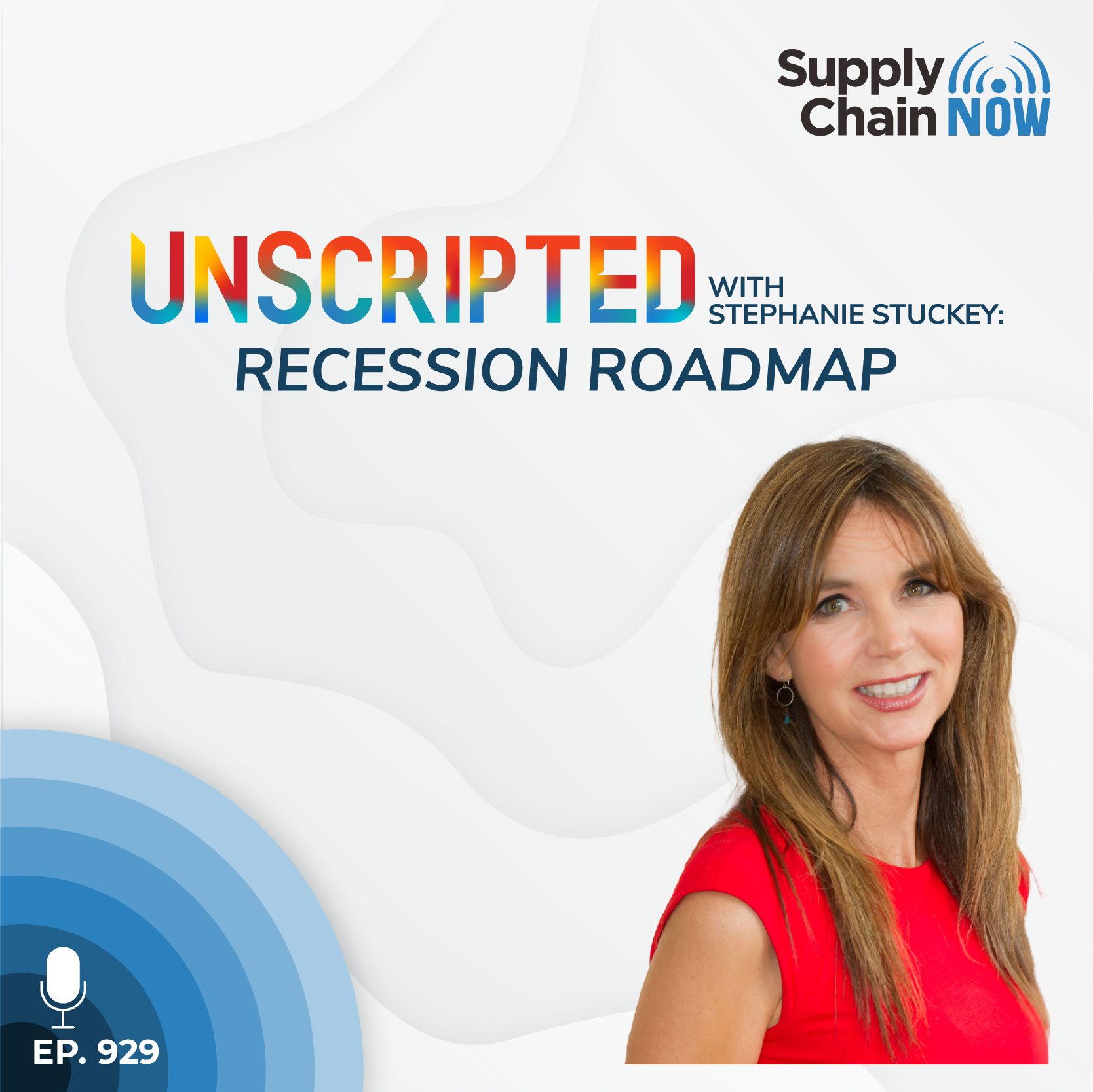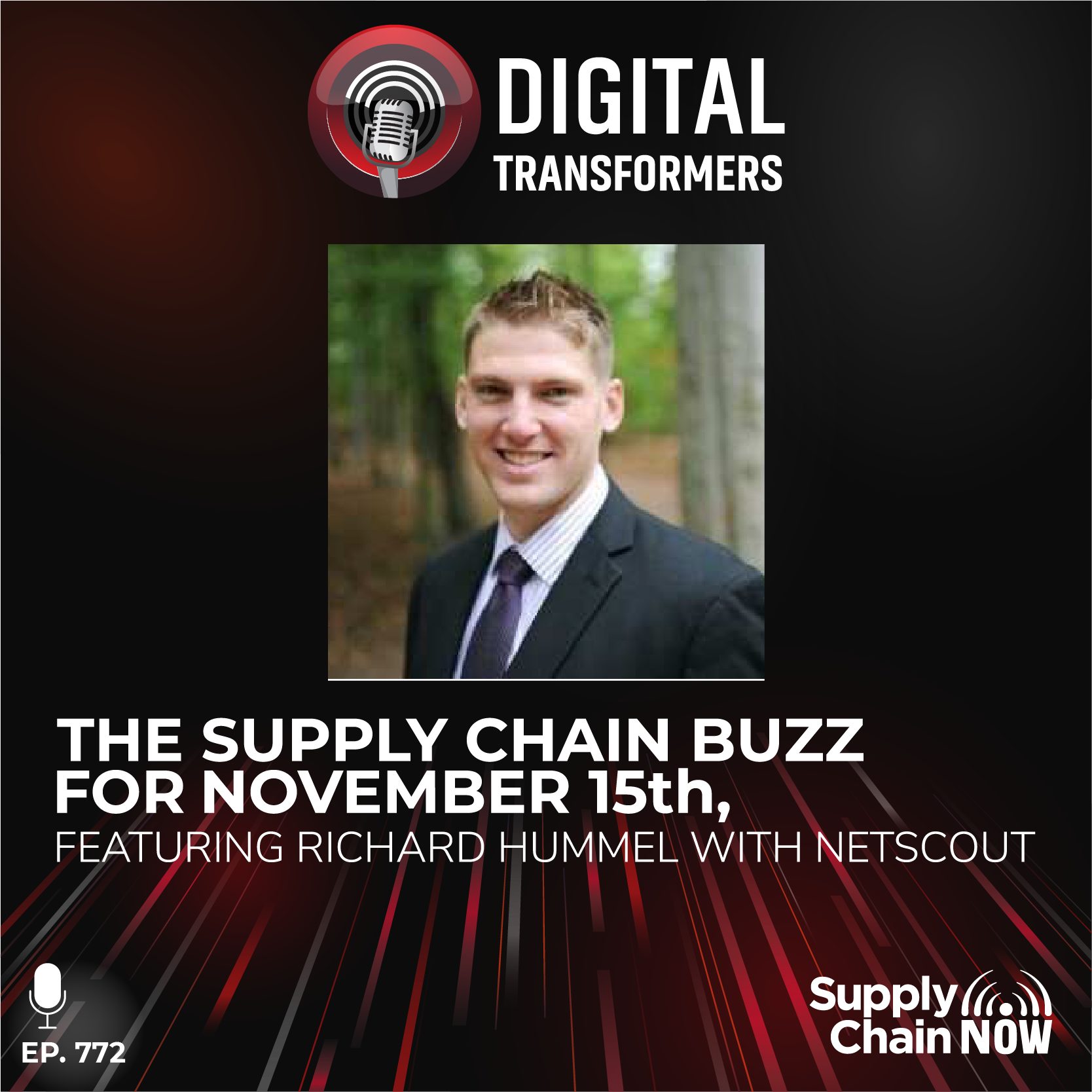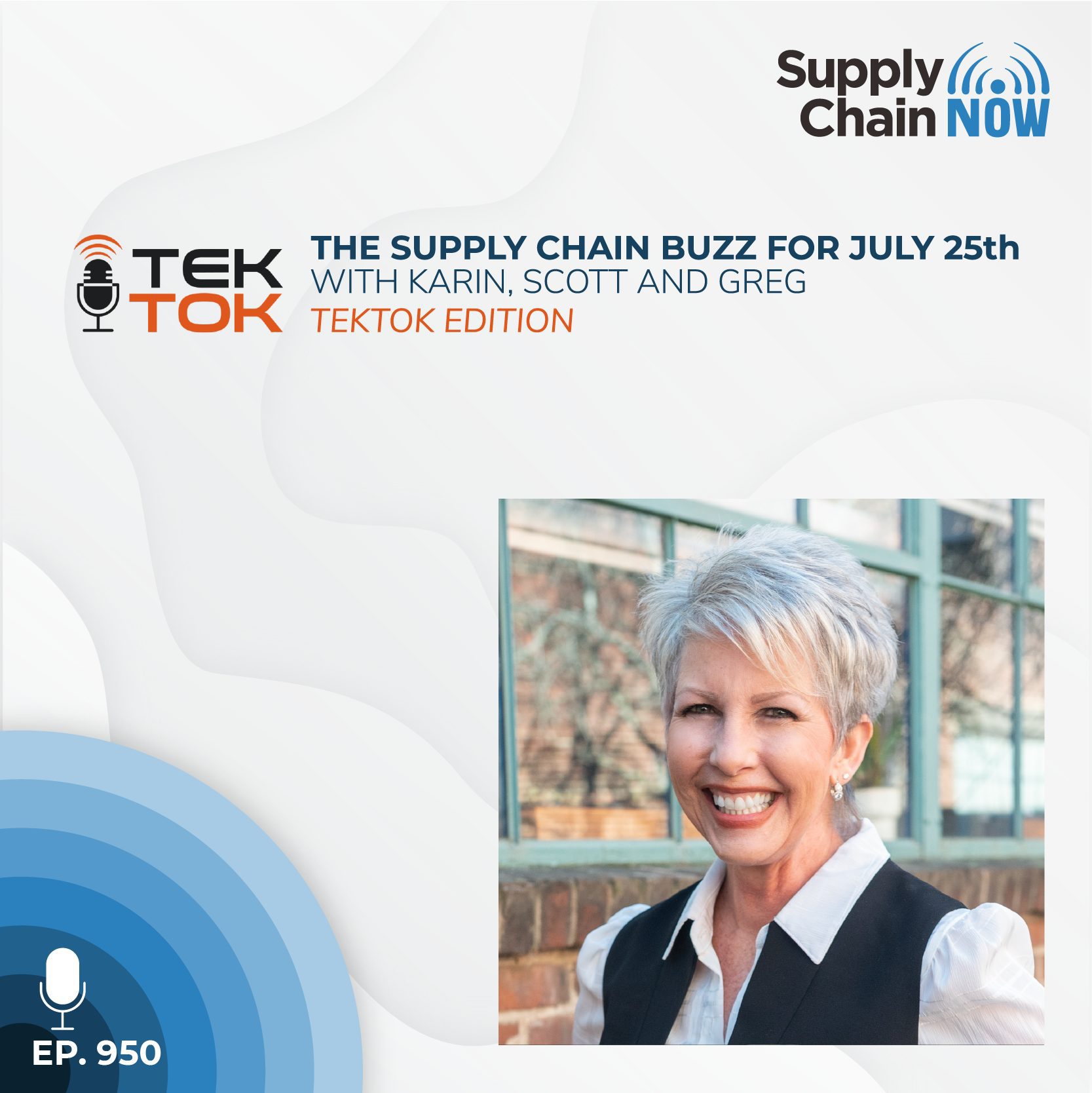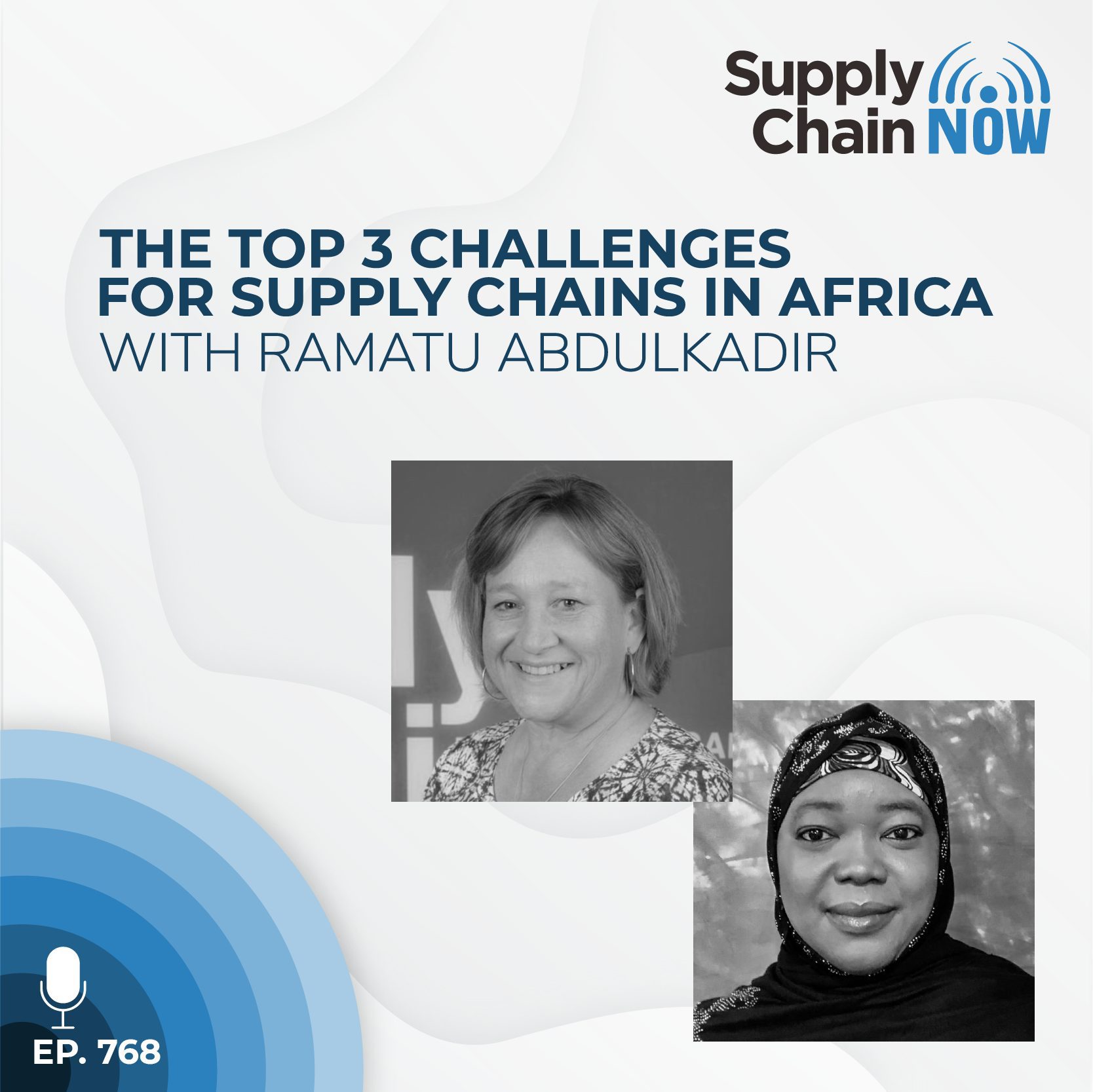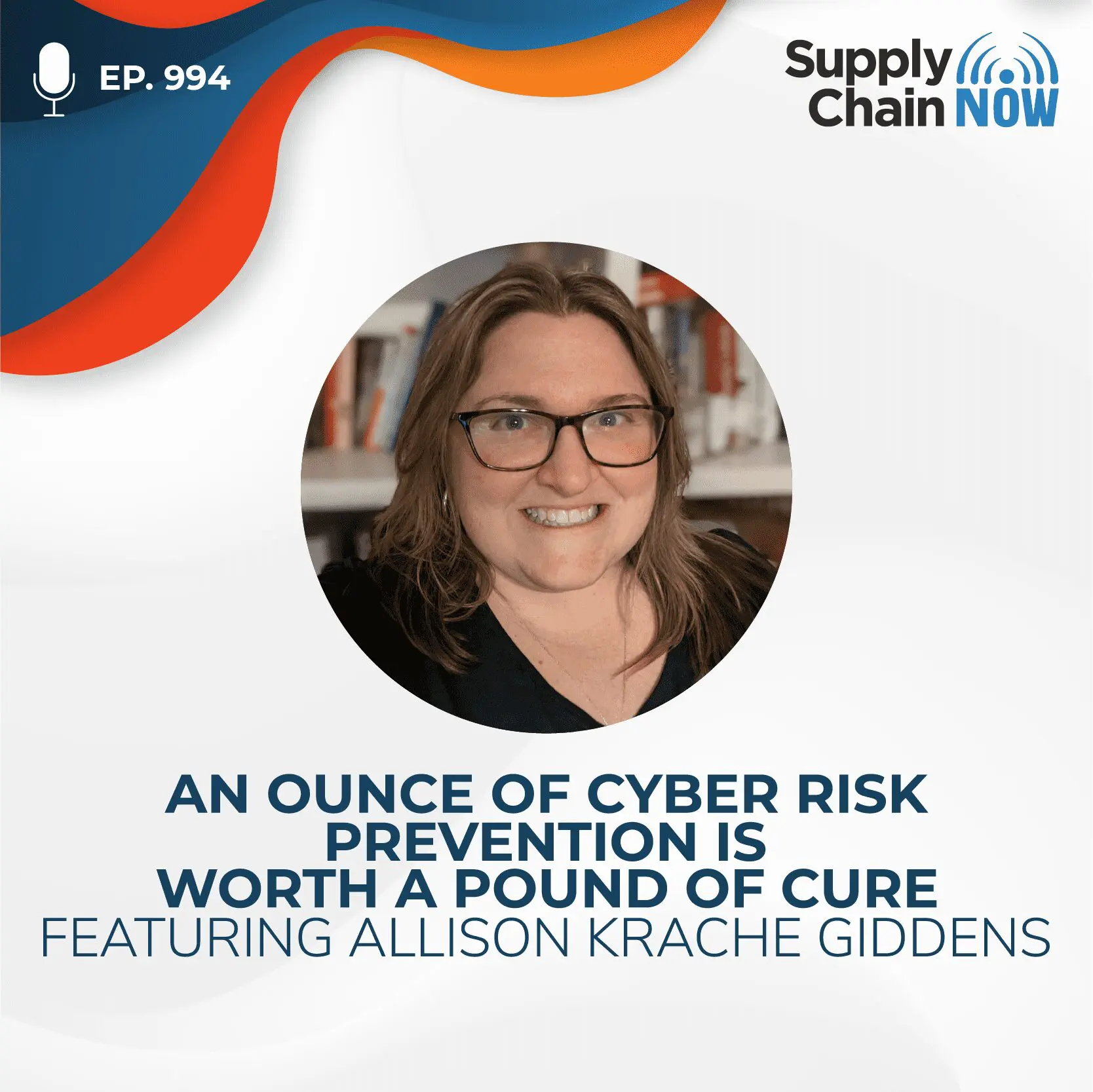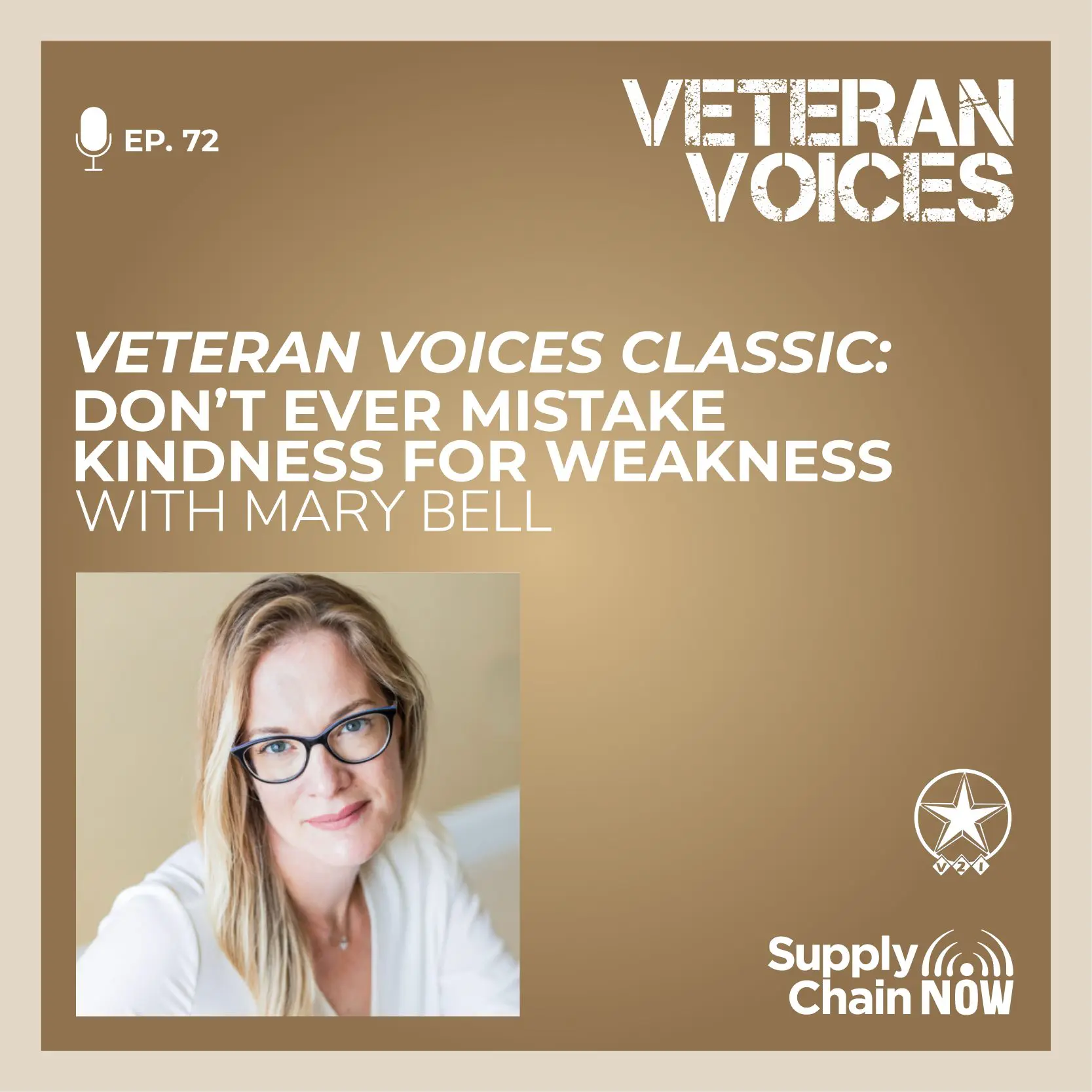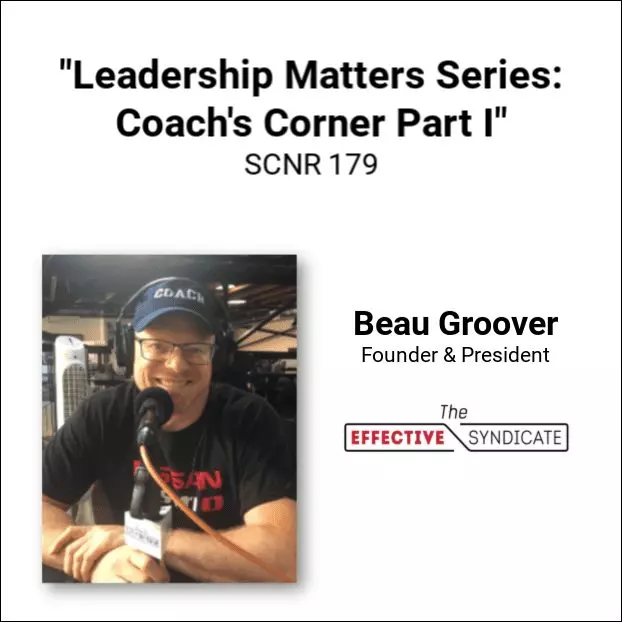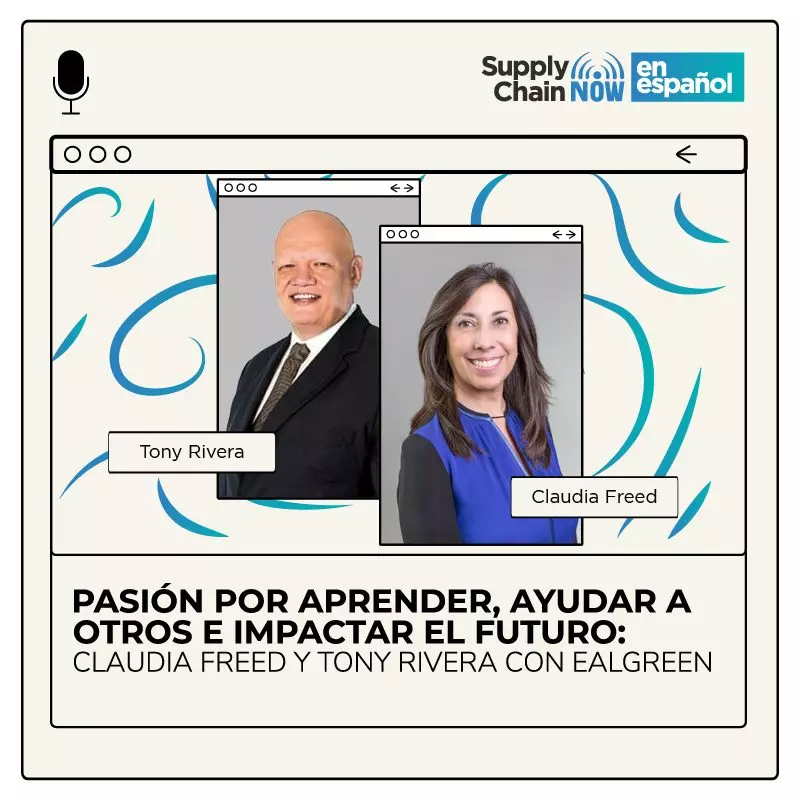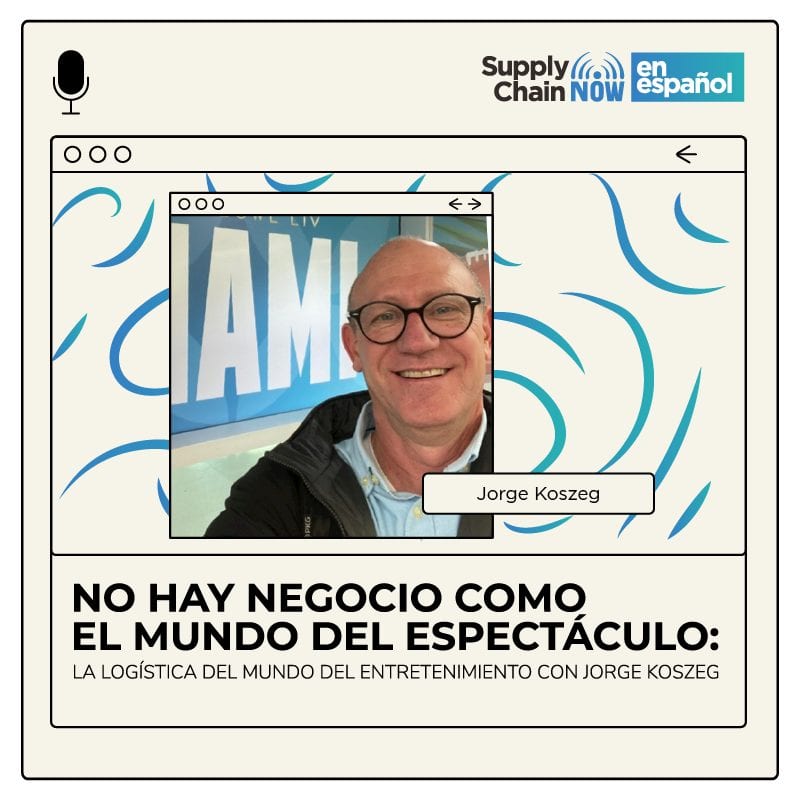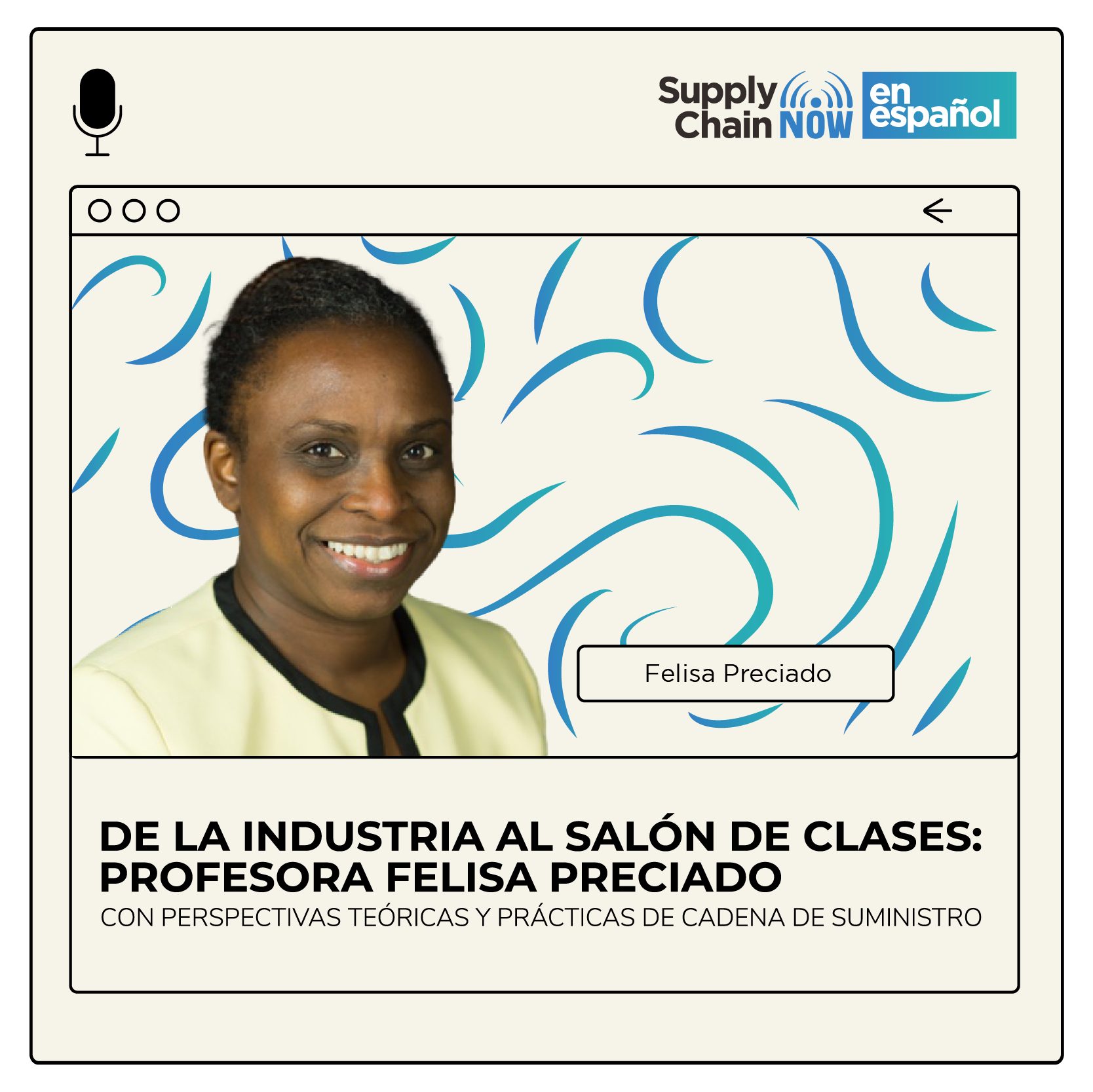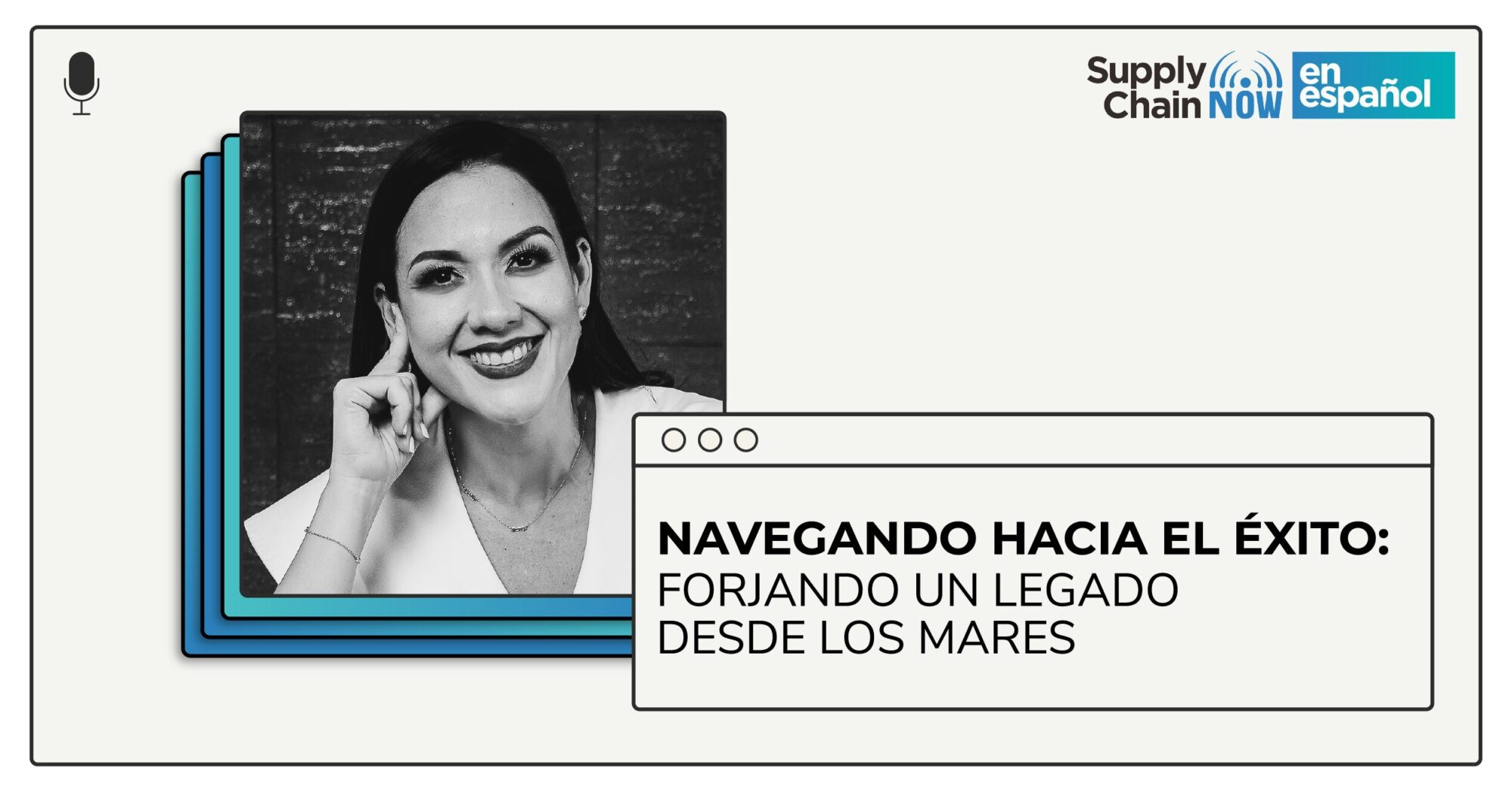
Hay que tener disciplina, constancia y buscar el cómo sí. Pero siempre trabajando en equipo.
-Marliz Bermudez
Resumen del Episodio
¡Conoce la historia inspiradora de Marliz Bermudez, Managing Director de APM Terminals México, en una entrevista con Enrique Alvarez!
Bajo su dirección, APM Terminals México se ha destacado en la industria portuaria gracias a su enfoque en sus clientes, tecnologías e innovación consolidando a APM como líder en la industria.
No te pierdas esta entrevista para conocer más sobre su apasionante trayectoria y su impacto en el mundo portuario.
Transcripción en Español
[00:00:01] Bienvenidos a Supply Chain Now en español presentado por Vector Global Logistics y Supply Chain Now. Este es el programa que da voz a las personas de habla hispana en la industria logística en constante cambio. Únete a nosotros mientras descubrimos las historias inspiradoras de nuestros huéspedes y aprendemos de su experiencia colectiva. Nuestro objetivo no es solo entretenerte, sino fomentar tu pasión por esta emocionante industria y apoyar tu desarrollo profesional en el camino. Y ahora aquí está el episodio de hoy de Supply Chain Now en español.
[00:00:34] ¿Qué tal? Muy buenos días. Mi nombre es Enrique Álvarez. Bienvenidos a otra emisión de Supply Chain en español. El día de hoy tenemos una muy interesante, muy, muy interesante invitada. Tenemos a Marlín Bermúdez, Directora general de APM Terminals en México. Este Marlín. ¿Qué tal? ¿Cómo estás? Muy buenos días. Es un placer. Buenos días. Es un placer tenerte aquí. Sé que hemos estado tratando de agendar esta entrevista por algunos meses. Sé que ha estado con mucho trabajo viajando y ha sido difícil. Así es que nuevamente te agradezco a ti, a tu equipo, a Sandra, por hacer esto posible. Y bueno, estoy muy contento y emocionado de platicar contigo un rato. No, ya somos.
[00:01:14] 2 millones, Gracias.
[00:01:15] ¿Por qué no? ¿Este empiezas contándonos un poco más de ti, de tu infancia, de dónde eres, Quién, quién es, quién es Marlisse?
[00:01:22] Bueno, yo soy la menor de tres hermanos, soy panameña, estudié marina Mercante, o sea, navegué, Fui cadete a una edad muy, muy temprana.
[00:01:31] Desde siempre te han gustado el mar y los barcos. O sea, siempre ha sido tu pasión. ¿De dónde viene? ¿De dónde viene eso, eh?
[00:01:38] Tengo un tío que trabajaba en la autoridad del Canal de Panamá y los veranos los pasaba con él. Entonces creo que ahí comenzó y el sueño era ser piloto en el Canal de Panamá. Entonces todo comenzó con un recorrido. ¿Para lograr ser eso tenías que ser cadete, segundo oficial de cubierta, eh? ¿En fin, hacer todo el recorrido para poder lograr ser capitán y y regresar entonces en en este programa de pilotos del canal, eh? Pero en el camino digamos que hubo un.
[00:02:07] Bueno antes de. Antes de que nos metamos a eso, este un poco más basándonos en tu infancia, este algún mentor. Tú hablaste un poco de tu tío. Me imagino que él tuvo una gran influencia en tu vida. Este el amor por. Es el amor por el mar o los barcos o los o el Canal de Panamá. A lo mejor. ¿De dónde viene esto? ¿Y bueno, cuéntanos un poco más de de tus mentores, eh? ¿Que te acuerdes, eh? Antes de entrar a lo mejor en tu carrera profesional.
[00:02:32] Yo creo que mentores sí, creo que latinas. Ah, uno muy importante, pero de igual manera creo que mucho. ¿Lo aprendí en casa a unos padres que eran muy eh llevar los valores muy tatuados en ellos, no? Entonces eran dos personas que trabajaban a diario eh, pero de manera eh, brillante, hacían el balance entre el trabajo y los hijos. Entre ellos se combinaban porque no era que todo el tiempo lo tuvieran. Estuvieran disponibles, claro, pero siempre había alguien disponible. ¿Uno de los dos, eh? Dos personas que no solamente trabajaban muy, muy duro, pero eran dos personas que eh nos dedicaron y nos enseñaron que sí se puede y que siempre hay una manera de lograr algo y la que la constancia, la disciplina, el enfoque y la pasión te pueden llevar muy lejos. Creo que eso fue un constante en la casa.
[00:03:20] ¿Oye, y ellos tenían algo de relación con las cadenas de suministro logística? Para Para nada.
[00:03:27] O sea, eh, no había una correlación con la industria en la que estoy. Bueno, y.
[00:03:31] Entonces cuéntanos un poco más. Dijiste que. Bueno, llegaste por todas las etapas, cadete. ¿Hasta me imagino lograste pilotear a través del canal?
[00:03:40] No.
[00:03:41] Todavía no.
[00:03:43] En el camino llego a ser segundo oficial de cubierta. ¿Eh? Pero en ese camino, en un momento dije No, sigo navegando y fui. Hice una maestría en Supply Chain Management en ese tiempo. Te estoy hablando de hace 20 años atrás. ¿No es que esto fuera un tema común, o sea, no, no, no se hablaba, no? Es más, habían dos o tres universidades que ofrecían este máster y mi decisión fue voy a hacer esta maestría y voy a ir lo que llamamos nosotros a Short. Y esa fue la decisión que tomé. No me arrepiento. Hice la maestría, eh, Trabajaba a la par, hacía investigaciones como un researcher, la hice en Inglaterra y estando haciendo esto me ofrecieron ir a trabajar en un proyecto con el gobierno chino en una terminal.
[00:04:31] Qué bien esto todavía en Inglaterra. O sea, te fuiste de Panamá a de Panamá.
[00:04:35] Me voy muy temprano de Panamá, me voy a los 17 años cumpliendo 18, me voy a Nueva York a una academia militar en marina mercante en Estados Unidos, en Nueva York, eh llamada Kings Point. Entonces entro a esta academia militar. ¿Fue una gran experiencia de vida, eh? Ahora lo miro para atrás y digo Fue la experiencia de vida perfecta.
[00:04:56] Sí, te abre mucho el panorama. ¿O sea, por qué crees? ¿Es que fue tan importante para ti?
[00:05:01] Bueno, digamos que yo venía de un ambiente muy familiar. Entonces. De por sí muy positivo. Llego a Nueva York. Era otro mundo. Llega una academia militar. Te da mucha disciplina, mucha estructura. E hice grandes amigos, pero más que nada te enseñan mucho el factor resiliencia. O sea, no, no.
[00:05:23] Nunca te das por vencido.
[00:05:24] Pero la única manera de lograrlo es la constancia y el buscar el cómo. Sí, pero más que nada es el trabajo en equipo. Si no haces equipo, si no se tus tus compañeros en una academia militar se vuelven tu familia. Entonces creo que a través de mi carrera ha sido. Sí, fue un un eje lo que aprendí en la academia y no fue algo que aprendes leyendo un libro, sino es a través de la experiencia que te da una academia militar. La experiencia que te da, claro, ir navegar en barcos de marina mercante. Sí, considero que la experiencia de la Academia es muy positiva. Oye, y.
[00:06:00] Son barcos de de velas también o son de motor todos de.
[00:06:05] Mira. Mi experiencia fue mi primer barco, fue un barco a vapor que ya no los ves. Qué bien!
[00:06:11] Qué increíble.
[00:06:12] Sí, sí, sí. Eran destinos. Tenía 30 años. En ese tiempo de 20 años. El barco tenía 30 años e iba en una ruta. Se llamaba El Yunque. Y la ruta era Miami por Everglades a Puerto Rico, San Juan y de vuelta. Creo que es una súper experiencia. Me acuerdo llegar a San Juan y llevábamos carros en la parte de abajo del carro y arriba eran contenedores y teníamos también tanques que llevábamos mucho producto hacia la fábrica de Bacardí en San Juan.
[00:06:44] Qué increíble, qué increíble experiencia.
[00:06:46] Entonces tienes tienes esa, estás en altamar, tienes los equipos de las personas que tienen licencias, pero también tienes personas que no tienen licencias. ¿Claro que operan el día a día, eh? Y me acuerdo que para mí fue una una grata experiencia porque haces todo, desde pulir el barco, sacar el óxido, pintar un barco y va subiendo poco a poco. No te dan una responsabilidad por las personas en altamar que te tienes que ir ganando muy bien. Entonces sí ha habido de todo. Digamos que comenzamos con ese tipo de buque, pero en el camino tienes portacontenedores que es. Es bastante cómico. Por más que llevo terminales hoy me la paso rastreando ciertos tipos de buque. ¿Entonces se volvió en un hobby, eh? Y en algún momento también estuve con porta carros. Los rolos.
[00:07:34] Sí, y en todo alrededor de todo el mundo. No, principalmente América, no.
[00:07:39] A todo el mundo. Tuve muchas rutas a Asia, tuve, o sea rutas al Mediterráneo, lo que es el Atlántico, o.
[00:07:45] Sea alguna alguna ruta favorita este Mediterráneo para ti.
[00:07:50] Ya a esa edad, o sea, para todo el.
[00:07:53] Mundo. Claro.
[00:07:55] Exacto. Para cualquier hubiera sido una gran ruta. ¿No? ¿Qué?
[00:07:58] ¿Qué puerto? ¿Te recuerdas? Así que dices Oye, me encanta. Voy a llegar a tal puerto.
[00:08:02] Teníamos Algeciras. Qué bien. Entonces bajabas y. Y era espectacular. O sea, hacer toda esa ruta del Mediterráneo. ¿No había un puerto malo? No.
[00:08:13] Pero a pesar de todo eso, siguiendo tu historia, decides salirte y irte a Inglaterra a estudiar. Síguenos contando de ahí.
[00:08:21] Correcto. Entonces voy a una maestría, termino la maestría. Tengo la dicha de que haciendo esta investigación me dices. Quieres ir a trabajar a China y. Y digo que sí y y de vuelta te digo qué mentores tuve. Tuve a mis padres porque lo que siempre me decían Tú solo di que sí, que aquí estamos. ¿Eran ellos, no? Entonces. ¿Y terminé yendo a China, eh? Era el desarrollo lo que llamamos un Freeport, que es una zona franca en la parte de atrás y básicamente la la operación de la terminal portuaria. ¿No? Eh, Y fue muy, muy interesante el desarrollo.
[00:08:54] ¿En qué parte de China estabas?
[00:08:57] En Nimbo.
[00:08:57] ¿Nimbo?
[00:08:58] Sí. Y en la provincia de Ceilán Era en ese tiempo, digamos, primero, una cantidad muy alta de terminales portuarias. Claro, dentro del mismo complejo portuario. Pero te da te o me permitió. Disculpa. Me permitió poder ver cómo el gobierno chino estructuraba su estrategia para poder desarrollar los ejes logísticos y de manufactura a través de toda su costa oeste. Wow! ¿Entonces, eh? ¿Comenzabas a entender por qué veía la parte de de electrónicos o por qué, eh? ¿El eje económico estaba en Shanghái y cómo ibas bajando de puerto en puerto o de complejo portuario, que creo que es lo correcto, porque a veces decimos un puerto y lo primero que le viene a la a las personas es hay una terminal, no? Claro, tienes que verlo como un complejo portuario.
[00:09:49] Qué otras Para la gente que nos escucha y bueno, a lo mejor no es tan experta en la parte de los puertos que otras partes componen un puerto. Obviamente todo el mundo, como tú dices, se piensa en el la terminal. ¿Dónde llega el barco? Básicamente, pero más allá. ¿Qué más compone un puerto en Enrique?
[00:10:06] Te voy a dar a ti una visión de el cual yo considero que es uno de los puertos mejor planeados que existen en todo Perfecto, perfecto y gracias a Dios he tenido la dicha de trabajar en este puerto desde el 2011, que es justamente el puerto de Lázaro Cárdenas y he estado en algún momento me he movido de de México, pero siempre creo que tenía Lázaro muy cerca y si nosotros vemos un recinto portuario como este y y creo que es la magia del mismo, tú tienes no solamente las terminales portuarias de contenedores, tienes las terminales portuarias de diversos tipos de carga, tienes lo que viene siendo carga general, granel líquidos, lo cual tienes que planificar en el mismo. Planificas para hoy, pero planificas a un crecimiento y tu crecimiento no es diez años, no son 20. Estamos hablando de un crecimiento exponencial hacia los próximos 50 y 100 años. O sea, eso es un recinto portuario, un complejo es planificado. En el caso de Lázaro Cárdenas vemos que tienen lo que es el área de servicios logísticos, entonces ellos pueden planificar todo el flujo de camiones dentro del complejo portuario para prevenir cualquier tipo de congestión. Tienes un área aduanera y de vuelta, de igual manera que planeas las terminales, planeas estas áreas porque esto va a crecer vis a vis esta terminales y la demanda tanto de importación, exportación y hasta cierto nivel del trasbordo que gire por el puerto. Eh Bueno, tiene un un punto clave en seguridad tiene un punto clave en Administración Portuaria Integral. Entonces es son todos estos jugadores y tienes una industria paralela que te está dando servicios en cuanto a remolcadores, eh, que tal vez me he vis a vis a los barcos. ¿No tienes agentes aduanales? Claro, tienes suplidores a los barcos y en fin, es un efecto multiplicador.
[00:12:02] Sí, me imagino que es. Sí, es. Es mucho más complejo de lo que a lo mejor todos nos imaginamos, pero. Pero bueno, es algo que si no lo planeas, como bien dices en cada una de sus partes, pues bueno, se empiezan a causar cuellos de botella que luego hacen o entorpecen las operaciones de un puerto en general. Pero volviendo a tu trayectoria, que está muy interesante, entonces estás en nimbo en China estás esta gran oportunidad y después de viajar por todo el mundo, o sea, con tienes, me imagino la experiencia y el conocimiento de la mayoría de los puertos. ¿Cuántos puertos más o menos has visitado en tu vida hasta ahora?
[00:12:38] ¿Eh? ¿Navegando, eh? ¿De por sí deben hacer un par de docenas de puertos, eh? Y en la región me he enfocado mucho en la región en los últimos cinco años. Eh, alrededor de unos 12 14. Entonces. ¿Sí, sí, he visto varios puertos, eh? Pero bueno, estoy en Limbo y en ese momento conozco una persona que se había graduado de la universidad a la que yo había ido en Nueva York y me dice me mudo a Panamá y le dije Oye, lo que necesites, aquí estoy.
[00:13:07] Si tú eres de Panamá, aunque llevabas años de no estar en Panamá.
[00:13:10] Exacto, pero todo atado. Y eso justamente pasó y llegó a Panamá. ¿Él venía como director de operaciones para la región de APM Terminals y me dice Qué crees? Tengo una posición.
[00:13:22] Vienes a él.
[00:13:26] ¿Edad? ¿Hace 18 años, eh? Vengo entonces a Panamá y comienzo a trabajar con él y en menos de una.
[00:13:33] Ya con APM.
[00:13:34] Ya con APM.
[00:13:35] Cuéntanos para la gente nuevamente como referencia antes de meternos a APM. ¿Qué qué es APM? ¿Qué? ¿A qué se dedica? ¿Qué es la empresa?
[00:13:43] Cuando empezó es el brazo de terminales del Grupo EPM, entonces tenemos alrededor de 64 o 65 terminales portuarias a nivel del mundo. En México tenemos una operación en el puerto de Lázaro Cárdenas y tenemos una operación en el puerto de Progreso en Yucatán, de igual manera gestionamos el país desde la Ciudad de México, entonces tenemos esas tres oficinas, puedo ponerlo de esta manera y pero.
[00:14:09] En la que empezaste fue en Panamá, o sea, te regresan a Panamá, Panamá, México, que tus papás estaban encantados en ese momento. Al final de cuentas como padre siempre los impulsas a seguir, pero muy en el fondo te gustaría tenerlo cerca A final de cuentas correcto.
[00:14:24] Yo creo que todos tenemos esa experiencia y es una de las cosas más difíciles para mí, porque yo sí salí casi 19 años, claro, y y voy y digo seguro los voy a empujar, saldrán por la puerta, estaré rezando y yo sé que las lágrimas van a salir, pero sé que es lo debido, porque tienen que crecer, tienen que evolucionar, tienen que ellos hacer su vida. Claro, es muy fácil decirlo. Es algo muy duro hacerlo.
[00:14:48] Muy, muy, muy difícil. Yo tengo dos hijos, 15 y 13 y hasta ahorita te puedo decir que no entiendo cómo mis papás me dejaron hacer tantas cosas yo. O sea, es tan difícil, no entienden que. Momento dices Ok, bueno. Y puedes ir a escalar y acampar y. O sea, yo todavía no tengo esa madurez o inteligencia emocional este y espero adquirirla con el con el tiempo. Pero tienes toda la razón. ¿Ya tía, tus papás te dejaron viajar por todo el mundo?
[00:15:15] Sí, no tenía ni mayoría de edad y me dijeron adiós. Entonces yo creo que tal vez es una combinación. Enrique de ser la tercera.
[00:15:21] Si los más chiquitos y es diferente. Eso es cierto.
[00:15:25] ¿Algo de eso debió haber ayudado, eh? Pero sí, efectivamente, ellos están muy felices. ¿Yo regreso a Panamá, eh? Un año más tarde sale este proyecto en Punta Colonet y allá voy.
[00:15:38] Y eso ya es México.
[00:15:39] Ya es México la primera vez.
[00:15:41] Cuéntanos porque nos me contaste un poquito antes de que entráramos al aire o que empezara a grabar. Cuéntanos un poco de este primer proyecto. ¿Y bueno, cuál fue el impacto, eh en particular o el detonante para tu carrera profesional?
[00:15:54] Mira, para mí era un momento eh, de aprendizaje y y la empresa se enfoca mucho en entrenar y desarrollar a las personas y este es el el mero ejemplo, porque cuando voy a México, mi primer, mi primera ronda o mi primer deployment era básicamente para apoyar a un director de inversiones que había en México y meramente era para aprender. Enrique O sea, yo no tenía ningún cargo.
[00:16:17] Sí, claro.
[00:16:18] ¿Eh? Aparte de que yo no llevaba el proyecto, yo no tenía la experiencia para poder llegar a un nivel de manager tampoco. ¿Entonces básicamente llegas a México y es OK, vas a aprender, vas en el camino y a este director que a la larga se convirtió en un gran amigo, hoy por hoy, eh? Y esa fue la primera ronda, vamos a ponerlo así.
[00:16:39] Algo que a mí me gusta mucho hablar de cultura. Y bueno, APM tiene una cultura envidiable, este de clase mundial, algo a lo mejor de esta persona que tú, el primer el director de ese proyecto en México. ¿Algo que recuerdes muy particular de alguna enseñanza, alguna sugerencia, algún consejo?
[00:16:57] ¿Mira, te voy a contar algo que fue muy cómico, o sea, y y todavía lo veo y le digo a ver, no me he olvidado, eh? El talón de Aquiles mío en ese momento era la parte financiera. Ok. Este hombre me lo confesó un par de años, luego se inventaba modelos financieros, entonces me los mandaba. Oye, tenemos que mandar estos headquarters y. Y creo que tienes que revisar.
[00:17:22] Invento totalmente inventado.
[00:17:24] O sea, al final llegó un momento Enrique, que yo veía el modelo financiero. Te decía busca la célula, es siete, por favor. Ahí está el punto este. ¿O sea, llegó a ese nivel después de 18 meses, eh? Alucinaba los números y en algún momento me dijo quiero que sepas que la mitad de esos modelos eran solamente aprendices.
[00:17:42] O sea, qué gran mentor que toman tiempo!
[00:17:46] Es un gran amigo. Y yo le respondí Quiero que sepas que muchas veces me tocó hacerlos en sábados porque no entendía nada.
[00:17:52] Wow.
[00:17:53] Bueno, pero. Y es una excelente, es una excelente historia en ese momento qué tanto era como frustración de haber desperdiciado tantas horas y que tanto luego agarraste el Ah, bueno, mira, gracias a él por hoy.
[00:18:07] Hoy por hoy miro hacia atrás y mucho de de lo que puedo analizar cuando veo ciertos negocios o tomo ciertas decisiones es por el entendimiento al detalle de la estructura financiera y es.
[00:18:20] Lo que él te dio. Y esos dos ejemplos y.
[00:18:23] Yo lo veo en mi camino. Ese fue el legado que él me dejó, aparte de que tiene un don de gente inmenso, o sea, es un gran ser humano, eh, que tiene una carisma única y se le abren muchas puertas. Por eso creo que esa combinación. Él tenía la parte financiera de una manera muy fuerte, tenía la parte carismática para poder atar las cosas y atar a las personas que realmente lo que trae el resultado al final.
[00:18:48] Y cómo quieres compartir su nombre. Se ve que es un excelente, un excelente mentor y una persona que es increíble que se toma el tiempo para hacer algo así.
[00:18:57] Sí, se llama Robert Boozman y Y te soy honesta, lo hermoso de APM es que como él, he conseguido varios en el camino. Está bien y Y no he tenido mucha suerte. Sí, creo que he tenido mucha suerte y. Y la empresa te te da eso. Esos mentores. Y yo creo que lo que usualmente yo trato de transmitirle al resto es, eh, Beat forward. Porque eso, eso, cada uno de ellos me ha hecho quien soy. Claro, y y cada uno de ellos ha impactado y ha moldeado el tipo de liderazgo que tengo.
[00:19:28] ¿Oye, y bueno, eso es un reto cadencia que tenías eh? Alguno me imagino que en tu carrera profesional en APM y has tenido muchos retos en esta industria. Hablábamos también un poco una industria dominada todavía por los hombres, una industria difícil, la verdad. Hay que decirlo abiertamente para las mujeres que están entrando a esta industria. ¿Algún algún reto fuerte para ti? ¿Algo que que puedas compartir? ¿Y bueno, y cómo lo resolviste?
[00:19:53] Eh, Yo creo que uno de los retos más grandes fue 2011 2012, ganamos la licitación del puerto de la. Cárdenas era para nosotros. Era un proyecto que queríamos mucho y teníamos muchos años evaluándolo y llegó el momento y se da el proyecto y en algún momento, eh, mi jefe llega y me dice oye, tú vas a construir una terminal. Y yo muy elocuente, muy feliz, claro que sí. O sea, lo veíamos todo muy en positivo, claro, pero es que lo estás haciendo mal. Y yo Pero no hemos ni iniciado. ¿O sea, de qué me estás hablando? Me dice No la veas como hacer una terminal de lo que tú conoces. Analiza cómo deben de ser las terminales en 20 30 años y define cómo debe ser la terminal. Y en ese momento, eh, con un grupo de especialistas decidimos hacer la primera terminal Semiautomatizada en todo Latinoamérica.
[00:20:44] Wow!
[00:20:46] Yo crecí en Lázaro Cárdenas, claro está. ¿Enrique llegas Okay, ya vamos a hacer automatizados Qué significa? ¿Habían dos o tres en el mundo, no sabíamos ni por dónde iniciar, eh? Pero creo que una parte que me quedó muy clara es que inicias poniendo el equipo que va a llevar eso a cabo y.
[00:21:04] No es una decisión popular. Obviamente no, porque estás a final de cuentas la gente que no lo malentiende a lo mejor puedes verlo como un este, estás quitando empleos que que no debe ser así, no puedes generar mejores empleos, pero esa es la primera impresión que todo mundo tiene cuando oye en automatizar.
[00:21:23] Mira, en ese tiempo había este líder sindical y me acuerdo que dijo quiero ir a ver una automatización. ¿Entonces fuimos a una terminal en Virginia, eh, que tenía el mismo concepto, un diseño muy similar y fue a evaluarlo cuando él entró a Hay una sala de control que tiene estas terminales, no? ¿Y él me dice Todo lo manejas aquí? Le dije Sí, aquí es donde están sentados todos. Y él fue conociendo a cada una de las personas que también eran parte de un sindicato. ¿E y cuando las va conociendo les pregunta cuál es la diferencia entre lo que tú experimentaste antes y lo que experimentas ahora? Las personas le dijeron Es un nivel donde yo llego a un sitio. Primero que nada me entrenan, tengo una visión de tecnología, tengo un entendimiento de estrategia, no solamente estoy ejecutando. Llego al sitio. No tengo miedo de tener un accidente allá afuera. Me siento en un lugar con una silla bastante cómoda o una computadora. Estoy viendo desde aquí, desde un edificio administrativo con un aire acondicionado con todas las comodidades, un café al lado, toda la operación sin llevarme un riesgo de que no pueda llegar a mi casa al final del día, claro. Tenemos que entender que las terminales Enrique son lugares con alto nivel de inseguridad y día a día, tanto nosotros como todos la industria nos enfocamos en cómo subir los estándares de seguridad del personal.
[00:22:54] Claro, no me quejo que para ellos es una diferencia enorme y se sienten. Bueno, hace un impacto mayor y se sienten mucho más reconocidos como personas. No me imagino que están trabajando y eso fue lo que hizo el cambio. Enrique.
[00:23:08] O sea, en ese momento ellos aprobaron.
[00:23:11] ¿Y en qué? En qué año era el 2011 dijiste esto fue.
[00:23:15] Eso fue el 2011 fue la licitación, nosotros firmamos el contrato wow e inicio de 2012 y esto debe haber sido en algún momento en el transcurso.
[00:23:24] ¿Qué increíble la verdad este nuevamente un gran honor, no solo este por ser mexicano y bueno tener alguien como tú latina este haciendo historia realmente porque fue la primera terminal automatizada en todo Latinoamérica, cierto?
[00:23:38] Sí, y creo que México y los mexicanos deben estar muy orgullosos de esto. ¿Fue un trabajo hecho por mexicanos, eh? Vemos la historia y hoy en día nosotros decimos que somos el semillero de talento. Wow! O sea, nosotros tenemos hoy, eh personal nuestro que está corriendo la automatización en otros, en otros puertos y a nivel global, o sea, tanto en Estados Unidos como en Europa, eh muchos. Lo que llamamos nosotros los larenses están por todos lados. Entonces, eh, sí, hemos podido cultivar talento, hemos podido desarrollar personal, hemos visto como hemos evolucionado como industria y ajustado a la automatización que tenemos en sitio, porque cada vez hay un nivel mayor y mayor y y y demanda, no por parte de nuestros clientes a las cuales tenemos que ajustarnos.
[00:24:24] ¿Vamos a vamos a poner algunas ligas de esto para los que nos están escuchando y viendo esta entrevista, este es impresionante no? Y bueno, vamos a ponerlas cuando cuando salga la entrevista para que puedan meterse las ligas, conocer un poco más del proyecto y conocer un poco más de un poco más de la terminal automatizada. Y como tú dices, es algo que a lo mejor se habla poco, este a nivel México y a nivel mundial, pero debemos sentirnos sumamente orgullosos porque el talento de México y de otros latinoamericanos trabajando en esta terminal en particular se ha exportado a todo el mundo y ahora mucha gente en todo el mundo está aprendiendo de de lo que fue una un proyecto latino correcto o manejado a lo mejor por latinos. ¿Oye, cambiando un poquito el tema, entonces tu primera etapa fue esa, no? ¿Porque dijiste que has tenido varias este varias etapas en México, la primera fue esta para este proyecto, eh? Cuéntanos un poco más.
[00:25:18] ¿Bueno, de ahí bueno ya regresa Lázaro para la segunda etapa, que es cuando ganamos la licitación y construimos la terminal e iniciamos operaciones hace seis años y luego en el 2019 decido tomar un rol regional llevando toda la parte comercial en Latinoamérica, eh?
[00:25:38] Y antes yéndome un poquito atrás. Entonces tú fuiste la primera realmente directora general de una terminal en México siendo mujer la primera.
[00:25:45] En ese momento lo que teníamos era un equipo de implementación, o sea, era el equipo que construía la terminal OK, y yo llevaba justamente el equipo de implementación.
[00:25:55] ¿Oye, y qué significa para ti como mujer? ¿No, porque eso es algo que lo platicamos también antes de empezar la entrevista, eh? Los dos acordamos que hay una brecha de género en particular en esta industria, O sea que es no tanto el orgullo que me dijeron que te vas a sentir muy orgullosa de ti y tus hijos han de estar muy orgullosos de ti también. Y tu familia. ¿Pero qué significa para el resto? No del país y de la de la industria en sí de del demostrar que una mujer está liderando.
[00:26:23] En esta lo que decíamos la tercera vuelta, eh, Sí, sí, me llena de orgullo, pero más que nada, eh. El orgullo no es por llevar la posición, es el orgullo. Es por lo que he visto cambiar en los últimos del 2011 a la fecha. Hoy en día, si vemos quién es la presidenta de la Asociación de Agentes Navieros, es una mujer, una mujer electa dos veces de manera unánime y en la historia no había sido una mujer. Si vemos hoy por hoy la directora de Puertos y Marina Mercante en México es una mujer por primera vez. Si vemos quién es la directora de Puertos para el país, nuevamente es una mujer, eh La operación para toda la región en las líneas navieras y comienzas a ver mujeres participar. Claro, entonces ha sido un giro que no solamente ha sido un giro como industria en el país, muy positivo, donde cada quien empuja, apoya, incluye exponencia a cada uno, donde todos tenemos ese compromiso como equipo de que las próximas generaciones en el camino se le haga más fácil.
[00:27:37] Totalmente, totalmente bueno. Y nos dices ahora que en el 2019, justo antes de la pandemia, a lo mejor te decidiste también asumir un cargo ahora mayor con un aspecto comercial. Cuéntanos un poquito más del puesto y de lo que significa para para Latinoamérica.
[00:27:54] ¿En ese momento me vengo a Panamá de vuelta, eh? Y sí, era ver la parte comercial para las terminales que teníamos en la región. ¿Teníamos varias, eh, o tenemos varias en Brasil, Argentina, Perú, Colombia, eh, Costa Rica, bueno, México lógico eh? ¿Y y Guatemala entonces era llevar la parte comercial, eh? ¿Fue una gran posición en el sentido de que el stakeholder management tiene otra visión, ya no ves, eh? No veía México como per nada más en la parte comercial si no tenía la oportunidad de poder ver la dinámica, eh, Que mucho. Nuestra industria es como es la dinámica del network, claro, entonces sí fue una gran experiencia con todo y la pandemia. Yo creo que la pandemia nos exponenció una posición, tuvimos que tomarla de una manera muy rápida, pero más que nada aprender que la flexibilidad, la resiliencia y ajustarnos a era clave.
[00:28:55] Y esto fue desde Panamá. Como lo decías, volviste a Panamá y la posición de la región. O sea, todavía hasta ahora sigue la la dirección de la región en Panamá o en sí.
[00:29:05] La la región de APM Terminals para Américas, Hoy por hoy en Panamá. Qué bien y ha estado, como te digo desde que inicié con ellos hace 18 años atrás.
[00:29:17] Entonces volviste, Volviste a Panamá.
[00:29:20] Correcto. Y luego hace 15 meses, me mencionan, eh, que había esta oportunidad, eh, de dirigirme. Y bueno, pues tres cambio. Tres rondas en México.
[00:29:33] La la dudaste un poco. Ahora cambiando tu vida ya con familia, probablemente. O sea, o dijiste No, Claro que sí.
[00:29:40] ¿Eh? Sí, claro está. ¿Siempre lo dudas o siempre Tal vez no es una duda, es una evaluación, un reflexión de decir es realmente este el paso a dar o es el momento de dar este paso? Ok, Y creo que esa evaluación uno lo hace, eh, en más detalle cuando tienes hijos. ¿Tú me hubieras preguntado antes de mis hijos y me dices vamos a timbuktú y te digo claro, cuando dime cuando nos vamos que ya me urge eh? Pero es diferente cuando tienes hijos. Claro, muy bien. Pero sí tenía muy claro que si había un país que me hubiera gustado llevar como directora era México. O sea, no, no tenía duda que si tenía esta oportunidad el lugar que yo quería era México. Y así fue. ¿Entonces hace 15 meses regreso a Lázaro, eh? En eso a los dos o tres meses me entrega en Yucatán y bueno, en ese momento comenzamos una centralización de las diversas funciones y poder llevar una estructura de país.
[00:30:39] Qué interesante! Imagino que todo lo que has visto alrededor de toda tu trayectoria, desde los puertos en Estados Unidos y Puerto Rico en todo el mundo, ahora tienes la ventaja de poder tomar las mejores prácticas de todos lados.
[00:30:53] ¿Ayuda, eh? Pero lo que más ayuda, Enrique, es que a través de la experiencia comienzas a conocer a muchas personas y yo creo que la mayor exponenciación es cuando pones a las personas en un equipo y las conectas con los mejores que hay afuera en la industria de cada tema. ¿Claro, y ahí va la magia, no? Eh, Ha sido muy grato regresar a México porque ya conocía yo al equipo mucho. El equipo lo había puesto en sitio varios años antes, pero más que nada también conocías a la industria, o sea, sabías las navieras, tenías amigos, compañeros, Todos habíamos crecido los últimos diez, 15 años en esa industria. ¿Claro, eh? Y regresas y están todos. O sea, para mí fue muy grato el el el retorno a México.
[00:31:35] ¿Oye, y desde tu puesto actual y con la proyección tan interesante que tienes con tu nuevo rol, eh? ¿Qué procesos o qué? Cuáles son las prioridades para para APM en México este. ¿Si tuvieras que resumirlas en dos tres prioridades para ti como directora, cuál sería cuál? ¿Dónde te estás enfocando en qué es lo que quisieras cambiar? ¿Qué es lo que quisieras crecer?
[00:32:01] Tenemos una estrategia llamada Safer Better and Safer Better.
[00:32:04] ¿Y cuál es el otro?
[00:32:06] Digo.
[00:32:06] Bigger, safer, better bigger.
[00:32:08] Entonces, eh. Creo que al inicio de nuestra entrevista te hablé mucho. La parte de nuestra gente no y Y el enfoque en la seguridad de nuestra gente del ambiente laboral. Cerciorarme que toda persona que entra a la terminal regresa a su casa al final del día.
[00:32:24] Ese es Número. Número uno. Prioridad. Este.
[00:32:27] La prioridad número uno es nuestra gente. Y luego tenemos este aspecto. Y nosotros hemos estado implementando en los últimos años toda la metodología Lean Six Sigma. A través de toda nuestra operación. Entonces tenemos mejoras constantes con esta metodología, pero también tenemos mejoras constantes reflejadas en la automatización constante de los procesos. Entonces hemos seguido invirtiendo en esto visa, visa, la necesidad de los clientes. Hablamos de la pandemia. Te doy un ejemplo la pandemia nos obligó a irnos al 100% en el proceso de gestión de una carga de salida de puerto de una manera virtual, sin papeles. Entonces todos estos procesos se automatizaron y y vemos el resultado. Hoy en día vemos cómo facilitamos el proceso de salida de un contenedor, pero de igual manera que te digo, en este proceso de interacción vis a vis al cliente final, este es solamente uno. De igual manera hemos seguido invirtiendo en si la automatización de las grúas o los sistemas de OCR o eh, estamos. ¿Hoy por hoy tenemos un set de diez proyectos de transformación entre las dos terminales, EH? Y unos tienen que ver con operaciones, otros con comercial, otros con recursos humanos, en fin, hay un enfoque eh en esta transformación. Y por último, eh, pero que llegó muy, muy cerca a mí. Es la parte de crecer. ¿Entonces, si tenemos un enfoque en crecer, eh?
[00:33:57] ¿Cómo puede crecer una una empresa como APM en México abriendo nuevas terminales o cómo?
[00:34:03] Tienes varias opciones. O sea, no, hoy en día si vemos México, tenemos el factor del nearshoring, tenemos el factor de una terminal, un complejo portuario debidamente planificado y estructurado que te va a permitir crecer con la industria o con tus clientes. Tienes un mercado de 120 millones de personas, Enrique, que nadie lo tiene. Bueno, podemos ir hasta Brasil por si es un mercado muy importante y un mercado que sí vemos nosotros. Lázaro también tenemos la conexión con Citic, que fue autorizada recientemente hacia Norteamérica. Ahora si vamos a El Golfo, vemos mucho en la parte del Nearshoring, vemos mucho de las rutas hacia Europa, las rutas de Estados Unidos, eh, todas estas creciendo y bueno últimamente mucho enfoque también en Yucatán respecto al cabotaje, claro, entonces tenemos de por sí el negocio como está, tiene mucho, eh, dinamismo, la industria se está moviendo. Yo creo que cada vez el enfoque debe ser donde encuentro la oportunidad y eso es lo que es constante.
[00:35:14] Y bueno y algún hacia el futuro. Pensando un poco más hacia futuro, los próximos diez años de nuestra industria, este no solo en México, sino en general algún alguna oportunidad como lo dijiste, algún riesgo que veas, algo que te preocupa, este que se viene. Bueno, tenemos pues la demanda un poco, ha bajado bastante, los precios están antes de la pandemia, o sea, hay varias cosas que pudieran ser retos importantes a nivel macro. Este hay algunos que tú sigues en particular, o sea, te fijas en algunos indicadores en particular.
[00:35:47] Enrique Yo creo que cada reto y y es algo que me lo enseñó México, o sea México me me me enseñó mucho la cultura del como si bien y y cada vez que he llegado a México en las tres rondas, siempre hay varias cosas que nos dicen oye, cuidado con esto, revisa aquello, mira que el peso, mira que el nivel de seguridad, mira que cómo se está invirtiendo aquí o allá siempre hay algo, O sea, y es algo que me pasó justo en esta, en este, en esta vuelta. Y creo que México lo que tiene que hacer cada uno es ver cómo sí, cómo vamos a exponenciar, cómo creamos la oportunidad, cómo vamos evolucionando en el camino, eh y llegando a México al máximo. O sea, ese tiene que ser la visión. Entonces trato de enfocarme un poco más de cómo vamos a crecer, cómo vamos a evolucionar, cómo vamos a transformar.
[00:36:37] Excelente y bueno, el cómo. Sí, como.
[00:36:40] Dices, los riesgos están. Enrique no es que no los veamos o no es que no lo tengamos mapeado y eh, La cosa es poder navegar con ellos, mitigarlos y seguir caminando.
[00:36:49] ¿Excelente, no? Excelente consejo y excelente perspectiva para seguir creciendo. Y bueno, es algo que como tú dices a lo mejor te lo te lo enseñó México, pero aplica para cualquier nacionalidad del mundo, no hay que más. Ahora que que siento que los medios están un poco más eh enfocados en lo negativo y nos enteramos de todo tan rápido. Creo que es importante no perder ese balance, ese optimismo, esa perspectiva y y entender que sí hay. Hay que ver el sí y la gente que piensa así lo acaba logrando. ¿Al final de cuentas no? Entonces, muchísimas gracias, Este ha sido un placer platicar contigo. ¿Este antes de antes de dejarte eh Algún mensaje que quisieras hacer para todas las mujeres que estén en nuestra industria? ¿Alguna llamado a acción? Algo que. Solo enfocado a a las mujeres de nuestra industria. ¿Y qué les recomendaría? ¿Marlis? Después de una carrera tan exitosa como la que has tenido.
[00:37:48] Mira, te voy a decir lo que le dije a mi hija esta mañana. Eh, Creo que como mujeres, a veces dudamos mucho cuando damos un paso o lo pensamos mucho. Y a veces tenemos que evaluarlo. Si no, voy a decir que no. Si lo evalúas, lo. Si tomas el riesgo y si tomas el reto. Y si en el camino te das cuenta que no es giras y buscas el ángulo para poder seguir hacia adelante porque lo vas a encontrar. Okay. ¿Pero jamás te quedes después diciendo Por qué no lo tomé?
[00:38:20] Excelente. Excelente consejo para todos los que nos están escuchando. Este en particular mujeres, pero creo que nuevamente aplica para quien sea este Marlin. Es un placer. Nuevamente mil mil gracias por tomar el tiempo. Ha sido una plática sumamente inspiradora. ¿Cómo pueden contactar contigo? ¿Cómo pueden aprender un poco más de ti, de APM de lo que se está haciendo en México y en el resto del mundo?
[00:38:45] Ya tenemos todas las redes. ¿Apm Terminals México está en LinkedIn, está en Instagram, está en Facebook, eh? Y de igual manera me puedes encontrar en mi interior.
[00:38:54] Pues muchísimas gracias nuevamente y para todos los que nos escuchan, si les interesan llamadas y conversaciones como la que tuvimos el día de hoy con Marlis, por favor no dejen de suscribirse y nos vemos en la próxima. Saludos y que tengan buen día.
Episode Summary
Learn about the inspiring story of Marliz Bermudez, Managing Director of APM Terminals México, in this interview with Enrique Alvarez!
Under her direction, APM Terminals México has stood out in the port industry thanks to its focus on its clients, technologies, and innovation, consolidating APM as an industry leader.
Don’t miss this interview to learn more about her exciting career and her impact on the world of ports.
Episode Transcript
[00:00:01] Welcome to Supply Chain Now in Spanish presented by Vector Global Logistics and Supply Chain Now. This is the program that gives a voice to Spanish-speaking people in the ever-changing logistics industry. Join us as we discover the inspiring stories of our guests and learn from their collective experience. Our goal is not only to entertain you, but to foster your passion for this exciting industry and support your professional development along the way. And now here is today’s episode of Supply Chain Now in Spanish.
[00:00:34] How are you doing? Good morning. My name is Enrique Alvarez. Welcome to another Supply Chain Spanish broadcast. Today we have a very interesting, very, very interesting guest. We have Marlín Bermúdez, General Manager of APM Terminals in Mexico. This Marlin. How are you doing? How are you doing? Good morning. It is a pleasure. Good morning. It is a pleasure to have you here. I know we have been trying to schedule this interview for a few months. I know you have been busy traveling and it has been difficult. So again I thank you, your team, Sandra, for making this possible. And well, I am very happy and excited to talk to you for a while. No, we are already.
[00:01:14] 2 million, Thank you.
[00:01:15] Why not? This one you start by telling us a little bit more about yourself, your childhood, where you are from, who, who is, who is Marlisse?
[00:01:22] Well, I am the youngest of three siblings, I am Panamanian, I studied Merchant Marine, that is, I was a cadet at a very, very early age.
[00:01:31] You have always loved the sea and boats. In other words, it has always been your passion. Where does it come from? Where does that come from, huh?
[00:01:38] I have an uncle who worked for the Panama Canal Authority and spent summers with him. So I think that’s where it started and the dream was to be a pilot in the Panama Canal. So it all started with a tour. To get to be that you had to be a cadet, second deck officer, huh? In short, to do the whole journey to be able to become a captain and then come back in this channel pilot program, huh? But along the way let’s say there was a.
[00:02:07] Good before. Before we get into that, this one a little bit more based on your childhood, this one some mentor. You talked a little about your uncle. I imagine he had a big influence on your life. This love for. It is the love for the sea or the ships or the Panama Canal. Maybe. Where does this come from? So, tell us a little bit more about your mentors, huh? That you remember, huh? Before you enter the best part of your professional career.
[00:02:32] I think mentors yes, I think Latinas. Ah, a very important one, but I think a lot just the same. I learned it at home from parents who were very much like to have their values tattooed on them, right? So they were two people who worked every day, but in a brilliant way, they made a balance between work and their children. Between them they combined because it was not that they had it all the time. They were available, of course, but there was always someone available. One of the two, huh? Two people who not only worked very, very hard, but they were two people who, uh, dedicated themselves to us and taught us that it is possible and that there is always a way to achieve something and that perseverance, discipline, focus and passion can take you very far. I think that was a constant in the house.
[00:03:20] Hey, and they had something to do with logistics supply chains? Not at all.
[00:03:27] I mean, uh, there was no correlation with the industry I’m in. Well, and.
[00:03:31] Then tell us a little more. You said. Well, you made it through all the stages, cadet. I even imagine you managed to pilot across the channel?
[00:03:40] No.
[00:03:41] Not yet.
[00:03:43] Along the way he became second deck officer. Huh? But along the way, at one point I said No, I’m still sailing and went. I did a master’s degree in Supply Chain Management at that time. I’m talking about 20 years ago. It’s not like this was a common topic, I mean, no, no, it wasn’t talked about, right? In fact, there were two or three universities that offered this master’s degree and my decision was that I am going to do this master’s degree and I am going to go to what we call Short. And that was the decision I made. I have no regrets. I did my master’s degree, uh, I worked at the same time, I did research as a researcher, I did it in England and while I was doing that I was offered to go to work on a project with the Chinese government in a terminal.
[00:04:31] How nice this is still in England. In other words, you went from Panama to Panama.
[00:04:35] I leave Panama very early, I leave at the age of 17 when I turn 18, I go to New York to a military academy in the merchant marine in the United States, in New York, uh, called Kings Point. Then I enter this military academy. It was a great life experience, huh? Now I look back on it and say It was the perfect life experience.
[00:04:56] Yes, it opens up the panorama a lot. Why do you think? Was it that important to you?
[00:05:01] Well, let’s just say I came from a very familiar background. Then. In itself very positive. I arrive in New York. It was another world. A military academy arrives. It gives you a lot of discipline, a lot of structure. And I made great friends, but more than anything they teach you a lot about the resilience factor. In other words, no, no.
[00:05:23] You never give up.
[00:05:24] But the only way to achieve it is perseverance and finding the how. Yes, but more than anything else it is teamwork. If you don’t team up, if you don’t be your teammates in a military academy, they become your family. So I think throughout my career it has been. Yes, it was a pivotal thing that I learned at the academy and it was not something you learn by reading a book, but through the experience that a military academy gives you. The experience it gives you, of course, to go sailing on merchant marine ships. Yes, I consider the Academy experience to be very positive. Hey, and.
[00:06:00] They are sailboats as well or are all motorboats.
[00:06:05] Watch. My experience was my first boat, it was a steamboat that you don’t see them anymore. How nice!
[00:06:11] How incredible.
[00:06:12] Yes, yes, yes. They were destinations. He was 30 years old. In that time of 20 years. The ship was 30 years old and was on a route. It was called El Yunque. And the route was Miami through Everglades to Puerto Rico, San Juan and back. I think it’s a super experience. I remember arriving in San Juan and we would take carts on the bottom of the car and on top were containers and we also had tanks that we took a lot of product to the Bacardi factory in San Juan.
[00:06:44] What an incredible, incredible experience.
[00:06:46] So you have that, you’re offshore, you have the equipment of people who have licenses, but you also have people who don’t have licenses. Of course they operate on a day-to-day basis, eh? And I remember that for me it was a great experience because you do everything from polishing the boat, removing the rust, painting a boat and it goes up little by little. They don’t give you a responsibility for the people at sea that you have to earn very well. So there has been everything. Let’s say we start with that type of vessel, but along the way you have container ships that is. It’s quite comical. As much as I carry terminals today I keep tracking certain types of vessels. So it became a hobby, huh? And at some point I was also with car carriers. The rolls.
[00:07:34] Yes, and all around the world. No, mainly America, no.
[00:07:39] To everyone. I had many routes to Asia, I had, that is, routes to the Mediterranean, to the Atlantic, or to the Atlantic.
[00:07:45] Whether it’s a favorite route this Mediterranean for you.
[00:07:50] Already at that age, that is, for all the.
[00:07:53] World. Of course.
[00:07:55] Exactly. It would have been a great route for anyone. No? What?
[00:07:58] Which port? Do you remember? So you say Hey, I love it. I will reach such a port.
[00:08:02] We had Algeciras. How nice. Then you would go down and. And it was spectacular. In other words, to do the whole Mediterranean route. Wasn’t there a bad port? No.
[00:08:13] But despite all that, following your story, you decide to leave and go to England to study. Keep us posted from there.
[00:08:21] Correct. Then I go to a master’s program, I finish my master’s degree. I am fortunate that by doing this research you tell me. You want to go to work in China and. And I say yes and and back I tell you what mentors I had. I had my parents because what they always told me was Just say yes, we are here. It was them, wasn’t it? Then. And I ended up going to China, huh? It was the development of what we call a Freeport, which is a free zone in the back and basically the operation of the port terminal. No? Uh, and it was very, very interesting development.
[00:08:54] Where in China were you?
[00:08:57] In Nimbo.
[00:08:57] Nimbus?
[00:08:58] Yes. And in the province of Ceylon it was at that time, let’s say, first, a very high number of port terminals. Of course, within the same port complex. But it gives you or allowed me. Sorry. It allowed me to see how the Chinese government was structuring its strategy to develop logistics and manufacturing hubs throughout its west coast. Wow! So, huh? Were you beginning to understand why I was seeing the electronics part or why, huh? The economic axis was in Shanghai and how you went down from port to port or port complex, which I think is the right thing to do, because sometimes we say a port and the first thing that comes to people’s minds is that there is a terminal, right? Of course, you have to look at it as a port complex.
[00:09:49] What others For the people who listen to us and well, maybe they are not so expert in the part of the ports that other parts compose a port. Obviously everyone, as you say, thinks of the terminal. Where does the ship arrive? Basically, but beyond. What else makes up a port in Enrique?
[00:10:06] I am going to give you a vision of what I consider to be one of the best planned ports that exist in all of Mexico. Perfect, perfect and thank God I have had the joy of working in this port since 2011, which is precisely the port of Lazaro Cardenas and I have been at some point I have moved from Mexico, but I always believe that I had Lazaro very close and if we see a port area like this and I think that is the magic of it, you have not only the container port terminals, you have the port terminals for different types of cargo, you have what is general cargo, liquid bulk, which you have to plan in it. You plan for today, but you plan for growth and your growth is not ten years, it is not 20. We are talking about exponential growth over the next 50 and 100 years. In other words, this is a port complex, a planned complex. In the case of Lazaro Cardenas, we see that they have the logistics services area, so they can plan the entire flow of trucks within the port complex to prevent any type of congestion. You have a customs area and back, just as you plan the terminals, you plan these areas because it is going to grow vis a vis these terminals and the demand for both import, export and up to a certain level of transshipment that goes through the port. Well, it has a key point in security, it has a key point in Integral Port Administration. So it’s all these players and you have a parallel industry that is giving you services in terms of tugboats, uh, that maybe I’ve vis a vis ships. Don’t you have customs brokers? Of course, you have suppliers to the ships and in short, it’s a multiplier effect.
[00:12:02] Yes, I imagine it is. Yes, it is. It is much more complex than we might all imagine, but it is. But well, it is something that if you do not plan it, as you rightly say in each of its parts, well, you start to cause bottlenecks that then make or hinder the operations of a port in general. But going back to your background, which is very interesting, so you are in nimbus in China you are this great opportunity and after traveling all over the world, I mean, with you have, I imagine the experience and the knowledge of most of the ports. How many ports or so have you visited in your life so far?
[00:12:38] Huh? Sailing, eh? They must make a couple of dozen ports by themselves, huh? And in the region I have focused a lot on the region in the last five years. Uh, about 12 14. Then. Yes, yes, I have seen several ports, eh? But well, I’m in Limbo and at that moment I meet a person who had graduated from the university I had gone to in New York and he tells me I’m moving to Panama and I said Hey, whatever you need, I’m here.
[00:13:07] If you are from Panama, even though you have not been in Panama for years.
[00:13:10] Exactly, but all tied up. And that is exactly what happened and arrived in Panama. He was coming as operations manager for the APM Terminals region and he says to me, “What do you think? I have a position.
[00:13:22] You come to him.
[00:13:26] Age? 18 years ago, huh? I come to Panama and start working with him and in less than a week.
[00:13:33] Already with APM.
[00:13:34] Already with APM.
[00:13:35] Tell us for people again as a reference before we get into APM. What is APM? What? What is your occupation? What is the company?
[00:13:43] When it started it is the terminals arm of the EPM Group, so we have around 64 or 65 port terminals worldwide. In Mexico we have an operation in the port of Lázaro Cárdenas and we have an operation in the port of Progreso in Yucatán, we also manage the country from Mexico City, so we have those three offices, I can put it this way and but.
[00:14:09] The one you started in was in Panama, that is, they send you back to Panama, Panama, Mexico, which your parents were delighted with at the time. At the end of the day as a parent you always push them to follow, but deep down you would like to have him around.
[00:14:24] I think we all have that experience and it is one of the hardest things for me, because I went out for almost 19 years, of course, and I go and say sure I will push them, they will go out the door, I will be praying and I know that tears will come, but I know it is the right thing to do, because they have to grow, they have to evolve, they have to make their lives. Sure, that’s easy to say. It is a very hard thing to do.
[00:14:48] Very, very, very difficult. I have two children, 15 and 13, and up to now I can tell you that I don’t understand how my parents let me do so many things. I mean, it’s so hard, they don’t understand that. Momento you say Ok, well. And you can go climbing and camping and. I mean, I don’t have that maturity or emotional intelligence yet and I hope to acquire it with him over time. But you are absolutely right. Ya aunt, did your parents let you travel all over the world?
[00:15:15] Yes, I wasn’t even of age and they said goodbye. So I think maybe it’s a combination. Enrique to be the third.
[00:15:21] Yes, the smallest ones and it is different. This is true.
[00:15:25] Some of that must have helped, eh? But yes, indeed, they are very happy. I’m going back to Panama, huh? A year later this project comes out in Punta Colonet and there I go.
[00:15:38] And that is Mexico.
[00:15:39] Mexico is already the first time.
[00:15:41] Tell us about it because you told me a little bit before we went on air or before I started recording. Tell us a little about this first project. And well, what was the impact, uh in particular or the trigger for your professional career?
[00:15:54] Look, for me it was a moment of learning and the company focuses a lot on training and developing people and this is just an example, because when I go to Mexico, my first, my first round or my first deployment was basically to support an investment manager that was in Mexico and it was just to learn. Enrique I mean, I didn’t have any position.
[00:16:17] Yes, of course.
[00:16:18] Huh? Aside from the fact that I wasn’t running the project, I didn’t have the experience to be able to get to a manager level either. So basically you come to Mexico and it’s OK, you’re going to learn, you’re going to learn, you’re going on the road and this director who eventually became a great friend, today, eh? And that was the first round, let’s put it this way.
[00:16:39] Something that I really like to talk about culture. And well, APM has an enviable culture, this world class, something at best of this person that you, the first director of that project in Mexico. Anything you remember in particular, any teaching, any suggestions, any advice?
[00:16:57] Look, I’m going to tell you something that was very funny, I mean, and I still see it and I say, let’s see, I haven’t forgotten, eh? My Achilles heel at that time was the financial part. Ok. This man confessed to me a couple of years ago, then he made up financial models, then sent them to me. Hey, we have to send these headquarters and. And I think you need to check.
[00:17:22] Totally invented invention.
[00:17:24] In other words, at the end there came a time, Enrique, when I saw the financial model. I was telling you to look for the cell, it is seven, please. Therein lies the point. So, you reached that level after 18 months, huh? He hallucinated the numbers and at one point told me I want you to know that half of those models were just apprentices.
[00:17:42] In other words, what a great time-consuming mentor!
[00:17:46] He is a great friend. And I answered I want you to know that many times I had to do them on Saturdays because I didn’t understand anything.
[00:17:52] Wow.
[00:17:53] Well, but. And it’s an excellent, it’s an excellent story at that time how much it was like frustration of having wasted so many hours and how much then you grabbed the Ah, well, look, thanks to him for today.
[00:18:07] Today I look back and a lot of what I can analyze when I look at certain businesses or make certain decisions is by understanding in detail the financial structure and it is.
[00:18:20] What he gave you. And those two examples and.
[00:18:23] I see it in my path. That was the legacy he left me, apart from the fact that he has an immense gift for people, that is, he is a great human being, eh, he has a unique charisma and many doors open for him. That’s why I think that combination. He had the financial side in a very strong way, he had the charismatic side to be able to tie things together and tie people together which is really what brings the result in the end.
[00:18:48] And how do you want to share his name. You can tell he is an excellent, an excellent mentor and a person who is amazing that he takes the time to do something like this.
[00:18:57] Yes, his name is Robert Boozman and And I’ll be honest, the beauty of APM is that like him, I’ve gotten several along the way. It’s fine and I haven’t had much luck. Yes, I think I have been very lucky and. And the company gives you that. Those mentors. And I think what I usually try to convey to the rest is, uh, Beat forward. Because that, that, every one of them has made me who I am. Sure, and each of them has impacted and shaped the type of leadership I have.
[00:19:28] Hey, and well, that’s a cadence challenge you had huh? Some I imagine in your professional career at APM and you have had many challenges in this industry. We were also talking about an industry still dominated by men, a difficult industry, to be honest. It needs to be said openly for women who are entering this industry. Any strong challenges for you? Anything you can share? Well, how did you solve it?
[00:19:53] Eh, I think one of the biggest challenges was 2011 2012, we won the bidding for the port of the. Cardenas was for us. It was a project that we wanted very much and we had been evaluating it for many years, and the time came and the project happened and at some point, hey, my boss came to me and said, hey, you are going to build a terminal. And I very eloquent, very happy, of course. I mean, we saw everything very positively, of course, but you are doing it wrong. And I But we haven’t even started. What are you talking about? He tells me Don’t see it as making a terminal of what you know. Analyze what the terminals should look like in 20-30 years and define what the terminal should look like. And at that moment, uh, with a group of specialists we decided to build the first semi-automated terminal in all of Latin America.
[00:20:44] Wow!
[00:20:46] I grew up in Lazaro Cardenas, of course. Enrique you arrive Okay, we are already going to do automated What does it mean? There were two or three in the world, we didn’t even know where to start, eh? But I think one part that was very clear to me is that you start by putting the team that’s going to carry that out and.
[00:21:04] It is not a popular decision. Obviously not, because at the end of the day people who do not misunderstand it may see it as this, you are taking away jobs that should not be like that, you cannot generate better jobs, but that is the first impression that everybody has when they hear about automation.
[00:21:23] Look, at that time there was this union leader and I remember he said I want to go see an automation. So we went to a terminal in Virginia, uh, that had the same concept, a very similar design and went to evaluate it when he went into There’s a control room that has these terminals, right? And he tells me Everything you handle here? I said Yes, this is where everyone is sitting. And he got to know each of the people who were also part of a union. And when you get to know them, what is the difference between what you experienced before and what you experience now? People told him It’s a level where I get to a place. First of all I’m trained, I have a technology vision, I have an understanding of strategy, I’m not just executing. I arrive at the site. I’m not afraid of having an accident out there. I sit in a place with a fairly comfortable chair or computer. I am watching from here, from an administrative building with an air-conditioned building with all the comforts, a coffee next door, the whole operation without taking a risk of not being able to get home at the end of the day, of course. We have to understand that Enrique terminals are places with a high level of insecurity and every day, we and the industry as a whole focus on how to raise the security standards of our personnel.
[00:22:54] Of course, I’m not complaining that for them it’s a huge difference and they feel it. Well, it makes a bigger impact and they feel much more recognized as people. I don’t imagine they are working and that’s what made the change. Enrique.
[00:23:08] In other words, at that time they approved.
[00:23:11] And in what? In what year was 2011 you said this was.
[00:23:15] That was 2011 was the bidding, we signed the contract wow and start of 2012 and this must have been sometime along the way.
[00:23:24] What an incredible truth this again a great honor, not only this for being Mexican and good to have someone like you Latina this making history really because it was the first automated terminal in all of Latin America, right?
[00:23:38] Yes, and I think Mexico and Mexicans should be very proud of this. It was a job done by Mexicans, eh? We look at history and today we say that we are the hotbed of talent. Wow! In other words, today we have, uh, our personnel who are running automation in other, in other ports and at a global level, that is, both in the United States and in Europe, uh, many of them. What we call “larenses” are everywhere. So, uh, yes, we’ve been able to cultivate talent, we’ve been able to develop people, we’ve seen how we’ve evolved as an industry and adjusted to the automation that we have in place, because there’s a higher and higher level of and and and and demand, not from our customers that we have to adjust to.
[00:24:24] Are we going to put some links to this for those of you who are listening and watching this interview, this one is awesome isn’t it? And well, we are going to put them up when the interview comes out so that you can get into the leagues, learn a little bit more about the project and learn a little bit more about the automated terminal. And as you say, it is something that perhaps is little talked about, both in Mexico and worldwide, but we should feel extremely proud because the talent of Mexico and other Latin Americans working on this particular terminal has been exported around the world and now many people around the world are learning from what was once a successful Latin project or one that was managed by Latinos. Hey, changing the subject a little bit, so that was your first stage, wasn’t it? Because you said you’ve had several stages in Mexico, the first one was this one for this project, huh? Tell us a little more.
[00:25:18] Well, then Lázaro came back for the second stage, which is when we won the bidding and built the terminal and started operations six years ago, and then in 2019 I decided to take on a regional role, taking care of all the commercial part in Latin America, eh?
[00:25:38] And before that, going back a little bit. So you were the first real general manager of a terminal in Mexico and the first woman.
[00:25:45] At that time what we had was an implementation team, that is, it was the team that built the OK terminal, and I was in charge of the implementation team.
[00:25:55] Hey, and what does it mean to you as a woman? No, because that’s something we talked about before we started the interview, right? We both agreed that there is a particular gender gap in this industry, I mean it’s not so much the pride that I was told that you’re going to be very proud of yourself and your children are going to be very proud of you as well. And your family. But what does it mean for the rest? Not of the country and of the industry itself but of showing that a woman is leading.
[00:26:23] In this what we were saying the third round, eh, Yes, yes, yes, it fills me with pride, but more than anything, eh. Pride is not about carrying the position, it is pride. That’s from what I’ve seen change in the last few from 2011 to date. Today, if we look at who is the president of the Association of Shipping Agents, it is a woman, a woman elected twice unanimously, and in history it has never been a woman. If we look at today, the director of Ports and Merchant Marine in Mexico is a woman for the first time. If we look at who is the Ports director for the country, again it is a woman, uh The operation for the whole region in the shipping lines and you start to see women participating. Of course, so it has been a turn that has not only been a turnaround as an industry in the country, very positive, where everyone pushes, supports, includes exposure to each other, where we all have that commitment as a team that the next generations on the road is made easier.
[00:27:37] Totally, totally good. And you tell us now that in 2019, just before the pandemic, maybe you also decided to take on a now larger position with a commercial aspect. Tell us a little more about the position and what it means for Latin America.
[00:27:54] At that time I come back to Panama, eh? And yes, it was to see the commercial part for the terminals we had in the region. Did we have several, eh, or do we have several in Brazil, Argentina, Peru, Colombia, eh, Costa Rica, well, Mexico logical eh? And Guatemala was then to take care of the commercial part, eh? Was it a great position in the sense that stakeholder management has another vision, you don’t see anymore, eh? I didn’t see Mexico as just for the commercial part if I didn’t have the opportunity to see the dynamics, uh, that much. Our industry is like the dynamics of the network, of course, so it was a great experience even with the pandemic. I think the pandemic exposed us to a position, we had to take it in a very fast way, but more than anything else learning that flexibility, resilience and adjusting to was key.
[00:28:55] And this was from Panama. As you were saying, you went back to Panama and the position of the region. That is to say, up to now the direction of the region is still in Panama or in itself.
[00:29:05] APM Terminals’ Americas region, today in Panama. How good and it has been, as I tell you since I started with them 18 years ago.
[00:29:17] So you went back, you went back to Panama.
[00:29:20] Correct. And then 15 months ago, they mention to me, uh, that there was this opportunity, uh, to address me. And well, three changes. Three rounds in Mexico.
[00:29:33] You hesitated a little. Now changing your life already with family, probably. I mean, either you said No, Of course you did.
[00:29:40] Huh? Yes, of course. Do you always doubt it or do you always Maybe it’s not a doubt, it’s an evaluation, a reflection of saying is this really the step to take or is this really the time to take this step? Okay, and I think that evaluation is done, uh, in more detail when you have children. Would you have asked me before about my children and told me we are going to Timbuktu and I told you of course, tell me when we are leaving because it is urgent for me, eh? But it’s different when you have children. Of course, very good. But I was very clear that if there was a country I would have liked to take as a director, it was Mexico. I mean, no, I had no doubt that if I had this opportunity the place I wanted was Mexico. And so it was. So 15 months ago I came back to Lazaro, huh? Two or three months later I was in Yucatan and well, at that moment we began to centralize the different functions and to be able to have a country structure.
[00:30:39] How interesting! I imagine that everything you’ve seen around your entire trajectory, from ports in the United States and Puerto Rico around the world, you now have the advantage of being able to take best practices from everywhere.
[00:30:53] Help, eh? But what helps the most, Enrique, is that through experience you start to meet a lot of people and I think the greatest exposure is when you put people on a team and connect them with the best there is out there in the industry in each subject. Sure, and there goes the magic, right? Hey, it was great to be back in Mexico because I already knew the team very well. I had put the equipment in place several years before, but more than anything else you also knew the industry, I mean, you knew the shipping companies, you had friends, colleagues, We had all grown up the last ten, 15 years in that industry. Sure, huh? And you come back and they’re all there. I mean, for me it was very pleasant to return to Mexico.
[00:31:35] Hey, and from your current position and with the interesting projection you have with your new role, eh? What processes or what? What are the priorities for APM in Mexico this year? If you had to sum them up in two top three priorities for you as a director, which would be which? Where are you focusing on what you would like to change? What would you like to grow?
[00:32:01] We have a strategy called Safer Better and Safer Better.
[00:32:04] And what is the other one?
[00:32:06] I say.
[00:32:06] Bigger, safer, better bigger.
[00:32:08] So, uh. I think at the beginning of our interview I talked to you a lot. The people side of our business does not and the focus on the safety of our people in the work environment. Make sure that everyone who enters the terminal returns home at the end of the day.
[00:32:24] That’s Number. Number one. Priority. East.
[00:32:27] The number one priority is our people. And then we have this aspect. And we have been implementing the entire Lean Six Sigma methodology over the last few years. Throughout our entire operation. So we have constant improvements with this methodology, but we also have constant improvements reflected in the constant automation of processes. So we have continued to invest in this visa, visa, customer need. We talked about the pandemic. I’ll give you an example, the pandemic forced us to go 100% in the process of managing a port outbound cargo in a virtual, paperless way. Then all these processes were automated and we see the result. Today we see how we facilitate the outbound process of a container, but just as I tell you, in this process of interaction vis a vis the end customer, this is only one. Similarly we have continued to invest in whether crane automation or OCR systems or uh, we are. Today we have a set of ten transformation projects between the two terminals, EH? And some have to do with operations, others with commercial, others with human resources, in short, there is an eh focus in this transformation. And last, uh, but it came very, very close to me. It’s the growing part. So, if we have a focus on growing, eh?
[00:33:57] How can a company like APM grow in Mexico by opening new terminals or how?
[00:34:03] You have several options. I mean, no, today if we look at Mexico, we have the nearshoring factor, we have the factor of a terminal, a properly planned and structured port complex that will allow you to grow with the industry or with your customers. You have a market of 120 million people, Enrique, which no one else has. Well, we can go to Brazil in case it is a very important market and a market that we do see. Lazaro we also have the Citic connection, which was recently authorized to North America. Now if we go to the Gulf, we see a lot of Nearshoring, we see a lot of routes to Europe, routes to the United States, uh, all these growing and well lately a lot of focus also in Yucatan regarding cabotage, of course, then we have the business as it is, it has a lot of, uh, dynamism, the industry is moving. I believe that each time the focus should be where I find the opportunity and that is what is constant.
[00:35:14] And well into the future. Thinking a little bit more towards the future, the next ten years of our industry, not only in Mexico, but in general, any opportunity as you said, any risk that you see, something that worries you, this one that is coming. Well, we have a little bit of demand, it has dropped quite a bit, prices are before the pandemic, in other words, there are several things that could be important challenges at a macro level. There are some that you follow in particular, that is, you look at some indicators in particular.
[00:35:47] Enrique I believe that every challenge and it is something that Mexico taught me, that is, Mexico taught me a lot about the culture of how well and every time I have come to Mexico in the three rounds, there are always several things that tell us hey, be careful with this, check that, look at the weight, look at the level of security, look at how they are investing here or there, there is always something, I mean, and it is something that happened to me just in this, in this, in this round. And I believe that what Mexico has to do is to see how we can, how we are going to exponentiate, how we create the opportunity, how we evolve along the way, and how we can reach Mexico to the maximum. In other words, that has to be the vision. So I try to focus a little bit more on how we are going to grow, how we are going to evolve, how we are going to transform.
[00:36:37] Excellent and good, the how. Yes, like.
[00:36:40] You say, the risks are. Enrique it’s not that we don’t see them or it’s not that we don’t have it mapped and eh, The thing is to be able to navigate with them, mitigate them and keep walking.
[00:36:49] Excellent, isn’t it? Excellent advice and excellent perspective for further growth. And well, it is something that, as you say, maybe Mexico taught you, but it applies to any nationality in the world, that’s all there is to it. Now that I feel that the media is a little more focused on the negative and we hear about everything so quickly. I think it is important not to lose that balance, that optimism, that perspective and to understand that there is. You have to see yes and people who think like that end up achieving it. After all, isn’t it? So, thank you very much, it has been a pleasure to talk to you. This before before leaving you eh Any message you would like to make to all women in our industry? Any call to action? Something that. Only focused on women in our industry. And what would you recommend? Marlis? After a career as successful as the one you’ve had.
[00:37:48] Look, I’m going to tell you what I told my daughter this morning. Eh, I think as women, sometimes we hesitate a lot when we take a step or think about it a lot. And sometimes we have to evaluate it. If not, I’m going to say no. If you evaluate it, it. If you take the risk and if you take the challenge. And if on the way you realize that it is not, you turn and look for the angle to be able to continue forward because you will find it. Okay. But don’t you ever stay afterwards saying Why didn’t I take it?
[00:38:20] Excellent. Excellent advice for all those who are listening. This one in particular women, but I think it again applies to whoever this Marlin is. It is a pleasure. Again, thank you again for taking the time. It has been an extremely inspiring talk. How can they contact you? How can they learn a little more from you, from APM, about what is being done in Mexico and the rest of the world?
[00:38:45] We already have all the networks. Is Amp Terminals Mexico on LinkedIn, is it on Instagram, is it on Facebook, eh? And in the same way you can find me inside myself.
[00:38:54] Well, thank you very much again and for all of you who listen to us, if you are interested in calls and conversations like the one we had today with Marlis, please do not stop subscribing and see you in the next one. Greetings and have a nice day.
Featured Guests
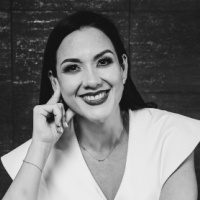
Marliz Marie Bermúdez Richard inició su carrera en la industria marítima en 2003 como cadete en buques de Marina Mercante, obteniendo una licencia de segundo oficial de cubierta. Desde entonces, ha ocupado puestos estratégicos en Latino América tanto en el área operacional de navieras como en terminales portuarias.
Fungió como Directora Comercial de APM Terminals Lázaro Cárdenas, donde tuvo el gran reto de inaugurar la primera terminal semiautomatizada con la infraestructura más moderna para México y Latinoamérica en la que se invirtieron 900 millones de dólares, en un proyecto único para el Sistema Portuario Mexicano.
En el 2019, ocupa el cargo de Directora Comercial de Terminales para América Latina en el cliente, lo que le permitió fortalecer los cimientos de la función comercial, para consolidarla como una verdadera comunidad regional, lo que le permitió construir servicios de valor agregado bajo una estrategia del modelo integrador en colaboración conjunta para Latinoamérica, como punto de referencia para la cartera global.
Actualmente, Marliz ocupa la Dirección General de APM Terminals México, posición que le permitirá fortalecer la estrategia del grupo bajo un modelo integrador y con enfoque en una cultura focalizada en el cliente.
Marliz asistió a la United States Merchant Marine Academy donde se especializó en Logística y Transporte Intermodal. Tiene una maestría de la Universidad de Plymouth, Inglaterra en Supply Chain Management y cursó exitosamente el Programa Ejecutivo en Negociación en la Universidad de Harvard, es miembro en WISTA y da conferencias sobre el empoderamiento de las mujeres dentro de la industria.
Marliz está casada con Jorge y tiene dos hijos, Jorge e Isabella. Le gusta pasar tiempo con su familia, jugar con sus hijos y leer. Connect with Marliz on LinkedIn.
